𝐀𝐥𝐥 𝐏𝐫𝐨𝐩𝐡𝐞𝐭𝐬 𝐁𝐞𝐟𝐨𝐫𝐞 𝐏𝐫𝐨𝐩𝐡𝐞𝐭 𝐉𝐞𝐬𝐮𝐬 𝐢𝐧𝐜𝐥𝐮𝐝𝐢𝐧𝐠 𝐡𝐢𝐦, 𝐩𝐫𝐞𝐚𝐜𝐡𝐞𝐝 𝐬𝐚𝐦𝐞 𝐦𝐞𝐬𝐬𝐚𝐠𝐞 𝐨𝐟 𝐈𝐬𝐥𝐚𝐦
Mohamad Mostafa Nassar
Twitter:@NassarMohamadMR
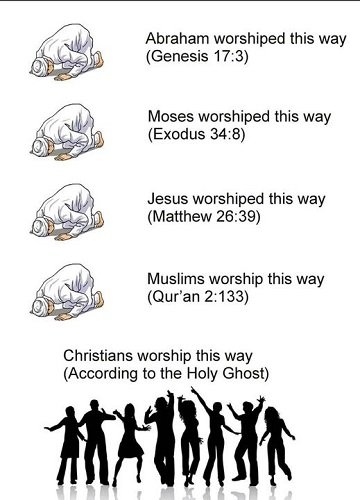
𝐓𝐡𝐞 𝐁𝐢𝐛𝐥𝐢𝐜𝐚𝐥 𝐋𝐢𝐞
“𝐍𝐨 𝐨𝐧𝐞 𝐜𝐨𝐦𝐞𝐬 𝐭𝐨 𝐆𝐨𝐝 𝐞𝐱𝐜𝐞𝐩𝐭 𝐭𝐡𝐫𝐨𝐮𝐠𝐡 𝐦𝐞.”
𝐖𝐞𝐥𝐥 𝐏𝐞𝐨𝐩𝐥𝐞/𝐒𝐢𝐧𝐧𝐞𝐫𝐬 𝐏𝐑𝐈𝐎𝐑 𝐭𝐨 𝐂𝐡𝐫𝐢𝐬𝐭 𝐮𝐬𝐞𝐝 𝐭𝐨 𝐜𝐨𝐦𝐞 𝐭𝐨 𝐆𝐨𝐝 𝐭𝐡𝐫𝐨𝐮𝐠𝐡 𝐭𝐡𝐞𝐢𝐫 𝐏𝐫𝐨𝐩𝐡𝐞𝐭𝐬.

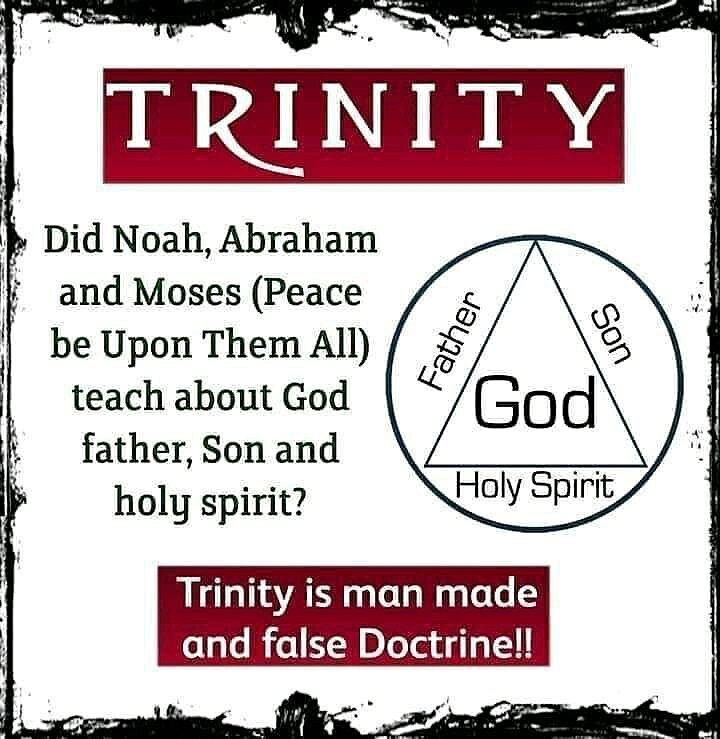
𝐆𝐨𝐝 𝐢𝐬 𝐏𝐞𝐫𝐟𝐞𝐜𝐭, 𝐚𝐥𝐥 𝐣𝐮𝐬𝐭𝐢𝐜𝐞, 𝐚𝐥𝐥-𝐤𝐧𝐨𝐰𝐢𝐧𝐠 𝐚𝐧𝐝 𝐰𝐡𝐞𝐧 𝐡𝐞 𝐬𝐞𝐧𝐭 𝐀𝐋𝐋 𝐏𝐫𝐨𝐩𝐡𝐞𝐭𝐬 𝐟𝐫𝐨𝐦 𝐀𝐝𝐚𝐦 𝐁𝐄𝐅𝐎𝐑𝐄 𝐏𝐫𝐨𝐩𝐡𝐞𝐭 𝐉𝐞𝐬𝐮𝐬 𝐀𝐋𝐋 𝐬𝐢𝐧𝐧𝐞𝐫𝐬 𝐡𝐚𝐝 𝐭𝐡𝐞 𝐬𝐨𝐥𝐮𝐭𝐢𝐨𝐧 𝐭𝐨 𝐫𝐞𝐩𝐞𝐧𝐭 𝐀𝐍𝐃 𝐭𝐡𝐞𝐢𝐫 𝐬𝐢𝐧𝐬 𝐰𝐞𝐫𝐞 𝐟𝐨𝐫𝐠𝐢𝐯𝐞𝐧 𝐛𝐲 𝐩𝐫𝐚𝐲𝐢𝐧𝐠 𝐝𝐢𝐫𝐞𝐜𝐭𝐥𝐲 𝐭𝐨 𝐆𝐨𝐝 𝐀𝐧𝐝 𝐭𝐢𝐦𝐞𝐬 𝐬𝐥𝐚𝐮𝐠𝐡𝐭𝐞𝐫 𝐚 𝐬𝐡𝐞𝐞𝐩 ( 𝐢𝐭 𝐢𝐬 𝐍𝐎𝐓 𝐚 𝐌𝐮𝐬𝐭)
𝐖𝐡𝐲 𝐝𝐢𝐝 𝐭𝐡𝐞 𝐬𝐚𝐦𝐞 𝐏𝐞𝐫𝐟𝐞𝐜𝐭 𝐚𝐥𝐥-𝐤𝐧𝐨𝐰𝐢𝐧𝐠 𝐚𝐥𝐥-𝐣𝐮𝐬𝐭 𝐆𝐨𝐝 𝐚𝐥𝐥 𝐨𝐟 𝐭𝐡𝐞 𝐬𝐮𝐝𝐝𝐞𝐧 𝐝𝐞𝐜𝐢𝐝𝐞 𝐭𝐨 𝐜𝐡𝐚𝐧𝐠𝐞 𝐭𝐡𝐢𝐬 𝐰𝐡𝐨𝐥𝐞 𝐬𝐭𝐚𝐧𝐝𝐚𝐫𝐝 𝐩𝐫𝐨𝐜𝐞𝐬𝐬 𝐀𝐍𝐃 𝐍𝐎 𝐩𝐫𝐞𝐯𝐢𝐨𝐮𝐬 𝐩𝐫𝐨𝐩𝐡𝐞𝐭 𝐭𝐨𝐥𝐝 𝐀𝐍𝐘𝐎𝐍𝐄 𝐭𝐡𝐚𝐭 𝐢𝐬 𝐩𝐫𝐨𝐜𝐞𝐬𝐬 𝐰𝐚𝐬 𝐠𝐨𝐢𝐧𝐠 𝐭𝐨 𝐜𝐡𝐚𝐧𝐠𝐞 𝐎𝐍𝐋𝐘 𝐭𝐡𝐞 𝐂𝐨𝐫𝐫𝐮𝐩𝐭𝐞𝐝 𝐂𝐡𝐫𝐢𝐬𝐭𝐢𝐚𝐧𝐢𝐭𝐲 𝐨𝐟 𝐏𝐚𝐮𝐥 𝐜𝐡𝐚𝐧𝐠𝐞𝐝 𝐭𝐡𝐚𝐭
𝐀𝐧𝐝 𝐭𝐡𝐚𝐭 𝐢𝐬 𝐰𝐡𝐲 𝐈𝐬𝐥𝐚𝐦 𝐰𝐚𝐬 𝐬𝐞𝐧𝐭 𝐭𝐨 𝐑𝐄𝐒𝐓𝐎𝐑𝐄 𝐭𝐡𝐞 𝐨𝐫𝐢𝐠𝐢𝐧𝐚𝐥 𝐦𝐞𝐭𝐡𝐨𝐝 𝐨𝐟 𝐰𝐨𝐫𝐬𝐡𝐢𝐩𝐢𝐧𝐠 𝐆𝐨𝐝 𝐀𝐋𝐎𝐍𝐄 𝐚𝐧𝐝 𝐩𝐫𝐚𝐲 𝐭𝐨 𝐡𝐢𝐦 𝐝𝐢𝐫𝐞𝐜𝐭𝐥𝐲 𝐚𝐧𝐝 𝐚𝐬𝐤 𝐟𝐨𝐫 𝐟𝐨𝐫𝐠𝐢𝐯𝐞𝐧𝐞𝐬𝐬 𝐝𝐢𝐫𝐞𝐜𝐭𝐥𝐲 𝐀𝐋𝐋 𝐩𝐫𝐞𝐯𝐢𝐨𝐮𝐬 𝐏𝐫𝐨𝐩𝐡𝐞𝐭𝐬 𝐩𝐫𝐞𝐝𝐢𝐜𝐭𝐞𝐝 𝐚 𝐜𝐡𝐚𝐧𝐠𝐞 𝐢𝐧 𝐭𝐡𝐞 𝐧𝐚𝐭𝐮𝐫𝐞 𝐨𝐟 𝐆𝐨𝐝 𝐭𝐨 𝐛𝐞 𝐭𝐫𝐢𝐧𝐢𝐭𝐲 𝐚𝐧𝐝 𝐡𝐞 𝐰𝐢𝐥𝐥 𝐡𝐚𝐯𝐞 𝐚 𝐬𝐨𝐧 𝐚𝐧𝐝 𝐍𝐎 𝐨𝐧𝐞 𝐰𝐢𝐥𝐥 𝐛𝐞 𝐚𝐜𝐜𝐞𝐩𝐭𝐞𝐝 𝐢𝐧 𝐭𝐡𝐞 𝐟𝐮𝐭𝐮𝐫𝐞 𝐮𝐧𝐥𝐞𝐬𝐬 𝐛𝐞𝐥𝐢𝐞𝐯𝐢𝐧𝐠 𝐢𝐧 𝐭𝐡𝐚𝐭 – 𝐚𝐧𝐬𝐰𝐞𝐫 𝐢𝐬 𝐍𝐎 𝐍𝐎 𝐍𝐎. 𝐀 𝐛𝐢𝐭 𝐨𝐟 𝐜𝐨𝐦𝐦𝐨𝐧 𝐬𝐞𝐧𝐬𝐞 𝐢𝐬 𝐚𝐥𝐥
𝐐𝐮𝐫𝐚𝐧 (𝟐𝟗:𝟒𝟔)
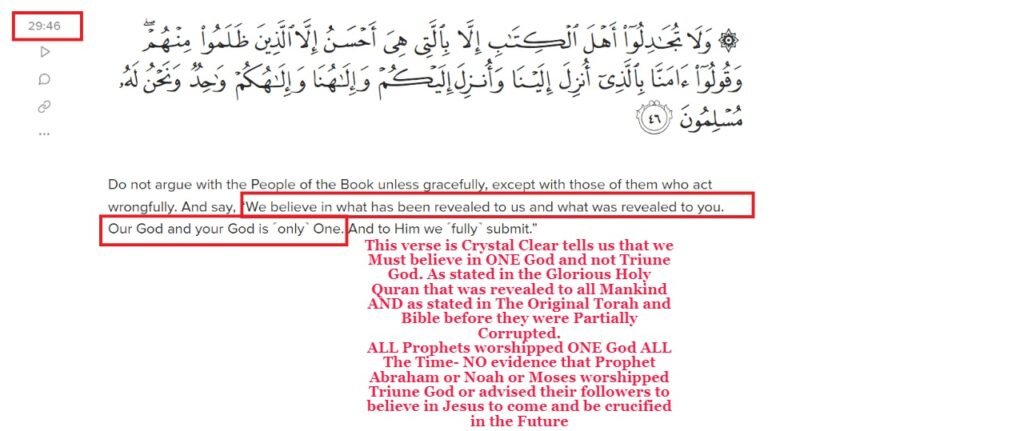
𝐈𝐬 𝐓𝐡𝐞 𝐛𝐞𝐥𝐢𝐞𝐟 𝐢𝐧 𝐉𝐞𝐬𝐮𝐬 𝐩𝐫𝐢𝐨𝐫 𝐭𝐨 𝐉𝐞𝐬𝐮𝐬 𝐚 𝐜𝐨𝐦𝐩𝐮𝐥𝐬𝐨𝐫𝐲 𝐫𝐞𝐪𝐮𝐢𝐫𝐞𝐦𝐞𝐧𝐭 𝐟𝐨𝐫 𝐅𝐨𝐫𝐠𝐢𝐯𝐞𝐧𝐞𝐬𝐬? 𝐈𝐟 𝐧𝐨𝐭 𝐰𝐡𝐲 𝐜𝐡𝐚𝐧𝐠𝐞 𝐚𝐟𝐭𝐞𝐫 𝐡𝐢𝐦?
𝐆𝐞𝐧𝐞𝐫𝐚𝐥𝐥𝐲, 𝐂𝐡𝐫𝐢𝐬𝐭𝐢𝐚𝐧𝐬 𝐚𝐫𝐠𝐮𝐞 𝐭𝐡𝐚𝐭 𝐨𝐧𝐞 𝐡𝐚𝐬 𝐭𝐨 𝐛𝐞𝐥𝐢𝐞𝐯𝐞 𝐢𝐧 𝐉𝐞𝐬𝐮𝐬 𝐭𝐨 𝐚𝐭𝐭𝐚𝐢𝐧 𝐬𝐚𝐥𝐯𝐚𝐭𝐢𝐨𝐧.
𝐇𝐨𝐰𝐞𝐯𝐞𝐫, 𝐢𝐟 𝐰𝐞 𝐫𝐞𝐚𝐝 𝐭𝐡𝐫𝐨𝐮𝐠𝐡 𝐭𝐡𝐞 𝐁𝐢𝐛𝐥𝐞, 𝐞𝐬𝐩𝐞𝐜𝐢𝐚𝐥𝐥𝐲 𝐭𝐡𝐞 𝐎𝐥𝐝 𝐓𝐞𝐬𝐭𝐚𝐦𝐞𝐧𝐭, 𝐭𝐡𝐢𝐬 𝐭𝐡𝐨𝐮𝐠𝐡𝐭 𝐝𝐨𝐞𝐬𝐧’𝐭 𝐬𝐞𝐞𝐦 𝐭𝐨 𝐞𝐱𝐢𝐬𝐭.
𝐅𝐢𝐫𝐬𝐭 𝐨𝐟 𝐚𝐥𝐥, 𝐭𝐡𝐞 𝐧𝐚𝐦𝐞 𝐉𝐞𝐬𝐮𝐬 𝐢𝐬𝐧’𝐭 𝐦𝐞𝐧𝐭𝐢𝐨𝐧𝐞𝐝 𝐨𝐧𝐞 𝐬𝐢𝐧𝐠𝐥𝐞 𝐭𝐢𝐦𝐞 𝐢𝐧 𝐭𝐡𝐞 𝐞𝐧𝐭𝐢𝐫𝐞 𝐎𝐥𝐝 𝐓𝐞𝐬𝐭𝐚𝐦𝐞𝐧𝐭, 𝐬𝐨 𝐧𝐨𝐧𝐞 𝐨𝐟 𝐭𝐡𝐞 𝐩𝐫𝐞𝐯𝐢𝐨𝐮𝐬 𝐩𝐫𝐨𝐩𝐡𝐞𝐭𝐬 𝐧𝐨𝐫 𝐭𝐡𝐞𝐢𝐫 𝐚𝐮𝐝𝐢𝐞𝐧𝐜𝐞𝐬 𝐰𝐨𝐮𝐥𝐝 𝐤𝐧𝐨𝐰 𝐚𝐧𝐲𝐭𝐡𝐢𝐧𝐠 𝐚𝐛𝐨𝐮𝐭 𝐉𝐞𝐬𝐮𝐬.
𝐒𝐞𝐜𝐨𝐧𝐝𝐥𝐲, 𝐭𝐡𝐞 𝐜𝐨𝐧𝐜𝐞𝐩𝐭 𝐨𝐟 𝐆𝐨𝐝 𝐰𝐚𝐬 𝐚𝐛𝐬𝐨𝐥𝐮𝐭𝐞𝐥𝐲 𝐜𝐫𝐲𝐬𝐭𝐚𝐥 𝐜𝐥𝐞𝐚𝐫 𝐭𝐨 𝐚𝐥𝐥 𝐩𝐫𝐞𝐯𝐢𝐨𝐮𝐬 𝐧𝐚𝐭𝐢𝐨𝐧𝐬. 𝐀𝐥𝐥 𝐭𝐡𝐞 𝐩𝐫𝐨𝐩𝐡𝐞𝐭𝐬 𝐟𝐫𝐨𝐦 𝐍𝐨𝐚𝐡 𝐭𝐨 𝐌𝐨𝐬𝐞𝐬 𝐭𝐚𝐮𝐠𝐡𝐭 𝐛𝐞𝐥𝐢𝐞𝐟 𝐢𝐧 𝐎𝐧𝐞 𝐆𝐨𝐝, 𝐭𝐡𝐞𝐲 𝐧𝐞𝐯𝐞𝐫 𝐠𝐚𝐯𝐞 𝐚𝐧𝐲 𝐢𝐦𝐩𝐫𝐞𝐬𝐬𝐢𝐨𝐧 𝐨𝐟 𝐚 𝐭𝐫𝐢𝐮𝐧𝐞 𝐆𝐨𝐝 𝐧𝐨𝐭 𝐚 𝐦𝐮𝐥𝐭𝐢-𝐩𝐞𝐫𝐬𝐨𝐧 𝐆𝐨𝐝 𝐰𝐡𝐚𝐭𝐬𝐨𝐞𝐯𝐞𝐫.
𝐅𝐢𝐧𝐚𝐥𝐥𝐲, 𝐭𝐡𝐞 𝐩𝐚𝐭𝐡𝐰𝐚𝐲 𝐭𝐨 𝐬𝐚𝐥𝐯𝐚𝐭𝐢𝐨𝐧 𝐰𝐚𝐬 𝐬𝐭𝐫𝐚𝐢𝐠𝐡𝐭 𝐚𝐧𝐝 𝐬𝐢𝐦𝐩𝐥𝐞 𝐝𝐮𝐫𝐢𝐧𝐠 𝐭𝐡𝐞 𝐭𝐢𝐦𝐞𝐬 𝐨𝐟 𝐞𝐚𝐜𝐡 𝐩𝐫𝐨𝐩𝐡𝐞𝐭.
𝐅𝐨𝐫 𝐞𝐱𝐚𝐦𝐩𝐥𝐞, 𝐭𝐡𝐨𝐬𝐞 𝐰𝐡𝐨 𝐥𝐢𝐯𝐞𝐝 𝐚𝐭 𝐭𝐡𝐞 𝐭𝐢𝐦𝐞 𝐨𝐟 𝐌𝐨𝐬𝐞𝐬 𝐡𝐚𝐝 𝐭𝐨 𝐛𝐞𝐥𝐢𝐞𝐯𝐞 𝐢𝐧 𝐎𝐧𝐞 𝐆𝐨𝐝 𝐚𝐧𝐝 𝐨𝐛𝐞𝐲 𝐭𝐡𝐞 𝐭𝐞𝐚𝐜𝐡𝐢𝐧𝐠𝐬 𝐨𝐟 𝐌𝐨𝐬𝐞𝐬. 𝐓𝐡𝐨𝐬𝐞 𝐰𝐡𝐨 𝐥𝐢𝐯𝐞𝐝 𝐚𝐭 𝐭𝐡𝐞 𝐭𝐢𝐦𝐞 𝐨𝐟 𝐃𝐚𝐯𝐢𝐝 𝐡𝐚𝐝 𝐭𝐨 𝐛𝐞𝐥𝐢𝐞𝐯𝐞 𝐢𝐧 𝐎𝐧𝐞 𝐆𝐨𝐝 𝐚𝐧𝐝 𝐨𝐛𝐞𝐲 𝐭𝐡𝐞 𝐭𝐞𝐚𝐜𝐡𝐢𝐧𝐠𝐬 𝐨𝐟 𝐭𝐡𝐞𝐢𝐫 𝐜𝐮𝐫𝐫𝐞𝐧𝐭 𝐩𝐫𝐨𝐩𝐡𝐞𝐭 𝐃𝐚𝐯𝐢𝐝. 𝐒𝐢𝐦𝐢𝐥𝐚𝐫𝐥𝐲 𝐚𝐭 𝐭𝐡𝐞 𝐭𝐢𝐦𝐞 𝐨𝐟 𝐙𝐞𝐜𝐡𝐚𝐫𝐢𝐚𝐡, 𝐛𝐞𝐥𝐢𝐞𝐟 𝐢𝐧 𝐎𝐧𝐞 𝐆𝐨𝐝 𝐚𝐧𝐝 𝐨𝐛𝐞𝐝𝐢𝐞𝐧𝐜𝐞 𝐭𝐨 𝐭𝐡𝐞 𝐭𝐞𝐚𝐜𝐡𝐢𝐧𝐠𝐬 𝐨𝐟 𝐭𝐡𝐞𝐢𝐫 𝐜𝐮𝐫𝐫𝐞𝐧𝐭 𝐩𝐫𝐨𝐩𝐡𝐞𝐭 𝐙𝐞𝐜𝐡𝐚𝐫𝐢𝐚𝐡.
𝐘𝐞𝐬, 𝐰𝐞 𝐚𝐠𝐫𝐞𝐞 𝐭𝐡𝐨𝐬𝐞 𝐰𝐡𝐨 𝐥𝐢𝐯𝐞𝐝 𝐭𝐡𝐞 𝐭𝐢𝐦𝐞 𝐨𝐟 𝐉𝐞𝐬𝐮𝐬, 𝐦𝐮𝐬𝐭 𝐛𝐞𝐥𝐢𝐞𝐯𝐞 𝐢𝐧 𝐎𝐧𝐞 𝐆𝐨𝐝 𝐚𝐧𝐝 𝐟𝐨𝐥𝐥𝐨𝐰 𝐭𝐡𝐞 𝐭𝐞𝐚𝐜𝐡𝐢𝐧𝐠𝐬 𝐨𝐟 𝐉𝐞𝐬𝐮𝐬 𝐛𝐮𝐭 𝐭𝐡𝐨𝐬𝐞 𝐰𝐡𝐨 𝐩𝐫𝐞𝐜𝐞𝐝𝐞𝐝 𝐡𝐢𝐦 𝐧𝐞𝐯𝐞𝐫 𝐡𝐚𝐝 𝐭𝐨 𝐤𝐧𝐨𝐰 𝐨𝐫 𝐡𝐚𝐯𝐞 𝐛𝐞𝐥𝐢𝐞𝐟 𝐢𝐧 𝐉𝐞𝐬𝐮𝐬.
𝐒𝐢𝐧𝐬 𝐰𝐞𝐫𝐞 𝐟𝐨𝐫𝐠𝐢𝐯𝐞𝐧 𝐁𝐄𝐅𝐎𝐑𝐄 𝐉𝐄𝐒𝐔𝐒
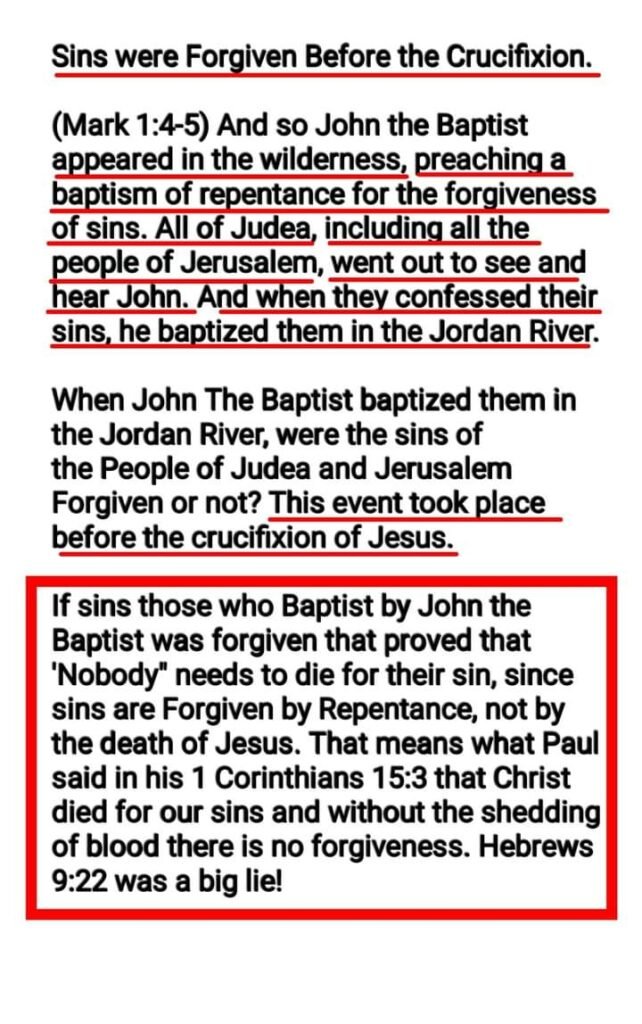
𝐓𝐡𝐞𝐬𝐞 𝐚𝐫𝐞 𝐭𝐡𝐞 𝐟𝐢𝐯𝐞 𝐫𝐞𝐚𝐬𝐨𝐧𝐬 𝐰𝐡𝐲 𝐭𝐡𝐞 𝐛𝐥𝐨𝐨𝐝 𝐢𝐬𝐬𝐮𝐞 𝐢𝐬 𝐚 𝐟𝐚𝐥𝐥𝐚𝐜𝐲:
𝐇𝐈𝐭’𝐬 𝐨𝐧𝐥𝐲 𝐢𝐧 𝐂𝐡𝐫𝐢𝐬𝐭𝐢𝐚𝐧𝐢𝐭𝐲 𝐭𝐡𝐚𝐭 𝐚 𝐠𝐨𝐝 𝐰𝐢𝐥𝐥 𝐩𝐫𝐚𝐲 𝐭𝐨 𝐚𝐧𝐨𝐭𝐡𝐞𝐫 𝐠𝐨𝐝
𝐖𝐞 𝐤𝐧𝐨𝐰 𝐭𝐡𝐚𝐭 𝐚𝐥𝐥 𝐂𝐡𝐫𝐢𝐬𝐭𝐢𝐚𝐧𝐬 𝐚𝐫𝐞 𝐬𝐡𝐨𝐮𝐭𝐢𝐧𝐠 𝐭𝐡𝐞 𝐧𝐚𝐦𝐞 𝐨𝐟 𝐉𝐞𝐬𝐮𝐬 𝐝𝐮𝐫𝐢𝐧𝐠 𝐯𝐚𝐫𝐢𝐨𝐮𝐬 𝐬𝐢𝐭𝐮𝐚𝐭𝐢𝐨𝐧𝐬, 𝐚𝐧𝐝 𝐬𝐞𝐜𝐨𝐧𝐝𝐥𝐲, 𝐭𝐡𝐞𝐲 𝐛𝐞𝐥𝐢𝐞𝐯𝐞𝐝 𝐭𝐡𝐚𝐭 𝐭𝐡𝐞 𝐛𝐥𝐨𝐨𝐝 𝐨𝐟 𝐉𝐞𝐬𝐮𝐬 𝐰𝐢𝐥𝐥 𝐰𝐢𝐩𝐞 𝐨𝐮𝐭 𝐭𝐡𝐞 𝐬𝐢𝐧𝐬 𝐭𝐡𝐚𝐭 𝐭𝐡𝐞𝐲 𝐜𝐨𝐦𝐦𝐢𝐭𝐭𝐞𝐝.
𝐓𝐡𝐞𝐬𝐞 𝐚𝐫𝐞 𝐭𝐡𝐞 𝐟𝐢𝐯𝐞 𝐫𝐞𝐚𝐬𝐨𝐧𝐬 𝐰𝐡𝐲 𝐭𝐡𝐞 𝐢𝐬𝐬𝐮𝐞 𝐨𝐟 𝐉𝐞𝐬𝐮𝐬 𝐛𝐥𝐨𝐨𝐝 𝐢𝐬 𝐚 𝐟𝐢𝐜𝐭𝐢𝐭𝐢𝐨𝐮𝐬 𝐬𝐭𝐨𝐫𝐲 𝐛𝐲 𝐟𝐚𝐥𝐬𝐞 𝐬𝐜𝐫𝐢𝐛𝐞𝐬.
𝐂𝐡𝐫𝐢𝐬𝐭𝐢𝐚𝐧𝐬 𝐜𝐥𝐚𝐢𝐦 𝐭𝐡𝐚𝐭 𝐢𝐭’𝐬 𝐭𝐡𝐞 𝐛𝐥𝐨𝐨𝐝 𝐨𝐟 𝐉𝐞𝐬𝐮𝐬 𝐭𝐡𝐚𝐭 𝐰𝐢𝐥𝐥 𝐰𝐢𝐩𝐞 𝐨𝐮𝐭 𝐭𝐡𝐞𝐢𝐫 𝐬𝐢𝐧𝐬 𝐚𝐧𝐝 𝐭𝐡𝐚𝐭 𝐫𝐚𝐢𝐬𝐞𝐬 𝐬𝐨𝐦𝐞 𝐪𝐮𝐞𝐬𝐭𝐢𝐨𝐧𝐬:
𝟏. 𝐖𝐡𝐞𝐫𝐞 𝐝𝐢𝐝 𝐉𝐞𝐬𝐮𝐬 𝐬𝐚𝐲 ” 𝐈 𝐚𝐦 𝐜𝐨𝐦𝐢𝐧𝐠 𝐭𝐨 𝐝𝐢𝐞 𝐟𝐨𝐫 𝐲𝐨𝐮?
𝟐. 𝐖𝐡𝐞𝐫𝐞 𝐝𝐢𝐝 𝐉𝐞𝐬𝐮𝐬 𝐬𝐚𝐲 “𝐃𝐨 𝐧𝐨𝐭 𝐫𝐞𝐩𝐞𝐧𝐭 𝐮𝐧𝐭𝐢𝐥 𝐦𝐲 𝐛𝐥𝐨𝐨𝐝 𝐝𝐫𝐨𝐩 𝐟𝐨𝐫 𝐲𝐨𝐮𝐫 𝐬𝐢𝐧𝐬 𝐭𝐨 𝐛𝐞 𝐟𝐨𝐫𝐠𝐢𝐯𝐞𝐧?

𝐓𝐡𝐞𝐬𝐞 𝐚𝐫𝐞 𝐭𝐡𝐞 𝐟𝐢𝐯𝐞 𝐫𝐞𝐚𝐬𝐨𝐧𝐬 𝐰𝐡𝐲 𝐭𝐡𝐞 𝐛𝐥𝐨𝐨𝐝 𝐢𝐬𝐬𝐮𝐞 𝐢𝐬 𝐚 𝐟𝐚𝐥𝐥𝐚𝐜𝐲:
𝟏. 𝐄𝐳𝐞𝐤𝐢𝐞𝐥 𝟐𝟎:𝟏𝟖 𝐆𝐨𝐝 𝐀𝐥𝐦𝐢𝐠𝐡𝐭𝐲 𝐒𝐚𝐢𝐝”
𝐈𝐟 𝐚 𝐰𝐢𝐜𝐤𝐞𝐝 𝐩𝐞𝐫𝐬𝐨𝐧/ 𝐨𝐫 𝐚 𝐬𝐢𝐧𝐟𝐮𝐥 𝐩𝐞𝐫𝐬𝐨𝐧 𝐜𝐨𝐦𝐞 𝐭𝐨 𝐦𝐞 𝐚𝐧𝐝 𝐬𝐞𝐞𝐤 𝐟𝐨𝐫 𝐦𝐲 𝐟𝐨𝐫𝐠𝐢𝐯𝐞𝐧𝐞𝐬𝐬 𝐚𝐧𝐝 𝐤𝐞𝐞𝐩 𝐚𝐥𝐥 𝐦𝐲 𝐥𝐚𝐰𝐬 𝐡𝐢𝐬 𝐬𝐢𝐧𝐬 𝐰𝐢𝐥𝐥 𝐛𝐞 𝐟𝐨𝐫𝐠𝐢𝐯𝐞𝐧.
𝐓𝐡𝐢𝐬 𝐜𝐨𝐧𝐭𝐞𝐱𝐭 𝐧𝐨𝐰 𝐢𝐬 𝐭𝐞𝐥𝐥𝐢𝐧𝐠 𝐲𝐨𝐮 𝐭𝐡𝐚𝐭 𝐲𝐨𝐮 𝐝𝐨𝐧’𝐭 𝐡𝐚𝐯𝐞 𝐭𝐨 𝐰𝐚𝐢𝐭 𝐟𝐨𝐫 𝐚𝐧𝐲 𝐛𝐥𝐨𝐨𝐝 𝐢𝐟 𝐲𝐨𝐮 𝐰𝐚𝐧𝐭 𝐭𝐨 𝐛𝐞 𝐟𝐨𝐫𝐠𝐢𝐯𝐞𝐧 𝐤𝐢𝐧𝐝𝐥𝐲 𝐬𝐞𝐞𝐤 𝐭𝐡𝐞 𝐟𝐨𝐫𝐠𝐢𝐯𝐞𝐧𝐞𝐬𝐬 𝐨𝐟 𝐲𝐨𝐮𝐫 𝐋𝐨𝐫𝐝 𝐚𝐧𝐝 𝐚𝐛𝐢𝐝𝐞 𝐛𝐲 𝐡𝐢𝐬 𝐥𝐚𝐰𝐬.
𝟐. 𝐉𝐞𝐫𝐞𝐦𝐢𝐚𝐡 𝟑𝟑:𝟑 𝐓𝐡𝐞 𝐋𝐨𝐫𝐝 𝐬𝐚𝐢𝐝 𝐭𝐨 𝐉𝐞𝐫𝐞𝐦𝐢𝐚𝐡 𝐜𝐚𝐥𝐥 𝐮𝐧𝐭𝐨 𝐦𝐞 𝐈 𝐰𝐢𝐥𝐥 𝐡𝐞𝐚𝐫 𝐲𝐨𝐮.
𝟑. 𝐈𝐬𝐚𝐢𝐚𝐡 𝟔𝟓:𝟐𝟒 𝐓𝐡𝐞 𝐋𝐨𝐫𝐝 𝐬𝐚𝐢𝐝 ” 𝐄𝐯𝐞𝐧 𝐛𝐞𝐟𝐨𝐫𝐞 𝐲𝐨𝐮 𝐜𝐚𝐥𝐥 𝐦𝐞, 𝐈 𝐰𝐢𝐥𝐥 𝐡𝐞𝐚𝐫 𝐲𝐨𝐮 𝐚𝐧𝐝 𝐢𝐟 𝐲𝐨𝐮 𝐜𝐚𝐥𝐥 𝐦𝐞, 𝐈 𝐰𝐢𝐥𝐥 𝐥𝐢𝐬𝐭𝐞𝐧 𝐭𝐨 𝐲𝐨𝐮.
𝟒. 𝐉𝐞𝐬𝐮𝐬 𝐬𝐚𝐢𝐝 ” 𝐀𝐬𝐤 𝐲𝐨𝐮 𝐬𝐡𝐚𝐥𝐥 𝐛𝐞 𝐠𝐢𝐯𝐞𝐧, 𝐬𝐞𝐞𝐤 𝐲𝐨𝐮 𝐬𝐡𝐚𝐥𝐥 𝐟𝐢𝐧𝐝, 𝐤𝐧𝐨𝐜𝐤 𝐭𝐡𝐞 𝐝𝐨𝐨𝐫 𝐰𝐢𝐥𝐥 𝐨𝐩𝐞𝐧.
𝟓. 𝟏𝐉𝐨𝐡𝐧 𝟏:𝟗𝐓𝐡𝐞 𝐁𝐢𝐛𝐥𝐞 𝐬𝐚𝐢𝐝 𝐢𝐟 𝐰𝐞 𝐚𝐬𝐤 𝐆𝐨𝐝 𝐟𝐨𝐫 𝐟𝐨𝐫𝐠𝐢𝐯𝐞𝐧𝐞𝐬𝐬 𝐨𝐮𝐫 𝐬𝐢𝐧𝐬 𝐰𝐢𝐥𝐥 𝐛𝐞 𝐟𝐨𝐫𝐠𝐢𝐯𝐞𝐧.
𝐓𝐡𝐞 𝐚𝐛𝐨𝐯𝐞-𝐦𝐞𝐧𝐭𝐢𝐨𝐧𝐞𝐝 𝐁𝐢𝐛𝐥𝐢𝐜𝐚𝐥 𝐯𝐞𝐫𝐬𝐞 𝐢𝐬 𝐭𝐞𝐥𝐥𝐢𝐧𝐠 𝐮𝐬 𝐭𝐡𝐚𝐭 𝐢𝐟 𝐰𝐞 𝐬𝐢𝐧, 𝐰𝐞 𝐡𝐚𝐯𝐞 𝐭𝐨 𝐚𝐬𝐤 𝐆𝐨𝐝 𝐟𝐨𝐫 𝐟𝐨𝐫𝐠𝐢𝐯𝐞𝐧𝐞𝐬𝐬 𝐧𝐨𝐭 𝐰𝐚𝐢𝐭 𝐟𝐨𝐫 𝐭𝐡𝐞 𝐛𝐥𝐨𝐨𝐝 𝐨𝐟 𝐉𝐞𝐬𝐮𝐬.
𝐌𝐚𝐭𝐭𝐡𝐞𝐰 𝟒:𝟏𝟕 𝐉𝐞𝐬𝐮𝐬 𝐝𝐢𝐝 𝐧𝐨𝐭 𝐰𝐚𝐢𝐭 𝐟𝐨𝐫 𝐡𝐢𝐬 𝐛𝐥𝐨𝐨𝐝 𝐰𝐡𝐞𝐧 𝐡𝐞 𝐰𝐚𝐬 𝐚𝐬𝐤𝐢𝐧𝐠 𝐩𝐞𝐨𝐩𝐥𝐞 𝐭𝐨 𝐫𝐞𝐩𝐞𝐧𝐭 𝐟𝐨𝐫 𝐭𝐡𝐞 𝐤𝐢𝐧𝐠𝐝𝐨𝐦 𝐨𝐟 𝐆𝐨𝐝 𝐢𝐬 𝐧𝐞𝐚𝐫.
𝐌𝐨𝐬𝐞𝐬 𝐝𝐢𝐝 𝐧𝐨𝐭 𝐦𝐚𝐤𝐞 𝐮𝐬𝐞 𝐨𝐟 𝐭𝐡𝐞 𝐛𝐥𝐨𝐨𝐝 𝐨𝐟 𝐉𝐞𝐬𝐮𝐬 𝐨𝐫 𝐡𝐢𝐬 𝐟𝐨𝐥𝐥𝐨𝐰𝐞𝐫𝐬. 𝐀𝐛𝐫𝐚𝐡𝐚𝐦 𝐝𝐢𝐝 𝐧𝐨𝐭 𝐮𝐬𝐞 𝐭𝐡𝐞 𝐛𝐥𝐨𝐨𝐝 𝐨𝐟 𝐉𝐞𝐬𝐮𝐬 𝐨𝐫 𝐡𝐢𝐬 𝐟𝐨𝐥𝐥𝐨𝐰𝐞𝐫𝐬. 𝐉𝐞𝐬𝐮𝐬 𝐡𝐢𝐦𝐬𝐞𝐥𝐟 𝐦𝐚𝐤𝐞 𝐧𝐨 𝐮𝐬𝐞 𝐨𝐟 𝐡𝐢𝐬 𝐛𝐥𝐨𝐨𝐝 𝐧𝐨𝐫 𝐝𝐢𝐝 𝐚𝐧𝐲 𝐨𝐟 𝐡𝐢𝐬 𝐝𝐢𝐬𝐜𝐢𝐩𝐥𝐞𝐬 𝐦𝐚𝐤𝐞 𝐮𝐬𝐞 𝐨𝐟 𝐭𝐡𝐞 𝐛𝐥𝐨𝐨𝐝 𝐨𝐟 𝐉𝐞𝐬𝐮𝐬.
𝐈𝐭 𝐢𝐬 𝐛𝐞𝐬𝐭 𝐟𝐨𝐫 𝐂𝐡𝐫𝐢𝐬𝐭𝐢𝐚𝐧𝐬 𝐭𝐨 𝐟𝐨𝐜𝐮𝐬 𝐨𝐧 𝐚𝐬𝐤𝐢𝐧𝐠 𝐆𝐨𝐝 𝐟𝐨𝐫 𝐟𝐨𝐫𝐠𝐢𝐯𝐞𝐧𝐞𝐬𝐬, 𝐄𝐯𝐞𝐧 𝐭𝐡𝐨𝐮𝐠𝐡 𝐭𝐡𝐞𝐲 𝐚𝐬𝐤 𝐆𝐨𝐝 𝐭𝐡𝐞𝐢𝐫 𝐬𝐢𝐧𝐬 𝐰𝐨𝐧’𝐭 𝐛𝐞 𝐟𝐨𝐫𝐠𝐢𝐯𝐞𝐧 𝐛𝐞𝐜𝐚𝐮𝐬𝐞 𝐚𝐜𝐜𝐨𝐫𝐝𝐢𝐧𝐠 𝐭𝐨 𝐄𝐳𝐞𝐤𝐢𝐞𝐥 𝟏𝟖:𝟐𝟎, 𝐲𝐨𝐮 𝐰𝐨𝐫𝐬𝐡𝐢𝐩 𝐆𝐨𝐝 𝐚𝐥𝐨𝐧𝐞 𝐚𝐧𝐝 𝐤𝐞𝐞𝐩 𝐡𝐢𝐬 𝐜𝐨𝐦𝐦𝐚𝐧𝐝𝐦𝐞𝐧𝐭𝐬 𝐛𝐞𝐟𝐨𝐫𝐞 𝐲𝐨𝐮𝐫 𝐬𝐢𝐧𝐬 𝐰𝐢𝐥𝐥 𝐛𝐞 𝐟𝐨𝐫𝐠𝐢𝐯𝐞𝐧.
𝐂𝐨𝐧𝐜𝐥𝐮𝐬𝐢𝐨𝐧:
𝐓𝐡𝐞𝐫𝐞 𝐰𝐚𝐬 𝐧𝐨 𝐜𝐨𝐧𝐜𝐞𝐩𝐭 𝐨𝐟 𝐉𝐞𝐬𝐮𝐬 𝐤𝐧𝐨𝐰𝐧 𝐨𝐫 𝐭𝐚𝐮𝐠𝐡𝐭 𝐨𝐫 𝐩𝐫𝐞𝐬𝐮𝐦𝐞𝐝 𝐨𝐫 𝐩𝐫𝐞𝐚𝐜𝐡𝐞𝐝 𝐩𝐫𝐢𝐨𝐫 𝐭𝐨 𝐉𝐞𝐬𝐮𝐬 𝐲𝐞𝐭 𝐚𝐥𝐥 𝐩𝐞𝐨𝐩𝐥𝐞 𝐡𝐚𝐝 𝐭𝐡𝐞𝐢𝐫 𝐩𝐚𝐭𝐡𝐰𝐚𝐲 𝐭𝐨 𝐬𝐚𝐥𝐯𝐚𝐭𝐢𝐨𝐧 𝐭𝐡𝐫𝐨𝐮𝐠𝐡 𝐭𝐡𝐞𝐢𝐫 𝐨𝐰𝐧 𝐩𝐫𝐨𝐩𝐡𝐞𝐭𝐬.
𝐓𝐡𝐞 𝐇𝐞𝐛𝐫𝐞𝐰 𝐁𝐢𝐛𝐥𝐞 / 𝐎𝐥𝐝 𝐓𝐞𝐬𝐭𝐚𝐦𝐞𝐧𝐭 𝐍𝐄𝐕𝐄𝐑 𝐦𝐞𝐧𝐭𝐢𝐨𝐧𝐬 𝐉𝐞𝐬𝐮𝐬 𝐨𝐟 𝐍𝐚𝐳𝐚𝐫𝐞𝐭𝐡. 𝐕𝐚𝐫𝐢𝐨𝐮𝐬 𝐭𝐞𝐱𝐭𝐬 𝐰𝐢𝐭𝐡𝐢𝐧 𝐭𝐡𝐨𝐬𝐞 𝐰𝐫𝐢𝐭𝐢𝐧𝐠𝐬 𝐝𝐨 𝐦𝐞𝐧𝐭𝐢𝐨𝐧 𝐚 𝐦𝐞𝐬𝐬𝐢𝐚𝐡/𝐚𝐧𝐨𝐢𝐧𝐭𝐞𝐝 𝐬𝐨𝐧 𝐨𝐟 𝐃𝐚𝐯𝐢𝐝, 𝐡𝐞𝐢𝐫 𝐭𝐨 𝐭𝐡𝐞 𝐭𝐡𝐫𝐨𝐧𝐞 𝐢𝐧 𝐉𝐞𝐫𝐮𝐬𝐚𝐥𝐞𝐦 𝐚𝐧𝐝, 𝐢𝐧 𝐬𝐨𝐦𝐞 𝐰𝐚𝐲, 𝐆𝐨𝐝’𝐬 𝐬𝐨𝐧. 𝐓𝐡𝐞𝐬𝐞 𝐚𝐧𝐝 𝐨𝐭𝐡𝐞𝐫 𝐭𝐞𝐱𝐭𝐬 𝐰𝐞𝐫𝐞 𝐭𝐚𝐤𝐞𝐧 𝐭𝐨 𝐚𝐩𝐩𝐥𝐲 𝐭𝐨 𝐉𝐞𝐬𝐮𝐬 𝐛𝐲 𝐡𝐢𝐬 𝐟𝐨𝐥𝐥𝐨𝐰𝐞𝐫𝐬.
𝐍𝐨 𝐨𝐧𝐞 𝐰𝐫𝐢𝐭𝐢𝐧𝐠 𝐭𝐡𝐨𝐬𝐞 𝐭𝐡𝐢𝐧𝐠𝐬 𝐰𝐚𝐬 𝐭𝐡𝐢𝐧𝐤𝐢𝐧𝐠, “𝐈’𝐦 𝐰𝐫𝐢𝐭𝐢𝐧𝐠 𝐭𝐡𝐢𝐬 𝐚𝐛𝐨𝐮𝐭 𝐉𝐞𝐬𝐮𝐬 𝐨𝐟 𝐍𝐚𝐳𝐚𝐫𝐞𝐭𝐡 𝐰𝐡𝐨 𝐰𝐢𝐥𝐥 𝐥𝐢𝐯𝐞 𝐡𝐮𝐧𝐝𝐫𝐞𝐝𝐬 𝐨𝐟 𝐲𝐞𝐚𝐫𝐬 𝐢𝐧 𝐭𝐡𝐞 𝐟𝐮𝐭𝐮𝐫𝐞” 𝐨𝐫 “𝐈’𝐦 𝐰𝐫𝐢𝐭𝐢𝐧𝐠 𝐭𝐡𝐢𝐬 𝐚𝐛𝐨𝐮𝐭 𝐬𝐨𝐦𝐞𝐨𝐧𝐞 𝐚𝐥𝐢𝐯𝐞 𝐧𝐨𝐰 𝐛𝐮𝐭 𝐦𝐨𝐫𝐞 𝐢𝐦𝐩𝐨𝐫𝐭𝐚𝐧𝐭𝐥𝐲 𝐚𝐛𝐨𝐮𝐭 𝐬𝐨𝐦𝐞𝐨𝐧𝐞 𝐢𝐧 𝐭𝐡𝐞 𝐝𝐢𝐬𝐭𝐚𝐧𝐭 𝐟𝐮𝐭𝐮𝐫𝐞”.
𝐒𝐞𝐞 𝐉𝐨𝐡𝐧 𝐉. 𝐂𝐨𝐥𝐥𝐢𝐧𝐬 𝐚𝐧𝐝 𝐀𝐝𝐞𝐥𝐚 𝐘𝐚𝐫𝐛𝐫𝐨 𝐂𝐨𝐥𝐥𝐢𝐧𝐬, 𝐊𝐢𝐧𝐠, 𝐚𝐧𝐝 𝐌𝐞𝐬𝐬𝐢𝐚𝐡 𝐚𝐬 𝐒𝐨𝐧 𝐨𝐟 𝐆𝐨𝐝 ( 𝐰𝐨𝐫𝐝 𝐬𝐨𝐧 𝐢𝐧 𝐭𝐡𝐞 𝐨𝐫𝐢𝐠𝐢𝐧𝐚𝐥 𝐀𝐫𝐚𝐦𝐚𝐢𝐜𝐦𝐞𝐚𝐧𝐭 𝐒𝐥𝐚𝐯𝐞 𝐨𝐫 𝐒𝐞𝐫𝐯𝐚𝐧𝐭 𝐁𝐮𝐭 𝐆𝐫𝐞𝐞𝐤 𝐭𝐫𝐚𝐧𝐬𝐥𝐚𝐭𝐨𝐫𝐬 𝐦𝐚𝐝𝐞 𝐢𝐭 𝐒𝐨𝐧: 𝐃𝐢𝐯𝐢𝐧𝐞, 𝐇𝐮𝐦𝐚𝐧, 𝐚𝐧𝐝 𝐀𝐧𝐠𝐞𝐥𝐢𝐜 𝐌𝐞𝐬𝐬𝐢𝐚𝐧𝐢𝐜 𝐅𝐢𝐠𝐮𝐫𝐞𝐬 𝐢𝐧 𝐁𝐢𝐛𝐥𝐢𝐜𝐚𝐥 𝐚𝐧𝐝 𝐑𝐞𝐥𝐚𝐭𝐞𝐝 𝐋𝐢𝐭𝐞𝐫𝐚𝐭𝐮𝐫𝐞 (𝐄𝐞𝐫𝐝𝐦𝐚𝐧𝐬, 𝟐𝟎𝟎𝟖).
𝐎𝐥𝐝 𝐓𝐞𝐬𝐭𝐚𝐦𝐞𝐧𝐭 𝐝𝐢𝐝 𝐧𝐨𝐭 𝐩𝐫𝐞𝐝𝐢𝐜𝐭 𝐉𝐞𝐬𝐮𝐬 𝐚𝐬 𝐚 𝐆𝐨𝐝 𝐨𝐫 𝐬𝐨𝐧 𝐨𝐟 𝐆𝐨𝐝 𝐨𝐫 𝐒𝐚𝐯𝐢𝐨𝐫
𝐓𝐡𝐢𝐬 𝐲𝐞𝐚𝐫, 𝐥𝐢𝐤𝐞 𝐚𝐥𝐥 𝐭𝐡𝐞 𝐨𝐭𝐡𝐞𝐫𝐬, 𝐦𝐚𝐧𝐲 𝐡𝐚𝐯𝐞 𝐛𝐞𝐞𝐧 𝐜𝐞𝐥𝐞𝐛𝐫𝐚𝐭𝐢𝐧𝐠 𝐂𝐡𝐫𝐢𝐬𝐭𝐦𝐚𝐬. 𝐀𝐩𝐚𝐫𝐭 𝐟𝐫𝐨𝐦 𝐭𝐡𝐞 𝐨𝐛𝐯𝐢𝐨𝐮𝐬 𝐬𝐞𝐜𝐮𝐥𝐚𝐫𝐢𝐬𝐚𝐭𝐢𝐨𝐧 𝐨𝐟 𝐭𝐡𝐞 𝐞𝐯𝐞𝐧𝐭, 𝐦𝐚𝐧𝐲 𝐰𝐢𝐥𝐥 𝐚𝐜𝐭𝐮𝐚𝐥𝐥𝐲 𝐛𝐞 𝐜𝐞𝐥𝐞𝐛𝐫𝐚𝐭𝐢𝐧𝐠 𝐭𝐡𝐞 𝐛𝐢𝐫𝐭𝐡 𝐨𝐟 𝐉𝐞𝐬𝐮𝐬, 𝐰𝐡𝐨 𝐢𝐬 𝐬𝐮𝐩𝐩𝐨𝐬𝐞𝐝 𝐭𝐨 𝐛𝐞 𝐭𝐡𝐞 𝐂𝐡𝐫𝐢𝐬𝐭 𝐚𝐧𝐝 𝐬𝐚𝐯𝐢𝐨𝐫 𝐨𝐟 𝐭𝐡𝐞 𝐰𝐨𝐫𝐥𝐝. 𝐌𝐚𝐧𝐲 𝐨𝐟 𝐭𝐡𝐨𝐬𝐞 𝐰𝐡𝐨 𝐬𝐚𝐲 𝐭𝐡𝐚𝐭 𝐉𝐞𝐬𝐮𝐬 𝐢𝐬 𝐭𝐡𝐞 𝐬𝐚𝐯𝐢𝐨𝐫 𝐩𝐨𝐢𝐧𝐭 𝐭𝐨 𝐭𝐡𝐞 𝐬𝐮𝐩𝐩𝐨𝐬𝐞𝐝 𝐎𝐥𝐝 𝐓𝐞𝐬𝐭𝐚𝐦𝐞𝐧𝐭 𝐩𝐫𝐞𝐝𝐢𝐜𝐭𝐢𝐨𝐧𝐬 𝐭𝐡𝐚𝐭, 𝐭𝐡𝐞𝐲 𝐬𝐚𝐲, 𝐩𝐫𝐨𝐯𝐞𝐝 𝐭𝐡𝐚𝐭 𝐉𝐞𝐬𝐮𝐬 𝐢𝐬 𝐭𝐡𝐞 𝐬𝐚𝐯𝐢𝐨𝐫. 𝐇𝐨𝐰𝐞𝐯𝐞𝐫, 𝐚𝐧 𝐨𝐛𝐣𝐞𝐜𝐭𝐢𝐯𝐞 𝐥𝐨𝐨𝐤 𝐚𝐭 𝐭𝐡𝐞𝐬𝐞 𝐎𝐥𝐝 𝐓𝐞𝐬𝐭𝐚𝐦𝐞𝐧𝐭 𝐩𝐫𝐨𝐩𝐡𝐞𝐜𝐢𝐞𝐬 𝐰𝐢𝐥𝐥 𝐬𝐡𝐨𝐰 𝐭𝐡𝐚𝐭 𝐭𝐡𝐞𝐲 𝐧𝐞𝐯𝐞𝐫 𝐩𝐫𝐞𝐝𝐢𝐜𝐭𝐞𝐝 𝐉𝐞𝐬𝐮𝐬.
𝐏𝐞𝐫𝐡𝐚𝐩𝐬 𝐨𝐧𝐞 𝐨𝐟 𝐭𝐡𝐞 𝐦𝐨𝐬𝐭 𝐪𝐮𝐨𝐭𝐞𝐝 𝐬𝐞𝐜𝐭𝐢𝐨𝐧𝐬 𝐨𝐟 𝐭𝐡𝐞 𝐎𝐥𝐝 𝐓𝐞𝐬𝐭𝐚𝐦𝐞𝐧𝐭 𝐭𝐡𝐚𝐭 𝐰𝐞𝐫𝐞 𝐬𝐮𝐩𝐩𝐨𝐬𝐞𝐝 𝐭𝐨 𝐡𝐚𝐯𝐞 𝐩𝐫𝐞𝐝𝐢𝐜𝐭𝐞𝐝 𝐭𝐡𝐞 𝐜𝐨𝐦𝐢𝐧𝐠 𝐨𝐟 𝐉𝐞𝐬𝐮𝐬 𝐜𝐨𝐦𝐞𝐬 𝐟𝐫𝐨𝐦 𝐭𝐡𝐞 𝐛𝐨𝐨𝐤 𝐨𝐟 𝐈𝐬𝐚𝐢𝐚𝐡. 𝐈𝐧 𝐚𝐝𝐝𝐢𝐭𝐢𝐨𝐧 𝐭𝐨 𝐭𝐡𝐞 𝐦𝐢𝐬𝐢𝐧𝐭𝐞𝐫𝐩𝐫𝐞𝐭𝐚𝐭𝐢𝐨𝐧𝐬 (𝐝𝐞𝐥𝐢𝐛𝐞𝐫𝐚𝐭𝐞 𝐨𝐫 𝐧𝐨𝐭) 𝐨𝐟 𝐭𝐡𝐞 𝐩𝐚𝐬𝐬𝐚𝐠𝐞𝐬 𝐭𝐡𝐚𝐭 𝐡𝐚𝐯𝐞 𝐛𝐞𝐞𝐧 𝐜𝐫𝐞𝐝𝐢𝐭𝐞𝐝 𝐰𝐢𝐭𝐡 𝐩𝐫𝐞𝐝𝐢𝐜𝐭𝐢𝐧𝐠 𝐭𝐡𝐞 𝐜𝐨𝐦𝐢𝐧𝐠 𝐨𝐟 𝐉𝐞𝐬𝐮𝐬, 𝐨𝐭𝐡𝐞𝐫𝐬 𝐝𝐞𝐬𝐜𝐫𝐢𝐛𝐞 𝐰𝐡𝐚𝐭 𝐬𝐨𝐫𝐭 𝐨𝐟 𝐩𝐞𝐫𝐬𝐨𝐧 𝐉𝐞𝐬𝐮𝐬 𝐰𝐚𝐬 𝐬𝐮𝐩𝐩𝐨𝐬𝐞𝐝 𝐭𝐨 𝐡𝐚𝐯𝐞 𝐛𝐞𝐞𝐧 𝐢𝐠𝐧𝐨𝐫𝐞𝐝.
𝐈𝐬𝐚𝐢𝐚𝐡 𝐰𝐫𝐨𝐭𝐞 𝐪𝐮𝐢𝐭𝐞 𝐚 𝐥𝐨𝐧𝐠 𝐭𝐢𝐦𝐞 𝐛𝐞𝐟𝐨𝐫𝐞 𝐉𝐞𝐬𝐮𝐬 𝐰𝐚𝐬 𝐛𝐨𝐫𝐧. 𝐇𝐞 𝐩𝐫𝐞𝐝𝐢𝐜𝐭𝐞𝐝 𝐭𝐡𝐚𝐭 𝐭𝐡𝐞 𝐬𝐚𝐯𝐢𝐨𝐫 𝐰𝐨𝐮𝐥𝐝 𝐛𝐞 𝐛𝐨𝐫𝐧, 𝐧𝐨𝐭 𝐨𝐟 𝐚 𝐯𝐢𝐫𝐠𝐢𝐧, 𝐚𝐬 𝐬𝐨𝐦𝐞 𝐰𝐨𝐮𝐥𝐝 𝐰𝐚𝐧𝐭 𝐮𝐬 𝐭𝐨 𝐛𝐞𝐥𝐢𝐞𝐯𝐞, 𝐛𝐮𝐭 𝐨𝐟 𝐚 𝐲𝐨𝐮𝐧𝐠 𝐰𝐨𝐦𝐚𝐧. 𝐓𝐡𝐞 𝐟𝐚𝐜𝐭 𝐭𝐡𝐚𝐭 𝐦𝐨𝐬𝐭 𝐜𝐡𝐢𝐥𝐝𝐫𝐞𝐧 𝐰𝐞𝐫𝐞 𝐛𝐨𝐫𝐧 𝐨𝐟 𝐲𝐨𝐮𝐧𝐠 𝐰𝐨𝐦𝐞𝐧, 𝐛𝐨𝐭𝐡 𝐝𝐮𝐫𝐢𝐧𝐠 𝐈𝐬𝐚𝐢𝐚𝐡’𝐬 𝐚𝐧𝐝 𝐉𝐞𝐬𝐮𝐬’𝐬 𝐭𝐢𝐦𝐞 𝐬𝐡𝐨𝐮𝐥𝐝 𝐦𝐚𝐤𝐞 𝐭𝐡𝐢𝐬 𝐩𝐫𝐞𝐝𝐢𝐜𝐭𝐢𝐨𝐧 𝐮𝐧𝐬𝐩𝐞𝐜𝐭𝐚𝐜𝐮𝐥𝐚𝐫 – 𝐞𝐯𝐞𝐧 𝐥𝐚𝐮𝐠𝐡𝐚𝐛𝐥𝐞. 𝐒𝐨, 𝐭𝐨𝐨, 𝐰𝐚𝐬 𝐈𝐬𝐚𝐢𝐚𝐡’𝐬 𝐬𝐮𝐩𝐩𝐨𝐬𝐞𝐝 𝐩𝐫𝐞𝐝𝐢𝐜𝐭𝐢𝐨𝐧 𝐭𝐡𝐚𝐭 𝐉𝐞𝐬𝐮𝐬 𝐰𝐨𝐮𝐥𝐝 𝐡𝐚𝐯𝐞 𝐛𝐞𝐞𝐧 𝐛𝐨𝐫𝐧 𝐢𝐧 𝐁𝐞𝐭𝐡𝐥𝐞𝐡𝐞𝐦.
𝐓𝐡𝐞𝐧 𝐰𝐞 𝐚𝐫𝐞 𝐭𝐨𝐥𝐝 𝐭𝐡𝐚𝐭 𝐭𝐡𝐞 𝐬𝐚𝐯𝐢𝐨𝐫 𝐰𝐨𝐮𝐥𝐝 𝐡𝐚𝐯𝐞 𝐛𝐞𝐞𝐧 𝐜𝐚𝐥𝐥𝐞𝐝 “𝐈𝐦𝐦𝐚𝐧𝐮𝐞𝐥”. 𝐎𝐟 𝐜𝐨𝐮𝐫𝐬𝐞, 𝐭𝐡𝐞 𝐜𝐡𝐢𝐥𝐝 𝐰𝐚𝐬 𝐚𝐜𝐭𝐮𝐚𝐥𝐥𝐲 𝐧𝐚𝐦𝐞𝐝 “𝐉𝐞𝐬𝐮𝐬”. 𝐌𝐨𝐬𝐭 𝐨𝐟 𝐭𝐡𝐨𝐬𝐞 𝐰𝐡𝐨 𝐝𝐢𝐝 𝐞𝐯𝐞𝐧𝐭𝐮𝐚𝐥𝐥𝐲 𝐜𝐚𝐥𝐥 𝐉𝐞𝐬𝐮𝐬 “𝐈𝐦𝐦𝐚𝐧𝐮𝐞𝐥” 𝐜𝐚𝐦𝐞 𝐦𝐚𝐧𝐲 𝐲𝐞𝐚𝐫𝐬 𝐥𝐚𝐭𝐞𝐫, 𝐚𝐧𝐝 𝐭𝐡𝐞𝐲 𝐝𝐢𝐝 𝐬𝐨 𝐢𝐧 𝐚 𝐯𝐚𝐢𝐧 𝐚𝐭𝐭𝐞𝐦𝐩𝐭 𝐭𝐨 𝐟𝐮𝐥𝐟𝐢𝐥𝐥 𝐈𝐬𝐚𝐢𝐚𝐡’𝐬 𝐩𝐫𝐨𝐩𝐡𝐞𝐜𝐲.
𝐍𝐨𝐰, 𝐰𝐡𝐢𝐥𝐞 𝐈𝐬𝐚𝐢𝐚𝐡 𝐦𝐚𝐲 𝐡𝐚𝐯𝐞 𝐛𝐞𝐞𝐧 𝐬𝐚𝐲𝐢𝐧𝐠 𝐭𝐡𝐚𝐭 𝐡𝐞 𝐰𝐢𝐥𝐥 𝐬𝐮𝐟𝐟𝐞𝐫 𝐟𝐨𝐫 𝐨𝐮𝐫 𝐬𝐚𝐤𝐞, 𝐡𝐞 𝐚𝐥𝐬𝐨 𝐩𝐫𝐞𝐝𝐢𝐜𝐭𝐞𝐝 𝐭𝐡𝐚𝐭 𝐉𝐞𝐬𝐮𝐬 𝐰𝐨𝐮𝐥𝐝 𝐡𝐚𝐯𝐞 𝐥𝐢𝐯𝐞𝐝 𝐚 𝐥𝐨𝐧𝐠 𝐥𝐢𝐟𝐞, 𝐚𝐥𝐛𝐞𝐢𝐭 𝐬𝐢𝐜𝐤𝐥𝐲, 𝐚𝐧𝐝 𝐬𝐞𝐞𝐧 𝐡𝐢𝐬 𝐜𝐡𝐢𝐥𝐝𝐫𝐞𝐧. 𝐍𝐨𝐰, 𝐮𝐧𝐥𝐞𝐬𝐬 𝐈𝐬𝐚𝐢𝐚𝐡 𝐰𝐚𝐬 𝐭𝐚𝐥𝐤𝐢𝐧𝐠 𝐚𝐛𝐨𝐮𝐭 𝐚𝐧𝐨𝐭𝐡𝐞𝐫 𝐉𝐞𝐬𝐮𝐬, 𝐭𝐡𝐞 𝐨𝐧𝐞 𝐭𝐡𝐚𝐭 𝐂𝐡𝐫𝐢𝐬𝐭𝐢𝐚𝐧𝐬 𝐜𝐞𝐥𝐞𝐛𝐫𝐚𝐭𝐞 𝐞𝐚𝐜𝐡 𝐭𝐢𝐦𝐞 𝐭𝐡𝐢𝐬 𝐲𝐞𝐚𝐫 𝐜𝐨𝐮𝐥𝐝 𝐧𝐨𝐭 𝐡𝐚𝐯𝐞 𝐛𝐞𝐞𝐧 𝐭𝐡𝐞 𝐬𝐚𝐦𝐞 𝐨𝐧𝐞. 𝐅𝐨𝐫, 𝐢𝐧 𝐬𝐨 𝐟𝐚𝐫 𝐚𝐬 𝐞𝐯𝐞𝐫𝐲𝐭𝐡𝐢𝐧𝐠 𝐭𝐡𝐚𝐭 𝐰𝐞 𝐤𝐧𝐨𝐰 𝐚𝐛𝐨𝐮𝐭 𝐡𝐢𝐦, 𝐡𝐞 𝐥𝐢𝐯𝐞𝐝 𝐚 𝐯𝐞𝐫𝐲 𝐬𝐡𝐨𝐫𝐭 𝐥𝐢𝐟𝐞, 𝐰𝐚𝐬 𝐯𝐞𝐫𝐲 𝐡𝐞𝐚𝐥𝐭𝐡𝐲, 𝐚𝐧𝐝 𝐡𝐚𝐝 𝐧𝐨 𝐜𝐡𝐢𝐥𝐝𝐫𝐞𝐧.
𝐓𝐡𝐞𝐧 𝐭𝐡𝐞𝐫𝐞 𝐢𝐬 𝐭𝐡𝐞 𝐎𝐥𝐝 𝐓𝐞𝐬𝐭𝐚𝐦𝐞𝐧𝐭 𝐩𝐫𝐨𝐩𝐡𝐞𝐭 𝐌𝐢𝐜𝐚𝐡, 𝐰𝐡𝐨 𝐰𝐚𝐬 𝐬𝐮𝐩𝐩𝐨𝐬𝐞𝐝 𝐭𝐨 𝐩𝐫𝐞𝐝𝐢𝐜𝐭 𝐭𝐡𝐚𝐭 𝐭𝐡𝐞 𝐬𝐚𝐯𝐢𝐨𝐫 𝐉𝐞𝐬𝐮𝐬 𝐰𝐨𝐮𝐥𝐝 𝐡𝐚𝐯𝐞 𝐛𝐞𝐞𝐧 𝐛𝐨𝐫𝐧 𝐢𝐧 𝐁𝐞𝐭𝐡𝐥𝐞𝐡𝐞𝐦. 𝐒𝐩𝐞𝐚𝐤𝐢𝐧𝐠 𝐚𝐛𝐨𝐮𝐭 𝐭𝐡𝐢𝐬 𝐬𝐚𝐯𝐢𝐨𝐫, 𝐌𝐢𝐜𝐚𝐡 𝐚𝐥𝐬𝐨 𝐬𝐚𝐢𝐝 𝐭𝐡𝐚𝐭 𝐉𝐞𝐬𝐮𝐬 𝐰𝐚𝐬 𝐬𝐮𝐩𝐩𝐨𝐬𝐞𝐝 𝐭𝐨 𝐡𝐚𝐯𝐞 𝐬𝐚𝐯𝐞𝐝 𝐭𝐡𝐞 𝐇𝐞𝐛𝐫𝐞𝐰𝐬 𝐟𝐫𝐨𝐦 𝐭𝐡𝐞 𝐀𝐬𝐬𝐲𝐫𝐢𝐚𝐧𝐬. 𝐇𝐨𝐰𝐞𝐯𝐞𝐫, 𝐝𝐮𝐫𝐢𝐧𝐠 𝐉𝐞𝐬𝐮𝐬’𝐬 𝐭𝐢𝐦𝐞, 𝐢𝐭 𝐰𝐚𝐬 𝐭𝐡𝐞 𝐑𝐨𝐦𝐚𝐧𝐬 𝐰𝐡𝐨 𝐫𝐮𝐥𝐞𝐝 𝐏𝐚𝐥𝐞𝐬𝐭𝐢𝐧𝐞 𝐚𝐧𝐝 𝐉𝐞𝐬𝐮𝐬 𝐜𝐞𝐫𝐭𝐚𝐢𝐧𝐥𝐲 𝐝𝐢𝐝 𝐧𝐨𝐭 𝐝𝐨 𝐚𝐧𝐲 𝐬𝐨𝐫𝐭 𝐨𝐟 “𝐬𝐚𝐯𝐢𝐧𝐠” 𝐟𝐨𝐫 𝐭𝐡𝐞 𝐇𝐞𝐛𝐫𝐞𝐰𝐬 𝐟𝐫𝐨𝐦 𝐚𝐧𝐲 𝐟𝐨𝐫𝐞𝐢𝐠𝐧 𝐨𝐩𝐩𝐫𝐞𝐬𝐬𝐨𝐫.
𝐈𝐬𝐚𝐢𝐚𝐡 𝟕:𝟏𝟒, 𝐈𝐦𝐦𝐚𝐧𝐮𝐞𝐥: 𝐏𝐫𝐨𝐩𝐡𝐞𝐜𝐲 𝐨𝐟 𝐉𝐞𝐬𝐮𝐬?
𝐈𝐬𝐚𝐢𝐚𝐡 𝟕:𝟏𝟑-𝟏𝟔 𝐢𝐬 𝐚 𝐩𝐚𝐬𝐬𝐚𝐠𝐞 𝐭𝐡𝐚𝐭 𝐢𝐬 𝐪𝐮𝐨𝐭𝐞𝐝 𝐛𝐲 𝐓𝐫𝐢𝐧𝐢𝐭𝐚𝐫𝐢𝐚𝐧𝐬 𝐚 𝐥𝐨𝐭, 𝐭𝐡𝐞𝐲 𝐮𝐬𝐞 𝐢𝐭 𝐚𝐬 𝐞𝐯𝐢𝐝𝐞𝐧𝐜𝐞 𝐭𝐡𝐚𝐭 𝐢𝐭 𝐢𝐬 𝐚 𝐏𝐫𝐨𝐩𝐡𝐞𝐜𝐲 𝐨𝐟 𝐉𝐞𝐬𝐮𝐬 𝐜𝐨𝐦𝐢𝐧𝐠 𝐚𝐧𝐝 𝐭𝐡𝐚𝐭 𝐭𝐡𝐞 𝐜𝐡𝐢𝐥𝐝 𝐧𝐚𝐦𝐞𝐝 (𝐈𝐦𝐦𝐚𝐧𝐮𝐞𝐥) 𝐢𝐧 𝐭𝐡𝐞 𝐯𝐞𝐫𝐬𝐞 𝐢𝐬 “𝐃𝐢𝐯𝐢𝐧𝐞.” 𝐈𝐬 𝐭𝐡𝐞 𝐧𝐚𝐦𝐞 “𝐈𝐦𝐦𝐚𝐧𝐮𝐞𝐥” 𝐫𝐞𝐚𝐥𝐥𝐲 𝐚 𝐏𝐫𝐨𝐩𝐡𝐞𝐜𝐲 𝐨𝐟 𝐉𝐞𝐬𝐮𝐬 𝐚𝐧𝐝 𝐢𝐬 𝐭𝐡𝐞 𝐜𝐡𝐢𝐥𝐝 𝐃𝐢𝐯𝐢𝐧𝐞? 𝐖𝐞 𝐬𝐡𝐚𝐥𝐥 𝐟𝐢𝐧𝐝 𝐨𝐮𝐭 𝐚𝐬 𝐰𝐞 𝐫𝐞𝐚𝐝 𝐟𝐮𝐫𝐭𝐡𝐞𝐫.
𝐈𝐬𝐚𝐢𝐚𝐡 𝟕:𝟏𝟑-𝟏𝟔 (𝐍𝐈𝐕) 𝟏𝟑 𝐓𝐡𝐞𝐧 𝐈𝐬𝐚𝐢𝐚𝐡 𝐬𝐚𝐢𝐝, “𝐇𝐞𝐚𝐫 𝐧𝐨𝐰, 𝐲𝐨𝐮 𝐡𝐨𝐮𝐬𝐞 𝐨𝐟 𝐃𝐚𝐯𝐢𝐝! 𝐈𝐬 𝐢𝐭 𝐧𝐨𝐭 𝐞𝐧𝐨𝐮𝐠𝐡 𝐭𝐨 𝐭𝐫𝐲 𝐭𝐡𝐞 𝐩𝐚𝐭𝐢𝐞𝐧𝐜𝐞 𝐨𝐟 𝐡𝐮𝐦𝐚𝐧𝐬? 𝐖𝐢𝐥𝐥 𝐲𝐨𝐮 𝐭𝐫𝐲 𝐭𝐡𝐞 𝐩𝐚𝐭𝐢𝐞𝐧𝐜𝐞 𝐨𝐟 𝐦𝐲 𝐆𝐨𝐝 𝐚𝐥𝐬𝐨? 𝟏𝟒 𝐓𝐡𝐞𝐫𝐞𝐟𝐨𝐫𝐞 𝐭𝐡𝐞 𝐋𝐨𝐫𝐝 𝐡𝐢𝐦𝐬𝐞𝐥𝐟 𝐰𝐢𝐥𝐥 𝐠𝐢𝐯𝐞 𝐲𝐨𝐮 𝐚 𝐬𝐢𝐠𝐧: 𝐓𝐡𝐞 𝐯𝐢𝐫𝐠𝐢𝐧 𝐰𝐢𝐥𝐥 𝐜𝐨𝐧𝐜𝐞𝐢𝐯𝐞 𝐚𝐧𝐝 𝐠𝐢𝐯𝐞 𝐛𝐢𝐫𝐭𝐡 𝐭𝐨 𝐚 𝐬𝐨𝐧 𝐚𝐧𝐝 𝐰𝐢𝐥𝐥 𝐜𝐚𝐥𝐥 𝐡𝐢𝐦 𝐈𝐦𝐦𝐚𝐧𝐮𝐞𝐥. 𝟏𝟓 𝐇𝐞 𝐰𝐢𝐥𝐥 𝐛𝐞 𝐞𝐚𝐭𝐢𝐧𝐠 𝐜𝐮𝐫𝐝𝐬 𝐚𝐧𝐝 𝐡𝐨𝐧𝐞𝐲 𝐰𝐡𝐞𝐧 𝐡𝐞 𝐤𝐧𝐨𝐰𝐬 𝐞𝐧𝐨𝐮𝐠𝐡 𝐭𝐨 𝐫𝐞𝐣𝐞𝐜𝐭 𝐭𝐡𝐞 𝐰𝐫𝐨𝐧𝐠 𝐚𝐧𝐝 𝐜𝐡𝐨𝐨𝐬𝐞 𝐭𝐡𝐞 𝐫𝐢𝐠𝐡𝐭, 𝟏𝟔 𝐟𝐨𝐫 𝐛𝐞𝐟𝐨𝐫𝐞 𝐭𝐡𝐞 𝐛𝐨𝐲 𝐤𝐧𝐨𝐰𝐬 𝐞𝐧𝐨𝐮𝐠𝐡 𝐭𝐨 𝐫𝐞𝐣𝐞𝐜𝐭 𝐭𝐡𝐞 𝐰𝐫𝐨𝐧𝐠 𝐚𝐧𝐝 𝐜𝐡𝐨𝐨𝐬𝐞 𝐭𝐡𝐞 𝐫𝐢𝐠𝐡𝐭, 𝐭𝐡𝐞 𝐥𝐚𝐧𝐝 𝐨𝐟 𝐭𝐡𝐞 𝐭𝐰𝐨 𝐤𝐢𝐧𝐠𝐬 𝐲𝐨𝐮 𝐝𝐫𝐞𝐚𝐝 𝐰𝐢𝐥𝐥 𝐛𝐞 𝐥𝐚𝐢𝐝 𝐰𝐚𝐬𝐭𝐞.
𝐅𝐫𝐨𝐦 𝐭𝐡𝐞 𝐚𝐛𝐨𝐯𝐞 𝐯𝐞𝐫𝐬𝐞 𝐰𝐞 𝐜𝐚𝐧 𝐬𝐞𝐞:
𝐈𝐬𝐚𝐢𝐚𝐡 𝐢𝐬 𝐟𝐫𝐮𝐬𝐭𝐫𝐚𝐭𝐞𝐝 𝐚𝐧𝐝 𝐬𝐚𝐲𝐬 𝐡𝐞 𝐰𝐢𝐥𝐥 𝐠𝐢𝐯𝐞 𝐚 “𝐒𝐈𝐆𝐍” 𝐭𝐨 𝐀𝐡𝐚𝐳.
𝐖𝐞 𝐬𝐞𝐞 𝐭𝐡𝐞 𝐜𝐡𝐢𝐥𝐝 𝐰𝐢𝐥𝐥 𝐛𝐞 𝐛𝐨𝐫𝐧 𝐟𝐫𝐨𝐦 𝐚 “𝐕𝐢𝐫𝐠𝐢𝐧” (𝐓𝐫𝐢𝐧𝐢𝐭𝐚𝐫𝐢𝐚𝐧 𝐭𝐫𝐚𝐧𝐬𝐥𝐚𝐭𝐢𝐨𝐧).
𝐓𝐡𝐞 𝐜𝐡𝐢𝐥𝐝 𝐭𝐡𝐚𝐭 𝐢𝐬 𝐭𝐨 𝐛𝐞 𝐛𝐨𝐫𝐧 𝐰𝐢𝐥𝐥 𝐛𝐞 𝐧𝐚𝐦𝐞𝐝 “𝐈𝐦𝐦𝐚𝐧𝐮𝐞𝐥.”
𝐓𝐡𝐞 𝐜𝐡𝐢𝐥𝐝 𝐰𝐢𝐥𝐥 𝐥𝐞𝐚𝐫𝐧 𝐭𝐨 𝐫𝐞𝐣𝐞𝐜𝐭 𝐞𝐯𝐢𝐥…. “𝐛𝐨𝐲 𝐤𝐧𝐨𝐰𝐬 𝐞𝐧𝐨𝐮𝐠𝐡 𝐭𝐨 𝐫𝐞𝐣𝐞𝐜𝐭 𝐭𝐡𝐞 𝐰𝐫𝐨𝐧𝐠 𝐚𝐧𝐝 𝐜𝐡𝐨𝐨𝐬𝐞 𝐭𝐡𝐞 𝐫𝐢𝐠𝐡𝐭.”
𝐈 𝐰𝐢𝐥𝐥 𝐝𝐞𝐚𝐥 𝐰𝐢𝐭𝐡 𝐈𝐬𝐚𝐢𝐚𝐡 𝟕:𝟏𝟑-𝟏𝟔 𝐢𝐧 𝐟𝐨𝐮𝐫 𝐬𝐞𝐜𝐭𝐢𝐨𝐧𝐬 𝐚𝐬 𝐰𝐫𝐢𝐭𝐭𝐞𝐧 𝐚𝐛𝐨𝐯𝐞.
𝟏. “𝐒𝐢𝐠𝐧 𝐭𝐨 𝐀𝐡𝐚𝐳“
𝐖𝐡𝐚𝐭 𝐬𝐨𝐫𝐭 𝐨𝐟 “𝐒𝐈𝐆𝐍” 𝐰𝐨𝐮𝐥𝐝 𝐢𝐭 𝐛𝐞 𝐭𝐨 𝐀𝐡𝐚𝐳 𝐰𝐡𝐞𝐧 𝐡𝐞 𝐰𝐢𝐥𝐥 𝐧𝐞𝐯𝐞𝐫 𝐬𝐞𝐞 𝐢𝐭? 𝐇𝐨𝐰 𝐜𝐚𝐧 𝐭𝐡𝐢𝐬 𝐏𝐫𝐨𝐩𝐡𝐞𝐜𝐲 𝐛𝐞 𝐨𝐟 𝐉𝐞𝐬𝐮𝐬 𝐰𝐡𝐞𝐧 𝐡𝐞 (𝐌𝐞𝐬𝐬𝐢𝐚𝐡) 𝐜𝐚𝐦𝐞 𝟕𝟎𝟎 𝐲𝐞𝐚𝐫𝐬 𝐚𝐟𝐭𝐞𝐫 𝐀𝐡𝐚𝐳? 𝐈𝐟 𝐈 𝐬𝐚𝐲 “𝐈 𝐰𝐢𝐥𝐥 𝐬𝐡𝐨𝐰 𝐲𝐨𝐮 𝐚 𝐬𝐢𝐠𝐧.” 𝐒𝐡𝐨𝐮𝐥𝐝𝐧’𝐭 𝐈 𝐬𝐡𝐨𝐰 𝐲𝐨𝐮 𝐭𝐡𝐞 “𝐬𝐢𝐠𝐧” 𝐬𝐨𝐨𝐧𝐞𝐫 𝐨𝐫 𝐥𝐚𝐭𝐞𝐫, 𝐰𝐡𝐢𝐥𝐞 𝐲𝐨𝐮 𝐚𝐫𝐞 𝐬𝐭𝐢𝐥𝐥 𝐚𝐥𝐢𝐯𝐞?
𝐇𝐨𝐰 𝐜𝐚𝐧 𝐭𝐡𝐢𝐬 𝐩𝐚𝐬𝐬𝐚𝐠𝐞 𝐦𝐚𝐤𝐞 𝐚𝐧𝐲 𝐬𝐞𝐧𝐬𝐞 𝐢𝐟 𝐂𝐡𝐫𝐢𝐬𝐭𝐢𝐚𝐧 𝐓𝐫𝐢𝐧𝐢𝐭𝐚𝐫𝐢𝐚𝐧𝐬 𝐬𝐚𝐲 ‘𝐓𝐡𝐢𝐬 𝐢𝐬 𝐚 𝐏𝐫𝐨𝐩𝐡𝐞𝐜𝐲 𝐨𝐟 𝐉𝐞𝐬𝐮𝐬?’ 𝐓𝐡𝐞 𝐜𝐨𝐫𝐫𝐞𝐜𝐭 𝐯𝐢𝐞𝐰 𝐭𝐡𝐚𝐭 𝐢𝐬 𝐫𝐞𝐠𝐚𝐫𝐝𝐞𝐝 𝐛𝐲 𝐭𝐡𝐞 𝐦𝐚𝐣𝐨𝐫𝐢𝐭𝐲 𝐨𝐟 𝐒𝐜𝐡𝐨𝐥𝐚𝐫𝐬 𝐢𝐬 𝐭𝐡𝐚𝐭 𝐭𝐡𝐞 “𝐬𝐢𝐠𝐧” 𝐰𝐚𝐬 𝐟𝐮𝐥𝐟𝐢𝐥𝐥𝐞𝐝 𝐚𝐭 𝐭𝐡𝐞 𝐭𝐢𝐦𝐞 𝐨𝐟 𝐀𝐡𝐚𝐳, 𝐰𝐡𝐢𝐥𝐞 𝐡𝐞 𝐰𝐚𝐬 𝐚𝐥𝐢𝐯𝐞. 𝐈𝐭 𝐰𝐨𝐮𝐥𝐝 𝐦𝐚𝐤𝐞 𝐧𝐨 𝐬𝐞𝐧𝐬𝐞 𝐰𝐡𝐚𝐭𝐬𝐨𝐞𝐯𝐞𝐫 𝐢𝐟 𝐭𝐡𝐞 “𝐒𝐈𝐆𝐍” 𝐭𝐨 𝐀𝐡𝐚𝐳 𝐜𝐨𝐦𝐞𝐬 𝟕𝟎𝟎 𝐲𝐞𝐚𝐫𝐬 𝐥𝐚𝐭𝐞𝐫 𝐰𝐡𝐢𝐥𝐞 𝐡𝐞 𝐢𝐬 𝐝𝐞𝐚𝐝.
𝟐 𝐃𝐨𝐞𝐬 “𝐀𝐥𝐦𝐚𝐡” 𝐦𝐞𝐚𝐧 “𝐯𝐢𝐫𝐠𝐢𝐧?”
𝐓𝐡𝐞 𝐰𝐨𝐫𝐝 “𝐕𝐢𝐫𝐠𝐢𝐧” 𝐢𝐧 𝐭𝐡𝐞 𝐨𝐫𝐢𝐠𝐢𝐧𝐚𝐥 𝐇𝐞𝐛𝐫𝐞𝐰 𝐥𝐚𝐧𝐠𝐮𝐚𝐠𝐞 𝐦𝐞𝐚𝐧𝐬 “𝐛𝐞𝐭𝐡𝐮𝐥𝐚𝐡” 𝐧𝐨𝐭 “𝐀𝐥𝐦𝐚𝐡.” 𝐓𝐫𝐢𝐧𝐢𝐭𝐚𝐫𝐢𝐚𝐧𝐬 𝐝𝐨𝐧’𝐭 𝐤𝐧𝐨𝐰 𝐰𝐡𝐚𝐭 𝐭𝐨 𝐝𝐨 𝐰𝐢𝐭𝐡 𝐭𝐡𝐚𝐭 𝐯𝐞𝐫𝐬𝐞 𝐛𝐮𝐭 𝐭𝐨 𝐜𝐡𝐚𝐧𝐠𝐞 𝐭𝐡𝐞 𝐚𝐜𝐭𝐮𝐚𝐥 𝐦𝐞𝐚𝐧𝐢𝐧𝐠 𝐚𝐧𝐝 𝐦𝐚𝐤𝐞 𝐢𝐭 𝐨𝐮𝐭 𝐚𝐬 𝐢𝐟 𝐭𝐡𝐢𝐬 𝐢𝐬 𝐚 𝐏𝐫𝐨𝐩𝐡𝐞𝐜𝐲 𝐨𝐟 𝐉𝐞𝐬𝐮𝐬. 𝐓𝐡𝐞 𝐰𝐨𝐫𝐝 𝐢𝐧 𝐇𝐞𝐛𝐫𝐞𝐰 𝐮𝐬𝐞𝐝 𝐢𝐧 𝐈𝐬𝐚𝐢𝐚𝐡 𝟕:𝟏𝟓 𝐢𝐬 “𝐀𝐥𝐦𝐚𝐡” 𝐚𝐧𝐝 𝐭𝐡𝐞 𝐥𝐢𝐭𝐞𝐫𝐚𝐥 𝐦𝐞𝐚𝐧𝐢𝐧𝐠 𝐨𝐟 𝐢𝐭 𝐢𝐬 “𝐲𝐨𝐮𝐧𝐠 𝐦𝐚𝐫𝐫𝐢𝐚𝐠𝐞𝐚𝐛𝐥𝐞 𝐰𝐨𝐦𝐚𝐧” 𝐧𝐨𝐭 “𝐯𝐢𝐫𝐠𝐢𝐧.”
𝐓𝐡𝐞𝐫𝐞 𝐚𝐫𝐞 𝐬𝐨𝐦𝐞 𝐭𝐫𝐮𝐭𝐡𝐟𝐮𝐥 𝐂𝐡𝐫𝐢𝐬𝐭𝐢𝐚𝐧 𝐬𝐜𝐡𝐨𝐥𝐚𝐫𝐬 𝐧𝐨𝐰 𝐚𝐝𝐦𝐢𝐭𝐭𝐢𝐧𝐠 𝐭𝐡𝐚𝐭 𝐭𝐡𝐞 𝐰𝐨𝐫𝐝 𝐝𝐨𝐞𝐬 𝐧𝐨𝐭 𝐦𝐞𝐚𝐧 “𝐯𝐢𝐫𝐠𝐢𝐧” 𝐚𝐧𝐝 𝐚𝐠𝐫𝐞𝐞 𝐰𝐢𝐭𝐡 𝐭𝐡𝐞 𝐉𝐞𝐰𝐢𝐬𝐡 𝐩𝐨𝐬𝐢𝐭𝐢𝐨𝐧 𝐭𝐡𝐚𝐭 𝐢𝐭 𝐦𝐞𝐚𝐧𝐬 “𝐲𝐨𝐮𝐧𝐠 𝐦𝐚𝐫𝐫𝐢𝐚𝐠𝐞𝐚𝐛𝐥𝐞 𝐰𝐨𝐦𝐚𝐧.” 𝐋𝐞𝐭’𝐬 𝐬𝐞𝐞 𝐰𝐡𝐚𝐭 𝐭𝐡𝐞𝐬𝐞 𝐒𝐜𝐡𝐨𝐥𝐚𝐫𝐬 𝐡𝐚𝐯𝐞 𝐭𝐨 𝐬𝐚𝐲 𝐚𝐛𝐨𝐮𝐭 𝐭𝐡𝐞 𝐰𝐨𝐫𝐝 “𝐀𝐥𝐦𝐚𝐡.”
𝐀) 𝐓𝐡𝐞𝐨𝐝𝐨𝐫𝐞 𝐆𝐞𝐫𝐚𝐥𝐝 𝐒𝐨𝐚𝐫𝐞𝐬 𝐏𝐇.𝐃. 𝐏𝐫𝐨𝐟𝐞𝐬𝐬𝐨𝐫 𝐨𝐟 𝐑𝐞𝐥𝐢𝐠𝐢𝐨𝐮𝐬 𝐄𝐝𝐮𝐜𝐚𝐭𝐢𝐨𝐧 𝐚𝐭 𝐭𝐡𝐞 𝐔𝐧𝐢𝐯𝐞𝐫𝐬𝐢𝐭𝐲 𝐨𝐟 𝐂𝐡𝐢𝐜𝐚𝐠𝐨 𝐜𝐨𝐦𝐦𝐞𝐧𝐭𝐬 𝐨𝐧 𝐭𝐡𝐞 𝐇𝐞𝐛𝐫𝐞𝐰 𝐰𝐨𝐫𝐝 “𝐀𝐥𝐦𝐚𝐡”:
𝐓𝐡𝐞 𝐦𝐞𝐚𝐧𝐢𝐧𝐠 𝐨𝐟 𝐀𝐥𝐦𝐚𝐡, 𝐭𝐫𝐚𝐧𝐬𝐥𝐚𝐭𝐞𝐝 “𝐯𝐢𝐫𝐠𝐢𝐧” 𝐢𝐬 𝐧𝐨𝐭 𝐜𝐞𝐫𝐭𝐚𝐢𝐧. 𝐆𝐞𝐧𝐞𝐫𝐚𝐥𝐥𝐲 𝐢𝐭 𝐬𝐞𝐞𝐦𝐬 𝐭𝐨 𝐬𝐢𝐠𝐧𝐢𝐟𝐲 𝐚 𝐲𝐨𝐮𝐧𝐠 𝐦𝐚𝐫𝐫𝐢𝐚𝐠𝐞𝐚𝐛𝐥𝐞 𝐰𝐨𝐦𝐚𝐧, 𝐛𝐮𝐭 𝐢𝐭 𝐢𝐬 𝐩𝐨𝐬𝐬𝐢𝐛𝐥𝐲 𝐮𝐬𝐞𝐝 𝐨𝐟 𝐭𝐡𝐨𝐬𝐞 𝐚𝐥𝐫𝐞𝐚𝐝𝐲 𝐦𝐚𝐫𝐫𝐢𝐞𝐝, 𝐚𝐬 𝐰𝐞 𝐬𝐡𝐨𝐮𝐥𝐝 𝐡𝐚𝐯𝐞 𝐚 𝐛𝐫𝐢𝐝𝐞. 𝐓𝐡𝐞 𝐒𝐞𝐩𝐭𝐮𝐚𝐠𝐢𝐧𝐭 𝐬𝐞𝐯𝐞𝐫𝐚𝐥 𝐭𝐢𝐦𝐞𝐬 𝐭𝐫𝐚𝐧𝐬𝐥𝐚𝐭𝐞𝐬 𝐭𝐡𝐞 𝐰𝐨𝐫𝐝 𝐀𝐥𝐦𝐚𝐡, “𝐲𝐨𝐮𝐧𝐠 𝐰𝐨𝐦𝐚𝐧” (𝐄𝐱𝐨𝐝𝐮𝐬, 𝟐:𝟖; 𝐏𝐬𝐬. 𝟒𝟔:𝟏; 𝟔𝟖:𝟐𝟔; 𝐒𝐨𝐧𝐠 𝐨𝐟 𝐒𝐨𝐧𝐠𝐬, 𝟏:𝟑𝟎- 𝟔:𝟖). 𝐈𝐧 𝐧𝐨𝐧𝐞 𝐨𝐟 𝐭𝐡𝐞𝐬𝐞 𝐩𝐚𝐬𝐬𝐚𝐠𝐞𝐬 𝐢𝐬 𝐭𝐡𝐞 𝐢𝐝𝐞𝐚 𝐨𝐟 𝐯𝐢𝐫𝐠𝐢𝐧𝐢𝐭𝐲 𝐢𝐦𝐩𝐥𝐢𝐞𝐝.”[𝟏]
𝐁) 𝐏𝐫𝐨𝐟𝐞𝐬𝐬𝐨𝐫 𝐇. 𝐆. 𝐌𝐢𝐭𝐜𝐡𝐞𝐥𝐥 𝐬𝐚𝐲𝐬:
“𝐍𝐨𝐭𝐞 𝐀𝐥𝐦𝐚𝐡 𝐦𝐞𝐚𝐧𝐬: ‘𝐭𝐡𝐞 𝐲𝐨𝐮𝐧𝐠 𝐰𝐨𝐦𝐚𝐧 𝐨𝐟 𝐦𝐚𝐫𝐫𝐢𝐚𝐠𝐞𝐚𝐛𝐥𝐞 𝐚𝐠𝐞’ (𝐢𝐧𝐝𝐞𝐟𝐢𝐧𝐢𝐭𝐞 𝐮𝐬𝐞 𝐨𝐟 𝐭𝐡𝐞 𝐚𝐫𝐭𝐢𝐜𝐥𝐞) 𝐢.𝐞. “𝐲𝐨𝐮𝐧𝐠 𝐰𝐨𝐦𝐚𝐧.”[𝟐]
𝐜) 𝐒𝐭𝐞𝐛𝐛𝐢𝐧𝐬 𝐡𝐚𝐬 𝐭𝐡𝐞 𝐬𝐚𝐦𝐞 𝐯𝐢𝐞𝐰 𝐚𝐬 𝐏𝐫𝐨𝐟𝐞𝐬𝐬𝐨𝐫 𝐌𝐢𝐭𝐜𝐡𝐞𝐥𝐥:
“𝐓𝐡𝐞 𝐰𝐨𝐫𝐝 𝐀𝐥𝐦𝐚𝐡 𝐦𝐞𝐚𝐧𝐬 𝐦𝐚𝐫𝐫𝐢𝐚𝐠𝐞𝐚𝐛𝐥𝐞 𝐚𝐠𝐞, 𝐚𝐧𝐝 𝐧𝐨𝐭 𝐧𝐞𝐜𝐞𝐬𝐬𝐚𝐫𝐢𝐥𝐲 𝐮𝐧𝐦𝐚𝐫𝐫𝐢𝐞𝐝.”[𝟑]
𝐃) 𝐆. 𝐖. 𝐖𝐚𝐝𝐞, 𝐆. 𝐖𝐨𝐨𝐬𝐮𝐧𝐠 𝐖𝐚𝐝𝐞 (𝐃.𝐃., 𝐇𝐨𝐧. 𝐃.𝐃., 𝐖𝐚𝐥𝐞𝐬) – 𝐏𝐫𝐨𝐟. 𝐨𝐟 𝐋𝐚𝐭𝐢𝐧 𝐚𝐧𝐝 𝐋𝐞𝐜𝐭𝐮𝐫𝐞𝐫 𝐢𝐧 𝐇𝐞𝐛𝐫𝐞𝐰, 𝐒𝐭. 𝐃𝐚𝐯𝐢𝐝’𝐬 𝐂𝐨𝐥𝐥𝐞𝐠𝐞:
“𝐚 ‘𝐯𝐢𝐫𝐠𝐢𝐧’ 𝐛𝐞𝐭𝐭𝐞𝐫, 𝐚 (𝐥𝐢𝐭𝐞𝐫𝐚𝐥𝐥𝐲, 𝐭𝐡𝐞) ‘𝐲𝐨𝐮𝐧𝐠 𝐰𝐨𝐦𝐚𝐧.’ 𝐓𝐡𝐞 𝐇𝐞𝐛. 𝐖𝐨𝐫𝐝 ‘𝐀𝐥𝐦𝐚𝐡’ 𝐬𝐞𝐞𝐦𝐬 𝐞𝐭𝐲𝐦𝐨𝐥𝐨𝐠𝐢𝐜𝐚𝐥𝐥𝐲 𝐭𝐨 𝐦𝐞𝐚𝐧 𝐚 𝐠𝐢𝐫𝐥 𝐨𝐟 𝐦𝐚𝐫𝐫𝐢𝐚𝐠𝐞𝐚𝐛𝐥𝐞 𝐚𝐠𝐞, 𝐰𝐡𝐞𝐭𝐡𝐞𝐫 𝐚𝐜𝐭𝐮𝐚𝐥𝐥𝐲 𝐦𝐚𝐫𝐫𝐢𝐞𝐝 𝐨𝐫 𝐧𝐨𝐭.”[𝟒]
𝐄) 𝐄𝐧𝐠𝐥𝐢𝐬𝐡 𝐁𝐢𝐛𝐥𝐢𝐜𝐚𝐥 𝐒𝐜𝐡𝐨𝐥𝐚𝐫 𝐀𝐫𝐭𝐡𝐮𝐫 𝐒𝐚𝐦𝐮𝐞𝐥 𝐏𝐞𝐚𝐤𝐞, 𝐨𝐧𝐞 𝐨𝐟 𝐭𝐡𝐞 𝐦𝐨𝐬𝐭 𝐟𝐚𝐦𝐨𝐮𝐬 𝐂𝐡𝐫𝐢𝐬𝐭𝐢𝐚𝐧 𝐁𝐢𝐛𝐥𝐞 𝐜𝐨𝐦𝐦𝐞𝐧𝐭𝐚𝐭𝐨𝐫𝐬 𝐜𝐨𝐦𝐦𝐞𝐧𝐭𝐬 𝐨𝐧 𝐭𝐡𝐞 𝐰𝐨𝐫𝐝 𝐀𝐥𝐦𝐚𝐡:
“𝐓𝐡𝐞 𝐫𝐞𝐧𝐝𝐞𝐫𝐢𝐧𝐠 ‘𝐯𝐢𝐫𝐠𝐢𝐧’ 𝐢𝐬 𝐮𝐧𝐣𝐮𝐬𝐭𝐢𝐟𝐢𝐚𝐛𝐥𝐞; 𝐟𝐨𝐫 𝐭𝐡𝐢𝐬 𝐛𝐞𝐭𝐡𝐮𝐥𝐚𝐡 𝐰𝐨𝐮𝐥𝐝 𝐡𝐚𝐯𝐞 𝐛𝐞𝐞𝐧 𝐮𝐬𝐞: 𝐭𝐡𝐞 𝐰𝐨𝐫𝐝 𝐡𝐞𝐫𝐞, ‘𝐚𝐥𝐦𝐚𝐡’ 𝐦𝐞𝐚𝐧𝐬 𝐲𝐨𝐮𝐧𝐠 𝐰𝐨𝐦𝐚𝐧 𝐨𝐫 𝐦𝐚𝐫𝐫𝐢𝐚𝐠𝐞𝐚𝐛𝐥𝐞 𝐚𝐠𝐞, 𝐰𝐢𝐭𝐡𝐨𝐮𝐭 𝐚𝐧𝐲 𝐬𝐮𝐠𝐠𝐞𝐬𝐭𝐢𝐨𝐧 𝐭𝐡𝐚𝐭 𝐬𝐡𝐞 𝐢𝐬 𝐧𝐨𝐭 𝐦𝐚𝐫𝐫𝐢𝐞𝐝.”[𝟓]
𝐅) 𝐏𝐫𝐨𝐟𝐞𝐬𝐬𝐨𝐫 𝐄𝐝𝐰𝐚𝐫𝐝 𝐋. 𝐂𝐮𝐫𝐭𝐢𝐬:
“𝐇𝐢𝐬 𝐦𝐨𝐭𝐡𝐞𝐫 𝐢𝐬 𝐢𝐧𝐝𝐢𝐜𝐚𝐭𝐞𝐝 𝐛𝐲 𝐚 𝐯𝐞𝐫𝐲 𝐢𝐧𝐝𝐞𝐟𝐢𝐧𝐢𝐭𝐞 𝐭𝐞𝐫𝐦, 𝐢.𝐞., ‘𝐭𝐡𝐞 𝐲𝐨𝐮𝐧𝐠 𝐰𝐨𝐦𝐚𝐧 𝐨𝐟 𝐦𝐚𝐫𝐫𝐢𝐚𝐠𝐞𝐚𝐛𝐥𝐞 𝐚𝐠𝐞,’ 𝐟𝐨𝐫 𝐭𝐡𝐚𝐭 𝐢𝐬 𝐭𝐡𝐞 𝐬𝐭𝐫𝐢𝐜𝐭 𝐦𝐞𝐚𝐧𝐢𝐧𝐠 𝐨𝐟 𝐭𝐡𝐞 𝐨𝐫𝐢𝐠𝐢𝐧𝐚𝐥.”[𝟔]
𝐆) 𝐋𝐚𝐬𝐭 𝐛𝐮𝐭 𝐧𝐨𝐭 𝐥𝐞𝐚𝐬𝐭 𝐰𝐞 𝐡𝐚𝐯𝐞 𝐑𝐞𝐯𝐞𝐫𝐞𝐧𝐝, 𝐏𝐫𝐨𝐟𝐞𝐬𝐬𝐨𝐫 𝐆. 𝐁𝐮𝐜𝐡𝐚𝐧𝐚𝐧 𝐰𝐡𝐨 𝐠𝐨𝐞𝐬 𝐢𝐧 𝐝𝐞𝐭𝐚𝐢𝐥 𝐞𝐱𝐩𝐥𝐚𝐢𝐧𝐢𝐧𝐠 𝐭𝐡𝐞 𝐇𝐞𝐛𝐫𝐞𝐰 𝐰𝐨𝐫𝐝 ‘𝐀𝐥𝐦𝐚𝐡’:
“𝐕𝐢𝐫𝐠𝐢𝐧: 𝐛𝐮𝐭 𝐭𝐡𝐢𝐬 𝐫𝐞𝐧𝐝𝐞𝐫𝐢𝐧𝐠 𝐢𝐬 𝐮𝐧𝐪𝐮𝐞𝐬𝐭𝐢𝐨𝐧𝐚𝐛𝐥𝐲, 𝐚𝐧𝐝 𝐢𝐬 𝐧𝐨𝐰 𝐠𝐞𝐧𝐞𝐫𝐚𝐥𝐥𝐲 𝐚𝐝𝐦𝐢𝐭𝐭𝐞𝐝 𝐭𝐨 𝐛𝐞, 𝐮𝐧𝐣𝐮𝐬𝐭𝐢𝐟𝐢𝐚𝐛𝐥𝐞. 𝐓𝐡𝐞 𝐰𝐨𝐫𝐝 𝐀𝐥𝐦𝐚𝐡 𝐢𝐬 𝐟𝐞𝐦. 𝐎𝐟, 𝐲𝐨𝐮𝐭𝐡, 𝐰𝐡𝐢𝐜𝐡 𝐢𝐬 𝐮𝐬𝐞𝐝 𝐢𝐧 𝟏 𝐬𝐚𝐦 𝟏𝟕:𝟓𝟔 𝟐𝟎:𝟐𝟐 𝐚𝐧𝐝 𝐜𝐨𝐫𝐫𝐞𝐬𝐩𝐨𝐧𝐝𝐬 𝐭𝐨 𝐠𝐡𝐚𝐥𝐚𝐚𝐦 (𝐀𝐫𝐚𝐛𝐢𝐜), 𝐚 𝐝𝐞𝐫𝐢𝐯𝐚𝐭𝐢𝐯𝐞 𝐧𝐨𝐭 𝐟𝐫𝐨𝐦 𝐭𝐡𝐞 𝐫𝐨𝐨𝐭, 𝐭𝐨 𝐜𝐨𝐧𝐜𝐞𝐚𝐥, 𝐰𝐡𝐢𝐜𝐡 𝐬𝐞𝐞𝐦𝐬 𝐭𝐨 𝐛𝐞 𝐤𝐧𝐨𝐰𝐧 𝐢𝐧 𝐀𝐫𝐚𝐛𝐢𝐜, 𝐛𝐮𝐭 𝐟𝐫𝐨𝐦 𝐠𝐡𝐚𝐥𝐥𝐚𝐦, 𝐭𝐨 𝐛𝐞 𝐥𝐮𝐬𝐭𝐟𝐮𝐥; 𝐀𝐥𝐦𝐚𝐡 𝐦𝐞𝐚𝐧𝐬 𝐚 𝐠𝐢𝐫𝐥, 𝐨𝐫 𝐚 𝐲𝐨𝐮𝐧𝐠 𝐰𝐨𝐦𝐚𝐧, 𝐚𝐛𝐨𝐯𝐞 𝐭𝐡𝐞 𝐚𝐠𝐞 𝐨𝐟 𝐜𝐡𝐢𝐥𝐝𝐡𝐨𝐨𝐝 𝐚𝐧𝐝 𝐬𝐞𝐱𝐮𝐚𝐥 𝐢𝐦𝐦𝐚𝐭𝐮𝐫𝐢𝐭𝐲 (𝐢𝐧 𝐭𝐡𝐢𝐬 𝐛𝐞𝐢𝐧𝐠 𝐬𝐩𝐞𝐜𝐢𝐟𝐢𝐜 𝐭𝐡𝐚𝐧 𝐭𝐡𝐞 𝐬𝐲𝐧𝐨𝐧𝐲𝐦𝐨𝐮𝐬), 𝐚 𝐩𝐞𝐫𝐬𝐨𝐧 𝐨𝐟 𝐭𝐡𝐞 𝐚𝐠𝐞 𝐚𝐭 𝐰𝐡𝐢𝐜𝐡 𝐬𝐞𝐱𝐮𝐚𝐥 𝐞𝐦𝐨𝐭𝐢𝐨𝐧 𝐚𝐰𝐚𝐤𝐞𝐧𝐬 𝐚𝐧𝐝 𝐛𝐞𝐜𝐨𝐦𝐞𝐬 𝐩𝐨𝐭𝐞𝐧𝐭;
𝐢𝐭 𝐚𝐬𝐬𝐞𝐫𝐭𝐬 𝐧𝐞𝐢𝐭𝐡𝐞𝐫 𝐯𝐢𝐫𝐠𝐢𝐧𝐢𝐭𝐲 𝐭𝐨 𝐰𝐨𝐦𝐞𝐧 𝐰𝐡𝐨 𝐰𝐞𝐫𝐞 𝐚𝐬 𝐚 𝐦𝐚𝐭𝐭𝐞𝐫 𝐨𝐟 𝐟𝐚𝐜𝐭 𝐜𝐞𝐫𝐭𝐚𝐢𝐧𝐥𝐲 (𝐆𝐧 𝟐𝟒:𝟒𝟑, 𝐄𝐱 𝟐𝟖), 𝐨𝐫 𝐩𝐫𝐨𝐛𝐚𝐛𝐥𝐲 (𝐂𝐚 𝟏:𝟑 𝟔:𝟖, 𝐏𝐬 𝟔𝟖:𝟐𝟔), 𝐯𝐢𝐫𝐠𝐢𝐧𝐬. 𝐎𝐧 𝐭𝐡𝐞 𝐨𝐭𝐡𝐞𝐫 𝐡𝐚𝐧𝐝, 𝐢𝐭 𝐢𝐬 𝐚𝐥𝐬𝐨 𝐮𝐬𝐞𝐝 𝐢𝐧 𝐏𝐫 𝟑𝟎:𝟏𝟗 𝐰𝐡𝐞𝐫𝐞 𝐭𝐡𝐞 𝐦𝐚𝐫𝐯𝐞𝐥𝐬 𝐨𝐟 𝐩𝐫𝐨𝐜𝐫𝐞𝐚𝐭𝐢𝐨𝐧 𝐚𝐧𝐝 𝐞𝐦𝐛𝐫𝐲𝐨𝐥𝐨𝐠𝐲 (𝐜𝐩. 𝐏𝐬 𝟏𝟑𝟗:𝟏𝟑-𝟏𝟔, 𝐄𝐜 𝟏𝟏:𝟓) 𝐬𝐞𝐞𝐦 𝐭𝐨 𝐛𝐞 𝐚𝐥𝐥𝐮𝐝𝐞𝐝 𝐭𝐨, 𝐚𝐧𝐝 𝐭𝐡𝐞 𝐜𝐨𝐫𝐫𝐞𝐬𝐩𝐨𝐧𝐝𝐢𝐧𝐠 𝐭𝐞𝐫𝐦 (𝐨𝐫 𝐭𝐞𝐫𝐦𝐬) 𝐢𝐬 𝐮𝐬𝐞𝐝 𝐢𝐧 𝐀𝐫𝐚𝐦𝐚𝐢𝐜 𝐨𝐟 𝐩𝐞𝐫𝐬𝐨𝐧𝐬 𝐜𝐞𝐫𝐭𝐚𝐢𝐧𝐥𝐲 𝐍𝐎𝐓 𝐯𝐢𝐫𝐠𝐢𝐧”[𝟕]
𝐖𝐡𝐚𝐭 𝐰𝐞 𝐥𝐞𝐚𝐫𝐧𝐞𝐝 𝐢𝐬 𝐭𝐡𝐞 𝐰𝐨𝐫𝐝 “𝐀𝐥𝐦𝐚𝐡” 𝐝𝐨𝐞𝐬 𝐍𝐎𝐓 𝐦𝐞𝐚𝐧 “𝐕𝐢𝐫𝐠𝐢𝐧”, 𝐭𝐡𝐢𝐬 𝐢𝐬 𝐚𝐜𝐜𝐨𝐫𝐝𝐢𝐧𝐠 𝐭𝐨 𝐭𝐡𝐞𝐬𝐞 𝐡𝐢𝐠𝐡𝐥𝐲 𝐫𝐞𝐬𝐩𝐞𝐜𝐭𝐞𝐝 𝐒𝐜𝐡𝐨𝐥𝐚𝐫𝐬, 𝐭𝐡𝐚𝐭 𝐡𝐚𝐯𝐞 𝐛𝐞𝐞𝐧 𝐪𝐮𝐨𝐭𝐞𝐝. 𝐀𝐜𝐜𝐨𝐫𝐝𝐢𝐧𝐠 𝐭𝐨 𝐭𝐡𝐞𝐦, 𝐭𝐡𝐞𝐲 𝐚𝐫𝐞 𝐡𝐚𝐫𝐦𝐨𝐧𝐢𝐨𝐮𝐬𝐥𝐲 𝐢𝐧 𝐚𝐠𝐫𝐞𝐞𝐦𝐞𝐧𝐭, 𝐭𝐡𝐚𝐭 𝐭𝐡𝐞 𝐇𝐞𝐛𝐫𝐞𝐰 𝐰𝐨𝐫𝐝 “𝐀𝐥𝐦𝐚𝐡” 𝐦𝐞𝐚𝐧𝐬 “𝐲𝐨𝐮𝐧𝐠 𝐦𝐚𝐫𝐫𝐢𝐚𝐠𝐞𝐚𝐛𝐥𝐞 𝐰𝐨𝐦𝐚𝐧.”
𝟑 𝐃𝐨𝐞𝐬 𝐭𝐡𝐞 𝐧𝐚𝐦𝐞 “𝐈𝐦𝐦𝐚𝐧𝐮𝐞𝐥” 𝐢𝐧𝐝𝐢𝐜𝐚𝐭𝐞 𝐭𝐡𝐞 𝐜𝐡𝐢𝐥𝐝 𝐰𝐢𝐥𝐥 𝐛𝐞 𝐃𝐢𝐯𝐢𝐧𝐞, 𝐚 𝐏𝐫𝐨𝐩𝐡𝐞𝐜𝐲 𝐨𝐟 𝐉𝐞𝐬𝐮𝐬?
𝐍𝐨𝐰 𝐭𝐡𝐞 𝐧𝐚𝐦𝐞 “𝐈𝐦𝐦𝐚𝐧𝐮𝐞𝐥” 𝐚𝐜𝐜𝐨𝐫𝐝𝐢𝐧𝐠 𝐭𝐨 𝐓𝐫𝐢𝐧𝐢𝐭𝐚𝐫𝐢𝐚𝐧 𝐯𝐢𝐞𝐰 𝐢𝐭 𝐦𝐞𝐚𝐧𝐬 “𝐆𝐨𝐝 𝐰𝐢𝐭𝐡 𝐮𝐬.” 𝐖𝐡𝐞𝐧 𝐭𝐡𝐞𝐲 𝐬𝐚𝐲 𝐭𝐡𝐚𝐭, 𝐰𝐡𝐚𝐭 𝐭𝐡𝐞𝐲 𝐦𝐞𝐚𝐧 𝐢𝐬 𝐭𝐡𝐞 “𝐜𝐡𝐢𝐥𝐝 𝐢𝐬 𝐝𝐢𝐯𝐢𝐧𝐞”, 𝐆𝐨𝐝 𝐈𝐧𝐜𝐚𝐫𝐧𝐚𝐭𝐞 𝐢𝐧 𝐨𝐭𝐡𝐞𝐫 𝐰𝐨𝐫𝐝𝐬. 𝐖𝐡𝐞𝐧 𝐰𝐞 𝐭𝐚𝐤𝐞 𝐚 𝐜𝐥𝐨𝐬𝐞𝐫 𝐥𝐨𝐨𝐤 “𝐈𝐦𝐦𝐚𝐧𝐮𝐞𝐥” 𝐨𝐧𝐥𝐲 𝐦𝐞𝐚𝐧𝐬 “𝐆𝐨𝐝 𝐢𝐬 𝐰𝐢𝐭𝐡 𝐮𝐬”, 𝐢𝐧 𝐨𝐭𝐡𝐞𝐫 𝐰𝐨𝐫𝐝𝐬 𝐆𝐨𝐝 𝐰𝐢𝐥𝐥 𝐛𝐞 𝐰𝐢𝐭𝐡 𝐡𝐢𝐬 𝐩𝐞𝐨𝐩𝐥𝐞 𝐢𝐧 𝐭𝐢𝐦𝐞 𝐜𝐨𝐦𝐟𝐨𝐫𝐭, 𝐧𝐨𝐭𝐡𝐢𝐧𝐠 𝐭𝐨 𝐝𝐨 𝐰𝐢𝐭𝐡 𝐭𝐡𝐞 “𝐂𝐡𝐢𝐥𝐝 𝐛𝐞𝐢𝐧𝐠 𝐃𝐢𝐯𝐢𝐧𝐞.” 𝐍𝐨𝐰 𝐥𝐞𝐭’𝐬 𝐭𝐮𝐫𝐧 𝐨𝐮𝐫 𝐚𝐭𝐭𝐞𝐧𝐭𝐢𝐨𝐧 𝐭𝐨 𝐭𝐡𝐞𝐬𝐞 𝐒𝐜𝐡𝐨𝐥𝐚𝐫𝐬, 𝐦𝐨𝐬𝐭𝐥𝐲 𝐂𝐡𝐫𝐢𝐬𝐭𝐢𝐚𝐧, 𝐥𝐞𝐭 𝐮𝐬 𝐬𝐞𝐞 𝐰𝐡𝐚𝐭 𝐭𝐡𝐞𝐢𝐫 𝐯𝐢𝐞𝐰 𝐢𝐬 𝐨𝐧 𝐈𝐬𝐚𝐢𝐚𝐡 𝟕:𝟏𝟑-𝟏𝟔, 𝐚𝐧𝐝 𝐰𝐡𝐨 𝐢𝐬 𝐢𝐭 𝐚𝐛𝐨𝐮𝐭 𝐢.𝐞 𝐢𝐬 𝐢𝐭 𝐚𝐛𝐨𝐮𝐭 𝐉𝐞𝐬𝐮𝐬 𝐨𝐫 𝐬𝐨𝐦𝐞𝐨𝐧𝐞 𝐞𝐥𝐬𝐞?
𝐀) 𝐏𝐫𝐨𝐟𝐞𝐬𝐬𝐨𝐫 𝐆𝐞𝐨𝐫𝐠𝐞 𝐒. 𝐆𝐨𝐨𝐝𝐬𝐩𝐞𝐞𝐝 𝐰𝐫𝐢𝐭𝐞𝐬:
“𝐓𝐡𝐞 𝐚𝐩𝐩𝐞𝐚𝐫𝐚𝐧𝐜𝐞 𝐨𝐟 𝐭𝐡𝐞 𝐬𝐲𝐦𝐛𝐨𝐥𝐢𝐜𝐚𝐥 𝐧𝐚𝐦𝐞 𝐨𝐟 𝐈𝐦𝐦𝐚𝐧𝐮𝐞𝐥 𝐢𝐧 𝟕:𝟏𝟒 𝐚𝐧𝐝 𝟖:𝟏𝟖 𝐢𝐬 𝐜𝐨𝐞𝐱𝐢𝐬𝐭𝐞𝐧𝐭 𝐰𝐢𝐭𝐡 𝐭𝐡𝐞 𝐝𝐚𝐫𝐤 𝐚𝐧𝐝 𝐝𝐞𝐬𝐨𝐥𝐚𝐭𝐞 𝐞𝐱𝐩𝐞𝐫𝐢𝐞𝐧𝐜𝐞𝐬 𝐨𝐟 𝐀𝐬𝐬𝐲𝐫𝐢𝐚𝐧 𝐢𝐧𝐯𝐚𝐬𝐢𝐨𝐧. “𝐆𝐨𝐝 𝐢𝐬 𝐰𝐢𝐭𝐡 𝐮𝐬” 𝐧𝐨𝐭 𝐚𝐟𝐭𝐞𝐫 𝐭𝐡𝐞𝐬𝐞 𝐩𝐚𝐬𝐬 𝐚𝐰𝐚𝐲.”[𝟖]
𝐏𝐫𝐨𝐟𝐞𝐬𝐬𝐨𝐫 𝐆𝐞𝐨𝐫𝐠𝐞 𝐦𝐞𝐧𝐭𝐢𝐨𝐧𝐬 𝐧𝐨𝐭𝐡𝐢𝐧𝐠 𝐚𝐛𝐨𝐮𝐭 “𝐈𝐦𝐦𝐚𝐧𝐮𝐞𝐥” 𝐛𝐞𝐢𝐧𝐠 “𝐆𝐨𝐝 𝐈𝐧𝐜𝐚𝐫𝐧𝐚𝐭𝐞” 𝐢.𝐞 𝐚 𝐩𝐫𝐨𝐩𝐡𝐞𝐜𝐲 𝐨𝐟 𝐉𝐞𝐬𝐮𝐬. 𝐇𝐞 𝐦𝐚𝐤𝐞𝐬 𝐢𝐭 𝐜𝐥𝐞𝐚𝐫 𝐭𝐡𝐢𝐬 𝐢𝐬 𝐚𝐛𝐨𝐮𝐭 𝐭𝐡𝐞 “𝐀𝐬𝐬𝐲𝐫𝐢𝐚𝐧 𝐢𝐧𝐯𝐚𝐬𝐢𝐨𝐧.”
𝐁) 𝐏𝐫𝐨𝐟𝐞𝐬𝐬𝐨𝐫 𝐂.𝐑 𝐁𝐫𝐨𝐰𝐧 𝐬𝐚𝐲𝐬:
“𝐓𝐡𝐞 𝐟𝐚𝐜𝐭 𝐭𝐡𝐚𝐭 𝐉𝐞𝐡𝐨𝐯𝐚𝐡 𝐢𝐬 𝐬𝐨𝐫𝐞 𝐝𝐢𝐬𝐩𝐥𝐞𝐚𝐬𝐞𝐝 𝐰𝐢𝐭𝐡 𝐀𝐡𝐚𝐳 𝐢𝐬 𝐛𝐚𝐬𝐞𝐝 𝐮𝐩𝐨𝐧 𝐡𝐢𝐬 𝐰𝐞𝐚𝐫𝐢𝐧𝐠 𝐆𝐨𝐝, 𝐛𝐲 𝐨𝐜𝐜𝐚𝐬𝐢𝐨𝐧𝐢𝐧𝐠 𝐡𝐢𝐦 𝐭𝐨 𝐞𝐱𝐡𝐚𝐮𝐬𝐭 𝐚𝐥𝐥 𝐦𝐞𝐚𝐧𝐬 𝐟𝐨𝐫 𝐭𝐡𝐞 𝐫𝐞𝐜𝐨𝐯𝐞𝐫𝐲 𝐨𝐟 𝐭𝐡𝐞 𝐤𝐢𝐧𝐠’𝐬 𝐥𝐨𝐲𝐚𝐥𝐭𝐲, 𝐰𝐢𝐭𝐡𝐨𝐮𝐭 𝐬𝐮𝐜𝐜𝐞𝐬𝐬. 𝐓𝐡𝐞 𝐬𝐢𝐠𝐧 𝐰𝐡𝐢𝐜𝐡 𝐭𝐡𝐞 𝐋𝐨𝐫𝐝 𝐠𝐢𝐯𝐞𝐬, 𝐭𝐡𝐞𝐫𝐞𝐟𝐨𝐫𝐞, 𝐰𝐡𝐢𝐥𝐞 𝐩𝐨𝐢𝐧𝐭𝐢𝐧𝐠 𝐭𝐨 𝐫𝐞𝐥𝐢𝐞𝐟 𝐟𝐫𝐨𝐦 𝐭𝐡𝐞 𝐚𝐥𝐥𝐢𝐞𝐝 𝐚𝐫𝐦𝐢𝐞𝐬, 𝐩𝐨𝐢𝐧𝐭𝐬 𝐚𝐥𝐬𝐨 𝐭𝐨 𝐝𝐢𝐬𝐭𝐫𝐞𝐬𝐬 𝐟𝐫𝐨𝐦 𝐀𝐬𝐬𝐲𝐫𝐢𝐚 𝐡𝐞𝐫𝐬𝐞𝐥𝐟; 𝐡𝐞𝐧𝐜𝐞 𝐭𝐡𝐞 𝐬𝐢𝐠𝐧 𝐢𝐧𝐯𝐨𝐥𝐯𝐞𝐬 𝐚 𝐭𝐡𝐫𝐞𝐚𝐭 𝐚𝐬 𝐰𝐞𝐥𝐥 𝐚𝐬 𝐚 𝐩𝐫𝐨𝐦𝐢𝐬𝐞. 𝐖𝐞 𝐧𝐨𝐰 𝐜𝐨𝐦𝐞 𝐭𝐨 𝐭𝐡𝐞 𝐏𝐫𝐨𝐩𝐡𝐞𝐜𝐲 𝐨𝐟 𝐈𝐦𝐦𝐚𝐧𝐮𝐞𝐥. 𝐈𝐭 𝐢𝐬 𝐭𝐨 𝐛𝐞 𝐫𝐞𝐦𝐚𝐫𝐤𝐞𝐝 𝐟𝐢𝐫𝐬𝐭, 𝐭𝐡𝐚𝐭 𝐭𝐡𝐞 𝐬𝐚𝐦𝐞 𝐧𝐚𝐦𝐞 𝐇𝐞𝐛𝐫𝐞𝐰 𝐜𝐨𝐧𝐬𝐨𝐧𝐚𝐧𝐭𝐬 𝐩𝐞𝐫𝐦𝐢𝐭 𝐮𝐬 𝐭𝐨 𝐫𝐞𝐧𝐝𝐞𝐫, 𝐭𝐡𝐨𝐮 (𝐀𝐡𝐚𝐳) 𝐬𝐡𝐚𝐥𝐭 𝐜𝐚𝐥𝐥, 𝐭𝐡𝐨𝐮 𝐬𝐡𝐚𝐥𝐭 𝐜𝐚𝐥𝐥, 𝐨𝐫 𝐬𝐡𝐞 𝐢𝐬 𝐚𝐛𝐨𝐮𝐭 𝐭𝐨 𝐜𝐚𝐥𝐥…
𝐓𝐡𝐞 𝐀𝐫𝐭𝐢𝐜𝐥𝐞 𝐢𝐧 𝐈𝐬𝐚𝐢𝐚𝐡 𝟕:𝟏𝟒, 𝐦𝐨𝐬𝐭 𝐧𝐚𝐭𝐮𝐫𝐚𝐥𝐥𝐲 𝐫𝐞𝐟𝐞𝐫𝐬 𝐭𝐨 𝐬𝐨𝐦𝐞 𝐰𝐞𝐥𝐥-𝐤𝐧𝐨𝐰𝐧 𝐰𝐨𝐦𝐚𝐧, 𝐡𝐚𝐝 𝐢𝐧 𝐦𝐢𝐧𝐝 𝐛𝐲 𝐛𝐨𝐭𝐡 𝐈𝐬𝐚𝐢𝐚𝐡 𝐚𝐧𝐝 𝐭𝐡𝐞 𝐫𝐨𝐲𝐚𝐥 𝐡𝐨𝐮𝐬𝐞, 𝐚𝐧𝐝 𝐩𝐞𝐫𝐡𝐚𝐩𝐬 𝐩𝐫𝐞𝐬𝐞𝐧𝐭 𝐰𝐡𝐞𝐧 𝐭𝐡𝐞 𝐰𝐨𝐫𝐝𝐬 𝐰𝐞𝐫𝐞 𝐬𝐩𝐨𝐤𝐞𝐧. 𝐓𝐡𝐢𝐬 𝐢𝐬 𝐦𝐚𝐝𝐞 𝐲𝐞𝐭 𝐦𝐨𝐫𝐞 𝐩𝐫𝐨𝐛𝐚𝐛𝐥𝐞 𝐛𝐲 𝐭𝐡𝐞 𝐢𝐧𝐝𝐢𝐯𝐢𝐝𝐮𝐚𝐥𝐢𝐭𝐲 𝐢𝐧𝐯𝐨𝐥𝐯𝐞𝐝 𝐢𝐧 𝐭𝐡𝐞 𝐧𝐚𝐦𝐞 𝐈𝐦𝐦𝐚𝐧𝐮𝐞𝐥, 𝐚𝐧𝐝 𝐛𝐲 𝐭𝐡𝐞 𝐟𝐚𝐜𝐭 𝐭𝐡𝐚𝐭 𝐭𝐡𝐞 𝐥𝐚𝐧𝐝 𝐨𝐟 𝐉𝐮𝐝𝐚𝐡 𝐢𝐬 𝐚𝐟𝐭𝐞𝐫𝐰𝐚𝐫𝐝 𝐜𝐚𝐥𝐥𝐞𝐝 𝐈𝐦𝐦𝐚𝐧𝐮𝐞𝐥’𝐬 𝐋𝐚𝐧𝐝 (𝐈𝐬𝐚𝐢𝐚𝐡 𝟖:𝟖)“[𝟗]
𝐂) 𝐑𝐞𝐯𝐞𝐫𝐞𝐧𝐝 𝐏𝐫𝐨𝐟𝐞𝐬𝐬𝐨𝐫 𝐓𝐡𝐞𝐨𝐝𝐨𝐫𝐞 𝐆𝐞𝐫𝐚𝐥𝐝 𝐒𝐨𝐚𝐫𝐞𝐬, 𝐃. 𝐃., 𝐔𝐧𝐢𝐯𝐞𝐫𝐬𝐢𝐭𝐲 𝐨𝐟 𝐂𝐡𝐢𝐜𝐚𝐠𝐨:
“𝐈𝐬𝐚𝐢𝐚𝐡 𝐮𝐭𝐭𝐞𝐫𝐞𝐝 𝐭𝐡𝐞 𝐬𝐭𝐫𝐢𝐤𝐢𝐧𝐠 𝐨𝐫𝐚𝐜𝐥𝐞, 𝟕:𝟏𝟑-𝟏𝟕. 𝐓𝐡𝐞𝐫𝐞 𝐢𝐬 𝐧𝐨𝐭𝐡𝐢𝐧𝐠 𝐭𝐨 𝐢𝐧𝐝𝐢𝐜𝐚𝐭𝐞 𝐭𝐡𝐚𝐭 𝐭𝐡𝐞 𝐬𝐢𝐠𝐧 𝐰𝐡𝐢𝐜𝐡 𝐰𝐚𝐬 𝐭𝐨 𝐛𝐞 𝐠𝐢𝐯𝐞𝐧 𝐰𝐚𝐬 𝐭𝐡𝐞 𝐦𝐢𝐫𝐚𝐜𝐮𝐥𝐨𝐮𝐬 𝐜𝐨𝐧𝐜𝐞𝐩𝐭𝐢𝐨𝐧 𝐨𝐟 𝐚 𝐜𝐡𝐢𝐥𝐝. 𝐓𝐡𝐞 𝐨𝐫𝐚𝐜𝐥𝐞 𝐰𝐨𝐮𝐥𝐝 𝐡𝐚𝐯𝐞 𝐛𝐞𝐞𝐧 𝐭𝐡𝐞 𝐬𝐚𝐦𝐞 𝐢𝐟 𝐭𝐡𝐞 𝐩𝐫𝐨𝐩𝐡𝐞𝐭 𝐬𝐚𝐢𝐝, “𝐛𝐞𝐡𝐨𝐥𝐝, 𝐚 𝐦𝐚𝐢𝐝𝐞𝐧 𝐬𝐡𝐚𝐥𝐥 𝐛𝐞 𝐦𝐚𝐫𝐫𝐢𝐞𝐝 𝐚𝐧𝐝 𝐬𝐡𝐚𝐥𝐥 𝐛𝐞𝐚𝐫 𝐚 𝐬𝐨𝐧.” 𝐄𝐭𝐜. 𝐓𝐡𝐞 𝐬𝐢𝐠𝐧 𝐢𝐬 𝐢𝐧 𝐭𝐡𝐞 𝐧𝐚𝐦𝐞 𝐨𝐟 𝐭𝐡𝐞 𝐜𝐡𝐢𝐥𝐝, 𝐚𝐧𝐝 𝐢𝐧 𝐭𝐡𝐞 𝐩𝐨𝐥𝐢𝐭𝐢𝐜𝐚𝐥 𝐜𝐨𝐧𝐝𝐢𝐭𝐢𝐨𝐧𝐬 𝐨𝐜𝐜𝐮𝐫𝐫𝐢𝐧𝐠 𝐰𝐢𝐭𝐡𝐢𝐧 𝐭𝐡𝐞 𝐭𝐢𝐦𝐞 𝐨𝐟 𝐭𝐡𝐞 𝐜𝐡𝐢𝐥𝐝’𝐬 𝐛𝐢𝐫𝐭𝐡 𝐚𝐧𝐝 𝐠𝐫𝐨𝐰𝐭𝐡.”[𝟏𝟎]
𝐃) 𝐏𝐫𝐨𝐟𝐞𝐬𝐬𝐨𝐫 𝐇.𝐆 𝐌𝐢𝐭𝐜𝐡𝐞𝐥𝐥:
“𝐒𝐡𝐚𝐥𝐥 𝐜𝐚𝐥𝐥,” 𝐞𝐭𝐜., 𝐬𝐡𝐨𝐮𝐥𝐝 𝐛𝐞 “𝐰𝐢𝐥𝐥 𝐜𝐚𝐥𝐥,” 𝐢.𝐞., 𝐰𝐡𝐞𝐧 𝐭𝐞𝐦𝐩𝐨𝐫𝐚𝐫𝐲 𝐝𝐞𝐥𝐢𝐯𝐞𝐫𝐚𝐧𝐜𝐞 𝐟𝐫𝐨𝐦 𝐑𝐞𝐳𝐢𝐧 𝐜𝐨𝐦𝐞𝐬, 𝐦𝐨𝐭𝐡𝐞𝐫𝐬 𝐰𝐢𝐥𝐥 𝐭𝐡𝐢𝐧𝐤 𝐭𝐡𝐚𝐭 𝐉𝐞𝐡𝐨𝐯𝐚𝐡 𝐡𝐚𝐬 𝐞𝐬𝐩𝐨𝐮𝐬𝐞𝐝 𝐭𝐡𝐞𝐢𝐫 𝐜𝐚𝐮𝐬𝐞 𝐚𝐧𝐝 𝐬𝐨 “ 𝐰𝐢𝐥𝐥 𝐜𝐚𝐥𝐥” 𝐞𝐭𝐜., “𝐈𝐦𝐦𝐚𝐧𝐮𝐞𝐥,” 𝐢𝐬 𝐧𝐚𝐦𝐞 𝐰𝐡𝐢𝐜𝐡 𝐝𝐞𝐬𝐜𝐫𝐢𝐛𝐞𝐬 𝐧𝐨𝐭 𝐭𝐡𝐞 𝐜𝐡𝐢𝐥𝐝 𝐛𝐮𝐭 𝐭𝐡𝐞 𝐜𝐨𝐧𝐝𝐢𝐭𝐢𝐨𝐧 𝐨𝐟 𝐭𝐡𝐞 𝐥𝐚𝐧𝐝 𝐚𝐭 𝐭𝐡𝐞 𝐭𝐢𝐦𝐞 𝐰𝐡𝐞𝐧 𝐭𝐡𝐞 𝐧𝐚𝐦𝐞 𝐢𝐬 𝐠𝐢𝐯𝐞𝐧 𝐢.𝐞., 𝐧𝐨𝐭 “𝐆𝐨𝐝 𝐰𝐢𝐭𝐡 𝐮𝐬,” 𝐛𝐮𝐭 “𝐆𝐨𝐝 𝐢𝐬 𝐰𝐢𝐭𝐡 𝐮𝐬”[𝟏𝟏]
𝐄) 𝐒𝐭𝐞𝐛𝐛𝐢𝐧𝐬 𝐬𝐚𝐲𝐬:
“The common objection made to referring this Prophecy to Christ is, that a child to be born seven hundred years afterward could be no sign to Ahaz that Jerusalem would not be taken by the approaching army.
𝐒𝐭𝐞𝐛𝐛𝐢𝐧𝐬 𝐠𝐨𝐞𝐬 𝐟𝐮𝐫𝐭𝐡𝐞𝐫 & 𝐰𝐫𝐢𝐭𝐞𝐬:
“𝐰𝐡𝐚𝐭 𝐭𝐡𝐞𝐧 𝐰𝐚𝐬 𝐭𝐡𝐢𝐬 𝐬𝐢𝐠𝐧? 𝐈𝐭 𝐰𝐚𝐬, 𝐭𝐡𝐚𝐭 𝐚 𝐲𝐨𝐮𝐧𝐠 𝐟𝐞𝐦𝐚𝐥𝐞 𝐭𝐡𝐞𝐫𝐞 𝐩𝐫𝐞𝐬𝐞𝐧𝐭 𝐬𝐡𝐨𝐮𝐥𝐝 𝐛𝐞𝐚𝐫 𝐚 𝐬𝐨𝐧, 𝐚𝐧𝐝 𝐭𝐡𝐚𝐭 𝐛𝐞𝐟𝐨𝐫𝐞 𝐡𝐞 𝐬𝐡𝐨𝐮𝐥𝐝 𝐡𝐚𝐯𝐞 𝐥𝐞𝐚𝐫𝐧𝐞𝐝 𝐭𝐨 𝐜𝐡𝐨𝐨𝐬𝐞 𝐭𝐡𝐞 𝐠𝐨𝐨𝐝 𝐚𝐧𝐝 𝐫𝐞𝐟𝐮𝐬𝐞𝐬 𝐭𝐡𝐞 𝐞𝐯𝐢𝐥, 𝐭𝐡𝐞 𝐥𝐚𝐧𝐝 𝐨𝐟 𝐒𝐲𝐫𝐢𝐚 𝐚𝐧𝐝 𝐈𝐬𝐫𝐚𝐞𝐥, 𝐨𝐯𝐞𝐫 𝐰𝐡𝐢𝐜𝐡 𝐑𝐞𝐳𝐢𝐧 𝐚𝐧𝐝 𝐏𝐞𝐤𝐚𝐡 𝐫𝐮𝐥𝐞𝐝 𝐬𝐡𝐨𝐮𝐥𝐝 𝐛𝐞𝐜𝐨𝐦𝐞 𝐝𝐞𝐬𝐨𝐥𝐚𝐭𝐞; 𝐛𝐞 𝐨𝐯𝐞𝐫𝐜𝐨𝐦𝐞 𝐛𝐲 𝐭𝐡𝐞 𝐞𝐧𝐞𝐦𝐲 𝐚𝐧𝐝 𝐭𝐡𝐞𝐢𝐫 𝐤𝐢𝐧𝐠𝐝𝐨𝐦𝐬 𝐝𝐞𝐬𝐭𝐫𝐨𝐲𝐞𝐝. 𝐒𝐮𝐜𝐡 𝐢𝐬 𝐭𝐡𝐞 𝐨𝐛𝐯𝐢𝐨𝐮𝐬 𝐦𝐞𝐚𝐧𝐢𝐧𝐠 𝐨𝐟 𝐭𝐡𝐢𝐬 𝐏𝐫𝐨𝐩𝐡𝐞𝐜𝐲. [𝟏𝟐]
𝐅) 𝐁𝐢𝐛𝐥𝐢𝐜𝐚𝐥 𝐒𝐜𝐡𝐨𝐥𝐚𝐫 𝐀𝐫𝐭𝐡𝐮𝐫 𝐒𝐚𝐦𝐮𝐞𝐥 𝐏𝐞𝐚𝐤𝐞’𝐬 𝐜𝐨𝐦𝐦𝐞𝐧𝐭𝐚𝐫𝐲:
“𝟏𝟎-𝟏𝟕 𝐓𝐡𝐞 𝐬𝐢𝐠𝐧 𝐨𝐟 𝐈𝐦𝐦𝐚𝐧𝐮𝐞𝐥- 𝐓𝐡𝐢𝐬 𝐢𝐧𝐜𝐢𝐝𝐞𝐧𝐭 𝐩𝐫𝐨𝐛𝐚𝐛𝐥𝐲 𝐭𝐨𝐨𝐤 𝐩𝐥𝐚𝐜𝐞 𝐨𝐧𝐥𝐲 𝐚 𝐟𝐞𝐰 𝐝𝐚𝐲𝐬 𝐚𝐟𝐭𝐞𝐫 𝐭𝐡𝐞 𝐟𝐨𝐫𝐞𝐠𝐨𝐢𝐧𝐠, 𝐛𝐞𝐟𝐨𝐫𝐞 𝐀𝐡𝐚𝐳 𝐡𝐚𝐝 𝐩𝐮𝐛𝐥𝐢𝐜𝐥𝐲 𝐜𝐨𝐦𝐦𝐢𝐭𝐭𝐞𝐝 𝐡𝐢𝐦𝐬𝐞𝐥𝐟 𝐭𝐨 𝐡𝐢𝐬 𝐩𝐨𝐥𝐢𝐜𝐲. 𝐈𝐬𝐚𝐢𝐚𝐡’𝐬 𝐰𝐨𝐫𝐝𝐬 𝐰𝐡𝐢𝐜𝐡 𝐚𝐫𝐞 𝐥𝐨𝐚𝐝𝐞𝐝 𝐰𝐢𝐭𝐡 𝐜𝐮𝐥𝐭𝐢𝐜 𝐨𝐯𝐞𝐫𝐭𝐨𝐧𝐞𝐬 𝐚𝐫𝐞 𝐫𝐞𝐦𝐢𝐧𝐢𝐬𝐜𝐞𝐧𝐭 𝐨𝐟 𝐚 𝐝𝐮𝐬𝐧𝐚𝐬𝐭𝐢𝐜 𝐨𝐫𝐚𝐜𝐥𝐞.
𝐈𝐧𝐝𝐢𝐜𝐚𝐭𝐢𝐧𝐠 𝐚 𝐲𝐨𝐮𝐧𝐠 𝐰𝐨𝐦𝐚𝐧, 𝐩𝐨𝐬𝐬𝐢𝐛𝐥𝐲 𝐚𝐦𝐨𝐧𝐠 𝐭𝐡𝐞 𝐜𝐨𝐦𝐩𝐚𝐧𝐲 𝐩𝐫𝐞𝐬𝐞𝐧𝐭, 𝐜𝐞𝐫𝐭𝐚𝐢𝐧𝐥𝐲 𝐤𝐧𝐨𝐰𝐧 𝐭𝐨 𝐭𝐡𝐞𝐦, 𝐡𝐞 𝐝𝐞𝐜𝐚𝐥𝐞𝐬 𝐭𝐡𝐚𝐭 𝐬𝐡𝐞 𝐢𝐬 𝐩𝐫𝐞𝐠𝐧𝐚𝐧𝐭 𝐚𝐧𝐝 𝐰𝐢𝐥𝐥 𝐬𝐨𝐨𝐧 𝐛𝐞𝐚𝐫 𝐚 𝐬𝐨𝐧 𝐰𝐡𝐨 𝐰𝐢𝐥𝐥 𝐛𝐞 𝐧𝐚𝐦𝐞𝐝 𝐈𝐦𝐦𝐚𝐧𝐮𝐞𝐥 (‘𝐆𝐨𝐝 𝐢𝐬 𝐰𝐢𝐭𝐡 𝐮𝐬’). 𝐏𝐫𝐨𝐛𝐚𝐛𝐥𝐲 𝐭𝐡𝐞 𝐲𝐨𝐮𝐧𝐠 𝐰𝐨𝐦𝐚𝐧 𝐰𝐚𝐬 𝐨𝐧𝐞 𝐨𝐟 𝐭𝐡𝐞 𝐰𝐢𝐯𝐞𝐬 𝐨𝐟 𝐭𝐡𝐞 𝐤𝐢𝐧𝐠… 𝐓𝐡𝐞 𝐧𝐚𝐦𝐞 𝐈𝐦𝐦𝐚𝐧𝐮𝐞𝐥 𝐦𝐞𝐚𝐧𝐬 ‘𝐆𝐨𝐝 𝐢𝐬 𝐰𝐢𝐭𝐡 𝐮𝐬’ 𝐧𝐨𝐭 ‘𝐆𝐨𝐝 𝐰𝐢𝐭𝐡 𝐮𝐬’; 𝐭𝐡𝐞𝐫𝐞 𝐢𝐬 𝐧𝐨 𝐫𝐞𝐟𝐞𝐫𝐞𝐧𝐜𝐞 𝐢𝐧 𝐢𝐭 𝐭𝐨 𝐚𝐧 𝐢𝐧𝐜𝐚𝐫𝐧𝐚𝐭𝐢𝐨𝐧 𝐨𝐟 𝐆𝐨𝐝.”[𝟏𝟑]
𝐆) 𝐖.𝐑.𝐅. 𝐁𝐫𝐨𝐰𝐧𝐢𝐧𝐠 𝐜𝐨𝐦𝐦𝐞𝐧𝐭𝐬 𝐨𝐧 𝐈𝐬𝐚𝐢𝐚𝐡 𝟕, 𝐏𝐫𝐨𝐩𝐡𝐞𝐜𝐲 𝐨𝐟 𝐈𝐦𝐦𝐚𝐧𝐮𝐞𝐥:
𝐄𝐦𝐦𝐚𝐧𝐮𝐞𝐥: 𝐓𝐡𝐞 𝐠𝐫𝐞𝐞𝐤 𝐭𝐫𝐚𝐧𝐬𝐥𝐢𝐭𝐞𝐫𝐚𝐭𝐢𝐨𝐧 𝐨𝐟 𝐭𝐡𝐞 𝐇𝐞𝐛𝐫𝐞𝐰 𝐈𝐦𝐦𝐚𝐧𝐮𝐞𝐥- ‘𝐆𝐨𝐝 𝐰𝐢𝐭𝐡 𝐮𝐬’- 𝐚𝐧𝐝 𝐮𝐬𝐞𝐝 𝐛𝐲 𝐌𝐚𝐭𝐭 𝟏:𝟐𝟑 𝐰𝐡𝐞𝐧 𝐪𝐮𝐨𝐭𝐢𝐧𝐠 𝐈𝐬𝐚 𝟕:𝟏𝟒. 𝐓𝐡𝐞 𝐧𝐚𝐦𝐞 𝐰𝐚𝐬 𝐚 𝐬𝐢𝐠𝐧 𝐠𝐢𝐯𝐞𝐧 𝐛𝐲 𝐭𝐡𝐞 𝐩𝐫𝐨𝐩𝐡𝐞𝐭 𝐭𝐨 𝐤𝐢𝐧𝐠*𝐀𝐡𝐚𝐳 𝐢𝐧 𝟕𝟑𝟒𝐁𝐂𝐄 𝐚𝐧𝐝 𝐰𝐚𝐬 𝐩𝐚𝐫𝐭 𝐨𝐟 𝐡𝐢𝐬 𝐰𝐚𝐫𝐧𝐢𝐧𝐠 𝐧𝐨𝐭 𝐭𝐨 𝐩𝐮𝐭 𝐡𝐢𝐬 𝐭𝐫𝐮𝐬𝐭 𝐢𝐧 *𝐀𝐬𝐬𝐲𝐫𝐢𝐚 𝐚𝐬 𝐚 𝐝𝐞𝐟𝐞𝐧𝐜𝐞 𝐚𝐠𝐚𝐢𝐧𝐬𝐭 𝐭𝐡𝐞 𝐜𝐨𝐦𝐛𝐢𝐧𝐞𝐝 𝐟𝐨𝐫𝐜𝐞𝐬 𝐨𝐟 *𝐒𝐲𝐫𝐢𝐚 𝐚𝐧𝐝 𝐈𝐬𝐫𝐚𝐞𝐥 𝐰𝐡𝐨 𝐰𝐞𝐫𝐞 𝐭𝐡𝐫𝐞𝐚𝐭𝐞𝐧𝐢𝐧𝐠 *𝐉𝐮𝐝𝐚𝐡.
𝐓𝐡𝐞𝐲 𝐰𝐨𝐮𝐥𝐝 𝐛𝐞 𝐝𝐞𝐬𝐭𝐫𝐨𝐲𝐞𝐝 𝐛𝐞𝐟𝐨𝐫𝐞 𝐭𝐡𝐞 𝐜𝐡𝐢𝐥𝐝 𝐭𝐨 𝐛𝐞 𝐜𝐚𝐥𝐥𝐞𝐝 𝐈𝐦𝐦𝐚𝐧𝐮𝐞𝐥 𝐬𝐡𝐨𝐫𝐭𝐥𝐲 𝐭𝐨 𝐛𝐞 𝐛𝐨𝐫𝐧 𝐭𝐨 𝐚 𝐲𝐨𝐮𝐧𝐠 𝐰𝐨𝐦𝐚𝐧 (𝐭𝐡𝐞 𝐇𝐞𝐛𝐫𝐞𝐰 𝐰𝐨𝐫𝐝 𝐢𝐧 𝐈𝐬𝐚𝐢𝐚𝐡 𝟕:𝟏𝟒 𝐝𝐨𝐞𝐬 𝐧𝐨𝐭 𝐧𝐞𝐜𝐞𝐬𝐬𝐚𝐫𝐢𝐥𝐲 𝐝𝐞𝐧𝐨𝐭𝐞 𝐚 𝐯𝐢𝐫𝐠𝐢𝐧) 𝐰𝐨𝐮𝐥𝐝 𝐛𝐞 𝐨𝐥𝐝 𝐞𝐧𝐨𝐮𝐠𝐡 𝐭𝐨 𝐝𝐢𝐬𝐜𝐞𝐫𝐧 𝐭𝐡𝐞 𝐝𝐢𝐟𝐟𝐞𝐫𝐞𝐧𝐜𝐞 𝐛𝐞𝐭𝐰𝐞𝐞𝐧 𝐠𝐨𝐨𝐝 𝐚𝐧𝐝 𝐞𝐯𝐢𝐥. 𝐓𝐡𝐞 𝐬𝐢𝐠𝐧 𝐛𝐞𝐢𝐧𝐠 𝐨𝐟𝐟𝐞𝐫𝐞𝐝 𝐛𝐲 𝐈𝐬𝐚𝐢𝐚𝐡 𝐰𝐚𝐬 𝐭𝐡𝐮𝐬 𝐨𝐟 𝐚𝐧 𝐚𝐬𝐬𝐮𝐫𝐚𝐧𝐜𝐞 𝐨𝐟 𝐭𝐡𝐞 𝐩𝐫𝐨𝐭𝐞𝐜𝐭𝐢𝐧𝐠 𝐩𝐨𝐰𝐞𝐫 𝐨𝐟 𝐆𝐨𝐝 𝐚𝐭 𝐚 𝐝𝐚𝐧𝐠𝐞𝐫𝐨𝐮𝐬 𝐦𝐨𝐦𝐞𝐧𝐭.[𝟏𝟒]
𝐇) 𝐑𝐞𝐯𝐞𝐫𝐞𝐧𝐝 𝐆. 𝐁𝐮𝐜𝐡𝐚𝐧𝐚𝐧:
𝐓𝐡𝐞 𝐩𝐫𝐨𝐦𝐢𝐬𝐞 𝐢𝐬 𝐭𝐡𝐚𝐭 𝐰𝐢𝐭𝐡𝐢𝐧 𝐚 𝐟𝐞𝐰 𝐰𝐞𝐞𝐤𝐬, 𝐨𝐫 𝐝𝐚𝐲𝐬 𝐞𝐯𝐞𝐧, 𝐆𝐨𝐝’𝐬 𝐚𝐜𝐭 𝐨𝐟 𝐝𝐞𝐥𝐢𝐯𝐞𝐫𝐚𝐧𝐜𝐞 𝐰𝐢𝐥𝐥 𝐛𝐞 𝐢𝐧 𝐞𝐯𝐞𝐫𝐲 𝐨𝐧𝐞’𝐬 𝐦𝐨𝐮𝐭𝐡. 𝐓𝐡𝐞 𝐚𝐥𝐭𝐞𝐫𝐧𝐚𝐭𝐢𝐯𝐞 𝐫𝐞𝐧𝐝𝐞𝐫𝐢𝐧𝐠 ‘𝐬𝐡𝐚𝐥𝐥 𝐛𝐞 𝐰𝐢𝐭𝐡 𝐜𝐡𝐢𝐥𝐝 𝐚𝐧𝐝 𝐛𝐫𝐢𝐧𝐠 𝐟𝐨𝐫𝐭𝐡,’ 𝐰𝐨𝐮𝐥𝐝 𝐩𝐨𝐬𝐭𝐩𝐨𝐧𝐞 𝐭𝐡𝐞 𝐝𝐞𝐥𝐢𝐯𝐞𝐫𝐚𝐧𝐜𝐞 𝐟𝐨𝐫 𝐭𝐡𝐞 𝐛𝐞𝐬𝐭 𝐩𝐚𝐫𝐭 𝐨𝐟 𝐚 𝐲𝐞𝐚𝐫, 𝐰𝐡𝐞𝐫𝐞𝐚𝐬 𝐭𝐡𝐞 𝐧𝐚𝐫𝐫𝐚𝐭𝐢𝐯𝐞 𝐬𝐞𝐞𝐦𝐬 𝐭𝐨 𝐬𝐮𝐠𝐠𝐞𝐬𝐭 𝐭𝐡𝐚𝐭 𝐈𝐬𝐚𝐢𝐚𝐡 𝐞𝐱𝐩𝐞𝐜𝐭𝐞𝐝 𝐢𝐭 𝐚𝐭 𝐨𝐧𝐜𝐞.—
‘𝐀𝐧𝐝 𝐬𝐡𝐚𝐥𝐥 𝐜𝐚𝐥𝐥 𝐡𝐢𝐬 𝐧𝐚𝐦𝐞’ 𝐌𝐓 𝐫𝐢𝐠𝐡𝐭𝐥𝐲 𝐩𝐮𝐧𝐜𝐭𝐮𝐚𝐭𝐞𝐬 𝐚𝐧𝐝 𝐮𝐧𝐮𝐬𝐮𝐚𝐥 𝐟𝐨𝐫𝐦 𝐨𝐟 𝐭𝐡𝐞 𝟑𝐫𝐝 𝐩𝐞𝐫𝐬. 𝐅𝐞𝐦.: 𝐭𝐡𝐞 𝐜𝐡𝐢𝐥𝐝 𝐢𝐬 𝐭𝐨 𝐫𝐞𝐜𝐞𝐢𝐯𝐞 𝐡𝐢𝐬 𝐧𝐚𝐦𝐞 𝐢𝐧 𝐭𝐡𝐞 𝐨𝐫𝐝𝐢𝐧𝐚𝐫𝐲 𝐰𝐚𝐲, 𝐯𝐢𝐳. 𝐅𝐫𝐨𝐦 𝐡𝐢𝐬 𝐦𝐨𝐭𝐡𝐞𝐫: 𝐬𝐞𝐞 𝐇𝐚𝐬𝐭𝐢𝐧𝐠𝐬, 𝐃𝐁 𝐢𝐢𝐢.𝟒𝟖𝟎𝐛; 𝐩𝐫𝐨𝐩𝐡𝐞𝐭𝐬 𝐰𝐡𝐨 𝐰𝐢𝐬𝐡𝐞𝐝 𝐭𝐨 𝐮𝐬𝐞 𝐭𝐡𝐞𝐢𝐫 𝐜𝐡𝐢𝐥𝐝𝐫𝐞𝐧’𝐬 𝐧𝐚𝐦𝐞𝐬 𝐚𝐬 𝐬𝐢𝐠𝐧𝐬 𝐧𝐚𝐭𝐮𝐫𝐚𝐥𝐥𝐲 𝐚𝐯𝐚𝐢𝐥𝐞𝐝 𝐭𝐡𝐞𝐦𝐬𝐞𝐥𝐯𝐞𝐬 𝐨𝐟 𝐭𝐡𝐞 𝐥𝐞𝐬𝐬 𝐮𝐬𝐮𝐚𝐥 𝐧𝐚𝐦𝐢𝐧𝐠 𝐛𝐲 𝐭𝐡𝐞 𝐟𝐚𝐭𝐡𝐞𝐫… ‘𝐓𝐡𝐨𝐮 𝐬𝐡𝐚𝐥𝐭 𝐜𝐚𝐥𝐥 𝐰𝐨𝐮𝐥𝐝, 𝐨𝐟 𝐜𝐨𝐮𝐫𝐬𝐞, 𝐢𝐦𝐩𝐥𝐲 𝐭𝐡𝐚𝐭 𝐭𝐡𝐞 𝐜𝐡𝐢𝐥𝐝 𝐰𝐚𝐬 𝐭𝐨 𝐛𝐞 𝐚 𝐬𝐨𝐧 𝐨𝐟 𝐀𝐡𝐚𝐳.[𝟏𝟓]
𝐖𝐡𝐚𝐭 𝐰𝐞 𝐬𝐞𝐞 𝐟𝐫𝐨𝐦 𝐦𝐨𝐬𝐭 𝐨𝐟 𝐭𝐡𝐞 𝐒𝐜𝐡𝐨𝐥𝐚𝐫𝐬 𝐪𝐮𝐨𝐭𝐞𝐝, 𝐭𝐡𝐞𝐲 𝐚𝐥𝐥 𝐮𝐧𝐚𝐧𝐢𝐦𝐨𝐮𝐬𝐥𝐲 𝐚𝐠𝐫𝐞𝐞 𝐈𝐬𝐚𝐢𝐚𝐡 𝟕:𝟏𝟑-𝟏𝟔 𝐢𝐬 𝐧𝐨𝐭 𝐚 𝐏𝐫𝐨𝐩𝐡𝐞𝐜𝐲 𝐨𝐟 𝐉𝐞𝐬𝐮𝐬. 𝐒𝐞𝐜𝐨𝐧𝐝𝐥𝐲 𝐭𝐡𝐞𝐲 𝐚𝐥𝐥 𝐚𝐠𝐫𝐞𝐞𝐝 𝐭𝐡𝐚𝐭 𝐭𝐡𝐞 𝐂𝐡𝐢𝐥𝐝 𝐭𝐡𝐚𝐭 𝐰𝐚𝐬 𝐭𝐨 𝐛𝐞 𝐛𝐨𝐫𝐧 𝐢.𝐞 “𝐈𝐦𝐦𝐚𝐧𝐮𝐞𝐥” 𝐰𝐚𝐬 𝐧𝐨𝐭 𝐃𝐢𝐯𝐢𝐧𝐞. 𝐓𝐡𝐢𝐬 𝐰𝐚𝐬 𝐚 𝐏𝐫𝐨𝐩𝐡𝐞𝐜𝐲 𝐨𝐟 𝐀𝐡𝐚𝐳 𝐭𝐡𝐚𝐭 𝐰𝐚𝐬 𝐟𝐮𝐥𝐟𝐢𝐥𝐥𝐞𝐝 𝐚𝐥𝐫𝐞𝐚𝐝𝐲 𝐢𝐧 𝐀𝐡𝐚𝐳 𝐥𝐢𝐟𝐞𝐭𝐢𝐦𝐞 𝐧𝐨𝐭 𝟕𝟎𝟎 𝐲𝐞𝐚𝐫𝐬 𝐥𝐚𝐭𝐞𝐫.
(𝟒) “𝐈𝐦𝐦𝐚𝐧𝐮𝐞𝐥” 𝐰𝐢𝐥𝐥 𝐡𝐚𝐯𝐞 𝐭𝐨 𝐤𝐧𝐨𝐰 𝐰𝐡𝐚𝐭 𝐢𝐬 𝐰𝐫𝐨𝐧𝐠 𝐚𝐧𝐝 𝐫𝐢𝐠𝐡𝐭 𝐚𝐧𝐝 𝐠𝐫𝐨𝐰 𝐮𝐩 𝐭𝐨 𝐫𝐞𝐣𝐞𝐜𝐭 𝐞𝐯𝐢𝐥?
𝐓𝐡𝐢𝐬 𝐢𝐬 𝐭𝐡𝐞 𝐥𝐚𝐬𝐭 𝐬𝐞𝐜𝐭𝐢𝐨𝐧 𝐈 𝐚𝐦 𝐠𝐨𝐢𝐧𝐠 𝐭𝐨 𝐝𝐞𝐚𝐥 𝐰𝐢𝐭𝐡. 𝐖𝐡𝐞𝐧𝐞𝐯𝐞𝐫 𝐚 𝐓𝐫𝐢𝐧𝐢𝐭𝐚𝐫𝐢𝐚𝐧 𝐪𝐮𝐨𝐭𝐞𝐬 𝐈𝐬𝐚𝐢𝐚𝐡 𝟕, 𝐭𝐡𝐞𝐞 𝐬𝐨-𝐜𝐚𝐥𝐥𝐞𝐝 𝐏𝐫𝐨𝐩𝐡𝐞𝐜𝐲 𝐨𝐟 𝐉𝐞𝐬𝐮𝐬, 𝐭𝐡𝐞𝐲 𝐪𝐮𝐨𝐭𝐞 𝐯𝐞𝐫𝐬𝐞𝐬 𝟏𝟑,𝟏𝟒 𝐚𝐧𝐝 𝐭𝐡𝐞 𝐛𝐞𝐠𝐢𝐧𝐧𝐢𝐧𝐠 𝐨𝐟 𝐯𝐞𝐫𝐬𝐞 𝟏𝟓 “𝐇𝐞 𝐰𝐢𝐥𝐥 𝐛𝐞 𝐞𝐚𝐭𝐢𝐧𝐠 𝐜𝐮𝐫𝐝𝐬 𝐚𝐧𝐝 𝐡𝐨𝐧𝐞𝐲” 𝐚𝐧𝐝 𝐭𝐡𝐞𝐲 𝐬𝐭𝐨𝐩. 𝐖𝐡𝐲 𝐝𝐨 𝐭𝐡𝐞𝐲 𝐚𝐥𝐰𝐚𝐲𝐬 𝐝𝐨 𝐭𝐡𝐚𝐭? 𝐓𝐡𝐞𝐫𝐞 𝐢𝐬 𝐬𝐨𝐦𝐞𝐭𝐡𝐢𝐧𝐠 𝐬𝐩𝐞𝐜𝐢𝐚𝐥 𝐢𝐧 𝐭𝐡𝐞 𝐯𝐞𝐫𝐬𝐞𝐬 𝐚𝐟𝐭𝐞𝐫, 𝐲𝐨𝐮 𝐰𝐢𝐥𝐥 𝐬𝐞𝐞 𝐚𝐬 𝐲𝐨𝐮 𝐫𝐞𝐚𝐝 𝐟𝐮𝐫𝐭𝐡𝐞𝐫. 𝐇𝐞𝐫𝐞 𝐢𝐬 𝐭𝐡𝐞 𝐩𝐚𝐬𝐬𝐚𝐠𝐞:
𝐈𝐬𝐚𝐢𝐚𝐡 𝟕:𝟏𝟓 𝐇𝐞 𝐰𝐢𝐥𝐥 𝐛𝐞 𝐞𝐚𝐭𝐢𝐧𝐠 𝐜𝐮𝐫𝐝𝐬 𝐚𝐧𝐝 𝐡𝐨𝐧𝐞𝐲 𝐰𝐡𝐞𝐧 𝐡𝐞 𝐤𝐧𝐨𝐰𝐬 𝐞𝐧𝐨𝐮𝐠𝐡 𝐭𝐨 𝐫𝐞𝐣𝐞𝐜𝐭 𝐭𝐡𝐞 𝐰𝐫𝐨𝐧𝐠 𝐚𝐧𝐝 𝐜𝐡𝐨𝐨𝐬𝐞 𝐭𝐡𝐞 𝐫𝐢𝐠𝐡𝐭, 𝟏𝟔 𝐟𝐨𝐫 𝐛𝐞𝐟𝐨𝐫𝐞 𝐭𝐡𝐞 𝐛𝐨𝐲 𝐤𝐧𝐨𝐰𝐬 𝐞𝐧𝐨𝐮𝐠𝐡 𝐭𝐨 𝐫𝐞𝐣𝐞𝐜𝐭 𝐭𝐡𝐞 𝐰𝐫𝐨𝐧𝐠 𝐚𝐧𝐝 𝐜𝐡𝐨𝐨𝐬𝐞 𝐭𝐡𝐞 𝐫𝐢𝐠𝐡𝐭, 𝐭𝐡𝐞 𝐥𝐚𝐧𝐝 𝐨𝐟 𝐭𝐡𝐞 𝐭𝐰𝐨 𝐤𝐢𝐧𝐠𝐬 𝐲𝐨𝐮 𝐝𝐫𝐞𝐚𝐝 𝐰𝐢𝐥𝐥 𝐛𝐞 𝐥𝐚𝐢𝐝 𝐰𝐚𝐬𝐭𝐞.
𝐒𝐨 “𝐆𝐨𝐝” (𝐈𝐦𝐦𝐚𝐧𝐮𝐞𝐥 𝐚𝐜𝐜𝐨𝐫𝐝𝐢𝐧𝐠 𝐭𝐨 𝐂𝐡𝐫𝐢𝐬𝐭𝐢𝐚𝐧𝐬 𝐢𝐬 𝐘𝐚𝐡𝐰𝐞𝐡) 𝐡𝐚𝐬 𝐭𝐨 𝐥𝐞𝐚𝐫𝐧 𝐰𝐡𝐚𝐭 𝐢𝐬 𝐠𝐨𝐨𝐝 𝐚𝐧𝐝 𝐞𝐯𝐢𝐥? 𝐋𝐞𝐭’𝐬 𝐠𝐞𝐭 𝐨𝐯𝐞𝐫 𝐢𝐭 𝐚𝐠𝐚𝐢𝐧 𝐬𝐡𝐚𝐥𝐥 𝐰𝐞. 𝐆𝐨𝐝 𝐰𝐡𝐨 𝐜𝐫𝐞𝐚𝐭𝐞𝐝 𝐭𝐡𝐞 𝐡𝐞𝐚𝐯𝐞𝐧𝐬 𝐚𝐧𝐝 𝐭𝐡𝐞 𝐞𝐚𝐫𝐭𝐡 𝐡𝐚𝐬 𝐭𝐨 𝐠𝐫𝐨𝐰 𝐮𝐩 𝐥𝐢𝐤𝐞 𝐚𝐧𝐲 𝐨𝐫𝐝𝐢𝐧𝐚𝐫𝐲 𝐤𝐢𝐝 𝐚𝐧𝐝 𝐡𝐞 𝐡𝐚𝐬 𝐭𝐨 𝐥𝐞𝐚𝐫𝐧 𝐛𝐞𝐭𝐰𝐞𝐞𝐧 𝐰𝐫𝐨𝐧𝐠 𝐚𝐧𝐝 𝐫𝐢𝐠𝐡𝐭?
𝐃𝐨𝐞𝐬 𝐭𝐡𝐚𝐭 𝐦𝐚𝐤𝐞 𝐚𝐧𝐲 𝐬𝐞𝐧𝐬𝐞 𝐚𝐭 𝐚𝐥𝐥, 𝐭𝐨 𝐬𝐚𝐲 “𝐆𝐨𝐝 𝐰𝐢𝐥𝐥 𝐠𝐫𝐨𝐰 𝐮𝐩” 𝐚𝐧𝐝 𝐆𝐨𝐝 𝐰𝐢𝐥𝐥 𝐛𝐞 𝐚 𝐛𝐨𝐲 𝐰𝐡𝐨 𝐰𝐢𝐥𝐥 𝐡𝐚𝐯𝐞 𝐭𝐨 𝐥𝐞𝐚𝐫𝐧 𝐚𝐛𝐨𝐮𝐭 𝐫𝐢𝐠𝐡𝐭 𝐚𝐧𝐝 𝐰𝐫𝐨𝐧𝐠, 𝐠𝐨𝐨𝐝 𝐚𝐧𝐝 𝐛𝐚𝐝? 𝐒𝐨 𝐢𝐧 𝐨𝐭𝐡𝐞𝐫 𝐰𝐨𝐫𝐝𝐬 𝐆𝐨𝐝 𝐝𝐨𝐞𝐬𝐧’𝐭 𝐤𝐧𝐨𝐰 𝐭𝐡𝐞 𝐝𝐢𝐟𝐟𝐞𝐫𝐞𝐧𝐜𝐞 𝐛𝐞𝐭𝐰𝐞𝐞𝐧 𝐰𝐡𝐚𝐭 𝐢𝐬 𝐠𝐨𝐨𝐝 𝐚𝐧𝐝 𝐛𝐚𝐝, 𝐡𝐞 𝐡𝐚𝐬 𝐭𝐨 𝐥𝐞𝐚𝐫𝐧? 𝐑𝐢𝐝𝐢𝐜𝐮𝐥𝐨𝐮𝐬, 𝐛𝐥𝐚𝐬𝐩𝐡𝐞𝐦𝐲!
𝐖𝐞 𝐧𝐨𝐰 𝐤𝐧𝐨𝐰 𝐰𝐡𝐲 𝐭𝐡𝐞 𝐂𝐡𝐫𝐢𝐬𝐭𝐢𝐚𝐧 𝐭𝐫𝐢𝐧𝐢𝐭𝐚𝐫𝐢𝐚𝐧𝐬 𝐡𝐢𝐝𝐞 𝐭𝐡𝐞 𝐯𝐞𝐫𝐬𝐞𝐬 𝐚𝐧𝐝 𝐧𝐞𝐯𝐞𝐫 𝐪𝐮𝐨𝐭𝐞 𝐢𝐭. 𝐈𝐭 𝐢𝐬 𝐩𝐞𝐫𝐟𝐞𝐜𝐭𝐥𝐲 𝐜𝐥𝐞𝐚𝐫 𝐢𝐟 𝐚𝐧𝐲𝐨𝐧𝐞 𝐰𝐢𝐭𝐡 𝐜𝐨𝐦𝐦𝐨𝐧 𝐬𝐞𝐧𝐬𝐞 𝐰𝐡𝐨 𝐫𝐞𝐚𝐝𝐬 𝐭𝐡𝐞𝐬𝐞 𝐯𝐞𝐫𝐬𝐞𝐬 𝐰𝐢𝐥𝐥 𝐬𝐞𝐞 𝐭𝐡𝐚𝐭 𝐈𝐬𝐚𝐢𝐚𝐡 𝟕:𝟏𝟑-𝟏𝟔 𝐝𝐨𝐞𝐬 𝐧𝐨𝐭 𝐢𝐧 𝐚𝐧𝐲 𝐰𝐚𝐲 𝐢𝐧𝐝𝐢𝐜𝐚𝐭𝐞 𝐚𝐧𝐲𝐭𝐡𝐢𝐧𝐠 𝐚𝐛𝐨𝐮𝐭 𝐭𝐡𝐞 𝐂𝐡𝐢𝐥𝐝 (𝐈𝐦𝐦𝐚𝐧𝐮𝐞𝐥) 𝐛𝐞𝐢𝐧𝐠 𝐃𝐢𝐯𝐢𝐧𝐞 𝐧𝐨𝐫 𝐢𝐬 𝐢𝐭 𝐚 𝐏𝐫𝐨𝐩𝐡𝐞𝐜𝐲 𝐨𝐟 𝐉𝐞𝐬𝐮𝐬.
𝐇𝐞𝐫𝐞 𝐢𝐬 𝐩𝐚𝐫𝐚𝐥𝐥𝐞𝐥 𝐓𝐫𝐚𝐧𝐬𝐥𝐚𝐭𝐢𝐨𝐧𝐬 𝐟𝐨𝐫 𝐩𝐚𝐬𝐬𝐚𝐠𝐞 𝟏𝟓-𝟏𝟔:
𝐍𝐞𝐰 𝐈𝐧𝐭𝐞𝐫𝐧𝐚𝐭𝐢𝐨𝐧𝐚𝐥 𝐕𝐞𝐫𝐬𝐢𝐨𝐧 (©𝟐𝟎𝟏𝟏)
𝐇𝐞 𝐰𝐢𝐥𝐥 𝐛𝐞 𝐞𝐚𝐭𝐢𝐧𝐠 𝐜𝐮𝐫𝐝𝐬 𝐚𝐧𝐝 𝐡𝐨𝐧𝐞𝐲 𝐰𝐡𝐞𝐧 𝐡𝐞 𝐤𝐧𝐨𝐰𝐬 𝐞𝐧𝐨𝐮𝐠𝐡 𝐭𝐨 𝐫𝐞𝐣𝐞𝐜𝐭 𝐭𝐡𝐞 𝐰𝐫𝐨𝐧𝐠 𝐚𝐧𝐝 𝐜𝐡𝐨𝐨𝐬𝐞 𝐭𝐡𝐞 𝐫𝐢𝐠𝐡𝐭, 𝐟𝐨𝐫 𝐛𝐞𝐟𝐨𝐫𝐞 𝐭𝐡𝐞 𝐛𝐨𝐲 𝐤𝐧𝐨𝐰𝐬 𝐞𝐧𝐨𝐮𝐠𝐡 𝐭𝐨 𝐫𝐞𝐣𝐞𝐜𝐭 𝐭𝐡𝐞 𝐰𝐫𝐨𝐧𝐠 𝐚𝐧𝐝 𝐜𝐡𝐨𝐨𝐬𝐞 𝐭𝐡𝐞 𝐫𝐢𝐠𝐡𝐭, 𝐭𝐡𝐞 𝐥𝐚𝐧𝐝 𝐨𝐟 𝐭𝐡𝐞 𝐭𝐰𝐨 𝐤𝐢𝐧𝐠𝐬 𝐲𝐨𝐮 𝐝𝐫𝐞𝐚𝐝 𝐰𝐢𝐥𝐥 𝐛𝐞 𝐥𝐚𝐢𝐝 𝐰𝐚𝐬𝐭𝐞.
𝐍𝐞𝐰 𝐋𝐢𝐯𝐢𝐧𝐠 𝐓𝐫𝐚𝐧𝐬𝐥𝐚𝐭𝐢𝐨𝐧 (©𝟐𝟎𝟎𝟕)
𝐁𝐲 𝐭𝐡𝐞 𝐭𝐢𝐦𝐞 𝐭𝐡𝐢𝐬 𝐜𝐡𝐢𝐥𝐝 𝐢𝐬 𝐨𝐥𝐝 𝐞𝐧𝐨𝐮𝐠𝐡 𝐭𝐨 𝐜𝐡𝐨𝐨𝐬𝐞 𝐰𝐡𝐚𝐭 𝐢𝐬 𝐫𝐢𝐠𝐡𝐭 𝐚𝐧𝐝 𝐫𝐞𝐣𝐞𝐜𝐭 𝐰𝐡𝐚𝐭 𝐢𝐬 𝐰𝐫𝐨𝐧𝐠, 𝐡𝐞 𝐰𝐢𝐥𝐥 𝐛𝐞 𝐞𝐚𝐭𝐢𝐧𝐠 𝐲𝐨𝐠𝐡𝐮𝐫𝐭 𝐚𝐧𝐝 𝐡𝐨𝐧𝐞𝐲, 𝐟𝐨𝐫 𝐛𝐞𝐟𝐨𝐫𝐞 𝐭𝐡𝐞 𝐜𝐡𝐢𝐥𝐝 𝐢𝐬 𝐭𝐡𝐚𝐭 𝐨𝐥𝐝, 𝐭𝐡𝐞 𝐥𝐚𝐧𝐝𝐬 𝐨𝐟 𝐭𝐡𝐞 𝐭𝐰𝐨 𝐤𝐢𝐧𝐠𝐬 𝐲𝐨𝐮 𝐟𝐞𝐚𝐫 𝐬𝐨 𝐦𝐮𝐜𝐡 𝐰𝐢𝐥𝐥 𝐛𝐨𝐭𝐡 𝐛𝐞 𝐝𝐞𝐬𝐞𝐫𝐭𝐞𝐝.
𝐄𝐧𝐠𝐥𝐢𝐬𝐡 𝐒𝐭𝐚𝐧𝐝𝐚𝐫𝐝 𝐕𝐞𝐫𝐬𝐢𝐨𝐧 (©𝟐𝟎𝟎𝟏)
𝐇𝐞 𝐬𝐡𝐚𝐥𝐥 𝐞𝐚𝐭 𝐜𝐮𝐫𝐝𝐬 𝐚𝐧𝐝 𝐡𝐨𝐧𝐞𝐲 𝐰𝐡𝐞𝐧 𝐡𝐞 𝐤𝐧𝐨𝐰𝐬 𝐡𝐨𝐰 𝐭𝐨 𝐫𝐞𝐟𝐮𝐬𝐞 𝐭𝐡𝐞 𝐞𝐯𝐢𝐥 𝐚𝐧𝐝 𝐜𝐡𝐨𝐨𝐬𝐞 𝐭𝐡𝐞 𝐠𝐨𝐨𝐝, 𝐟𝐨𝐫 𝐛𝐞𝐟𝐨𝐫𝐞 𝐭𝐡𝐞 𝐛𝐨𝐲 𝐤𝐧𝐨𝐰𝐬 𝐡𝐨𝐰 𝐭𝐨 𝐫𝐞𝐟𝐮𝐬𝐞 𝐭𝐡𝐞 𝐞𝐯𝐢𝐥 𝐚𝐧𝐝 𝐜𝐡𝐨𝐨𝐬𝐞 𝐭𝐡𝐞 𝐠𝐨𝐨𝐝, 𝐭𝐡𝐞 𝐥𝐚𝐧𝐝 𝐰𝐡𝐨𝐬𝐞 𝐭𝐰𝐨 𝐤𝐢𝐧𝐠𝐬 𝐲𝐨𝐮 𝐝𝐫𝐞𝐚𝐝 𝐰𝐢𝐥𝐥 𝐛𝐞 𝐝𝐞𝐬𝐞𝐫𝐭𝐞𝐝.
𝐍𝐞𝐰 𝐀𝐦𝐞𝐫𝐢𝐜𝐚𝐧 𝐒𝐭𝐚𝐧𝐝𝐚𝐫𝐝 𝐁𝐢𝐛𝐥𝐞 (©𝟏𝟗𝟗𝟓)
“𝐇𝐞 𝐰𝐢𝐥𝐥 𝐞𝐚𝐭 𝐜𝐮𝐫𝐝𝐬 𝐚𝐧𝐝 𝐡𝐨𝐧𝐞𝐲 𝐚𝐭 𝐭𝐡𝐞 𝐭𝐢𝐦𝐞 𝐇𝐞 𝐤𝐧𝐨𝐰𝐬 𝐞𝐧𝐨𝐮𝐠𝐡 𝐭𝐨 𝐫𝐞𝐟𝐮𝐬𝐞 𝐞𝐯𝐢𝐥 𝐚𝐧𝐝 𝐜𝐡𝐨𝐨𝐬𝐞 𝐠𝐨𝐨𝐝, 𝐟𝐨𝐫 𝐛𝐞𝐟𝐨𝐫𝐞 𝐭𝐡𝐞 𝐛𝐨𝐲 𝐰𝐢𝐥𝐥 𝐤𝐧𝐨𝐰 𝐞𝐧𝐨𝐮𝐠𝐡 𝐭𝐨 𝐫𝐞𝐟𝐮𝐬𝐞 𝐞𝐯𝐢𝐥 𝐚𝐧𝐝 𝐜𝐡𝐨𝐨𝐬𝐞 𝐠𝐨𝐨𝐝, 𝐭𝐡𝐞 𝐥𝐚𝐧𝐝 𝐰𝐡𝐨𝐬𝐞 𝐭𝐰𝐨 𝐤𝐢𝐧𝐠𝐬 𝐲𝐨𝐮 𝐝𝐫𝐞𝐚𝐝 𝐰𝐢𝐥𝐥 𝐛𝐞 𝐟𝐨𝐫𝐬𝐚𝐤𝐞𝐧.
𝐊𝐢𝐧𝐠 𝐉𝐚𝐦𝐞𝐬 𝐁𝐢𝐛𝐥𝐞 (𝐂𝐚𝐦𝐛𝐫𝐢𝐝𝐠𝐞 𝐄𝐝.)
𝐁𝐮𝐭𝐭𝐞𝐫 𝐚𝐧𝐝 𝐡𝐨𝐧𝐞𝐲 𝐬𝐡𝐚𝐥𝐥 𝐡𝐞 𝐞𝐚𝐭, 𝐭𝐡𝐚𝐭 𝐡𝐞 𝐦𝐚𝐲 𝐤𝐧𝐨𝐰 𝐭𝐨 𝐫𝐞𝐟𝐮𝐬𝐞 𝐭𝐡𝐞 𝐞𝐯𝐢𝐥, 𝐚𝐧𝐝 𝐜𝐡𝐨𝐨𝐬𝐞 𝐭𝐡𝐞 𝐠𝐨𝐨𝐝, 𝐟𝐨𝐫 𝐛𝐞𝐟𝐨𝐫𝐞 𝐭𝐡𝐞 𝐜𝐡𝐢𝐥𝐝 𝐬𝐡𝐚𝐥𝐥 𝐤𝐧𝐨𝐰 𝐭𝐨 𝐫𝐞𝐟𝐮𝐬𝐞 𝐭𝐡𝐞 𝐞𝐯𝐢𝐥, 𝐚𝐧𝐝 𝐜𝐡𝐨𝐨𝐬𝐞 𝐭𝐡𝐞 𝐠𝐨𝐨𝐝, 𝐭𝐡𝐞 𝐥𝐚𝐧𝐝 𝐭𝐡𝐚𝐭 𝐭𝐡𝐨𝐮 𝐚𝐛𝐡𝐨𝐫𝐫𝐞𝐬𝐭 𝐬𝐡𝐚𝐥𝐥 𝐛𝐞 𝐟𝐨𝐫𝐬𝐚𝐤𝐞𝐧 𝐨𝐟 𝐛𝐨𝐭𝐡 𝐡𝐞𝐫 𝐤𝐢𝐧𝐠𝐬.
𝐇𝐨𝐥𝐦𝐚𝐧 𝐂𝐡𝐫𝐢𝐬𝐭𝐢𝐚𝐧 𝐒𝐭𝐚𝐧𝐝𝐚𝐫𝐝 𝐁𝐢𝐛𝐥𝐞 (©𝟐𝟎𝟎𝟗)
𝐁𝐲 𝐭𝐡𝐞 𝐭𝐢𝐦𝐞 𝐡𝐞 𝐥𝐞𝐚𝐫𝐧𝐬 𝐭𝐨 𝐫𝐞𝐣𝐞𝐜𝐭 𝐰𝐡𝐚𝐭 𝐢𝐬 𝐛𝐚𝐝 𝐚𝐧𝐝 𝐜𝐡𝐨𝐨𝐬𝐞 𝐰𝐡𝐚𝐭 𝐢𝐬 𝐠𝐨𝐨𝐝, 𝐡𝐞 𝐰𝐢𝐥𝐥 𝐛𝐞 𝐞𝐚𝐭𝐢𝐧𝐠 𝐛𝐮𝐭𝐭𝐞𝐫 𝐚𝐧𝐝 𝐡𝐨𝐧𝐞𝐲, 𝐟𝐨𝐫 𝐛𝐞𝐟𝐨𝐫𝐞 𝐭𝐡𝐞 𝐛𝐨𝐲 𝐤𝐧𝐨𝐰𝐬 𝐭𝐨 𝐫𝐞𝐣𝐞𝐜𝐭 𝐰𝐡𝐚𝐭 𝐢𝐬 𝐛𝐚𝐝 𝐚𝐧𝐝 𝐜𝐡𝐨𝐨𝐬𝐞 𝐰𝐡𝐚𝐭 𝐢𝐬 𝐠𝐨𝐨𝐝, 𝐭𝐡𝐞 𝐥𝐚𝐧𝐝 𝐨𝐟 𝐭𝐡𝐞 𝐭𝐰𝐨 𝐤𝐢𝐧𝐠𝐬 𝐲𝐨𝐮 𝐝𝐫𝐞𝐚𝐝 𝐰𝐢𝐥𝐥 𝐛𝐞 𝐚𝐛𝐚𝐧𝐝𝐨𝐧𝐞𝐝.
𝐈𝐧𝐭𝐞𝐫𝐧𝐚𝐭𝐢𝐨𝐧𝐚𝐥 𝐒𝐭𝐚𝐧𝐝𝐚𝐫𝐝 𝐕𝐞𝐫𝐬𝐢𝐨𝐧 (©𝟐𝟎𝟏𝟐)
𝐇𝐞’𝐥𝐥 𝐞𝐚𝐭 𝐜𝐡𝐞𝐞𝐬𝐞 𝐚𝐧𝐝 𝐡𝐨𝐧𝐞𝐲, 𝐰𝐡𝐞𝐧 𝐡𝐞 𝐤𝐧𝐨𝐰𝐬 𝐞𝐧𝐨𝐮𝐠𝐡 𝐭𝐨 𝐫𝐞𝐣𝐞𝐜𝐭 𝐰𝐡𝐚𝐭’𝐬 𝐰𝐫𝐨𝐧𝐠 𝐚𝐧𝐝 𝐜𝐡𝐨𝐨𝐬𝐞 𝐰𝐡𝐚𝐭’𝐬 𝐫𝐢𝐠𝐡𝐭. 𝐇𝐨𝐰𝐞𝐯𝐞𝐫, 𝐛𝐞𝐟𝐨𝐫𝐞 𝐭𝐡𝐞 𝐲𝐨𝐮𝐭𝐡 𝐤𝐧𝐨𝐰𝐬 𝐞𝐧𝐨𝐮𝐠𝐡 𝐭𝐨 𝐫𝐞𝐣𝐞𝐜𝐭 𝐰𝐡𝐚𝐭’𝐬 𝐰𝐫𝐨𝐧𝐠 𝐚𝐧𝐝 𝐜𝐡𝐨𝐨𝐬𝐞 𝐰𝐡𝐚𝐭’𝐬 𝐫𝐢𝐠𝐡𝐭, 𝐭𝐡𝐞 𝐥𝐚𝐧𝐝 𝐰𝐡𝐨𝐬𝐞 𝐭𝐰𝐨 𝐤𝐢𝐧𝐠𝐬 𝐲𝐨𝐮 𝐝𝐫𝐞𝐚𝐝 𝐰𝐢𝐥𝐥 𝐛𝐞 𝐝𝐞𝐯𝐚𝐬𝐭𝐚𝐭𝐞𝐝.”
𝐍𝐄𝐓 𝐁𝐢𝐛𝐥𝐞 (©𝟐𝟎𝟎𝟔)
𝐇𝐞 𝐰𝐢𝐥𝐥 𝐞𝐚𝐭 𝐬𝐨𝐮𝐫 𝐦𝐢𝐥𝐤 𝐚𝐧𝐝 𝐡𝐨𝐧𝐞𝐲, 𝐰𝐡𝐢𝐜𝐡 𝐰𝐢𝐥𝐥 𝐡𝐞𝐥𝐩 𝐡𝐢𝐦 𝐤𝐧𝐨𝐰 𝐡𝐨𝐰 𝐭𝐨 𝐫𝐞𝐣𝐞𝐜𝐭 𝐞𝐯𝐢𝐥 𝐚𝐧𝐝 𝐜𝐡𝐨𝐨𝐬𝐞 𝐰𝐡𝐚𝐭 𝐢𝐬 𝐫𝐢𝐠𝐡𝐭. 𝐇𝐞𝐫𝐞 𝐢𝐬 𝐰𝐡𝐲 𝐭𝐡𝐢𝐬 𝐰𝐢𝐥𝐥 𝐛𝐞 𝐬𝐨: 𝐁𝐞𝐟𝐨𝐫𝐞 𝐭𝐡𝐞 𝐜𝐡𝐢𝐥𝐝 𝐤𝐧𝐨𝐰𝐬 𝐡𝐨𝐰 𝐭𝐨 𝐫𝐞𝐣𝐞𝐜𝐭 𝐞𝐯𝐢𝐥 𝐚𝐧𝐝 𝐜𝐡𝐨𝐨𝐬𝐞 𝐰𝐡𝐚𝐭 𝐢𝐬 𝐫𝐢𝐠𝐡𝐭, 𝐭𝐡𝐞 𝐥𝐚𝐧𝐝 𝐰𝐡𝐨𝐬𝐞 𝐭𝐰𝐨 𝐤𝐢𝐧𝐠𝐬 𝐲𝐨𝐮 𝐟𝐞𝐚𝐫 𝐰𝐢𝐥𝐥 𝐛𝐞 𝐝𝐞𝐬𝐨𝐥𝐚𝐭𝐞.
𝐆𝐎𝐃’𝐒 𝐖𝐎𝐑𝐃® 𝐓𝐫𝐚𝐧𝐬𝐥𝐚𝐭𝐢𝐨𝐧 (©𝟏𝟗𝟗𝟓)
𝐇𝐞 𝐰𝐢𝐥𝐥 𝐞𝐚𝐭 𝐜𝐡𝐞𝐞𝐬𝐞 𝐚𝐧𝐝 𝐡𝐨𝐧𝐞𝐲 𝐮𝐧𝐭𝐢𝐥 𝐡𝐞 𝐤𝐧𝐨𝐰𝐬 𝐡𝐨𝐰 𝐭𝐨 𝐫𝐞𝐣𝐞𝐜𝐭 𝐞𝐯𝐢𝐥 𝐚𝐧𝐝 𝐜𝐡𝐨𝐨𝐬𝐞 𝐠𝐨𝐨𝐝. 𝐈𝐧𝐝𝐞𝐞𝐝, 𝐛𝐞𝐟𝐨𝐫𝐞 𝐭𝐡𝐞 𝐛𝐨𝐲 𝐤𝐧𝐨𝐰𝐬 𝐡𝐨𝐰 𝐭𝐨 𝐫𝐞𝐣𝐞𝐜𝐭 𝐞𝐯𝐢𝐥 𝐚𝐧𝐝 𝐜𝐡𝐨𝐨𝐬𝐞 𝐠𝐨𝐨𝐝, 𝐭𝐡𝐞 𝐥𝐚𝐧𝐝 𝐨𝐟 𝐭𝐡𝐞 𝐭𝐰𝐨 𝐤𝐢𝐧𝐠𝐬 𝐰𝐡𝐨 𝐭𝐞𝐫𝐫𝐢𝐟𝐲 𝐲𝐨𝐮 𝐰𝐢𝐥𝐥 𝐛𝐞 𝐝𝐞𝐬𝐞𝐫𝐭𝐞𝐝.
𝐊𝐢𝐧𝐠 𝐉𝐚𝐦𝐞𝐬 𝟐𝟎𝟎𝟎 𝐁𝐢𝐛𝐥𝐞 (©𝟐𝟎𝟎𝟑)
𝐂𝐮𝐫𝐝𝐬 𝐚𝐧𝐝 𝐡𝐨𝐧𝐞𝐲 𝐬𝐡𝐚𝐥𝐥 𝐡𝐞 𝐞𝐚𝐭, 𝐭𝐡𝐚𝐭 𝐡𝐞 𝐦𝐚𝐲 𝐤𝐧𝐨𝐰 𝐭𝐨 𝐫𝐞𝐟𝐮𝐬𝐞 𝐭𝐡𝐞 𝐞𝐯𝐢𝐥, 𝐚𝐧𝐝 𝐜𝐡𝐨𝐨𝐬𝐞 𝐭𝐡𝐞 𝐠𝐨𝐨𝐝, 𝐟𝐨𝐫 𝐛𝐞𝐟𝐨𝐫𝐞 𝐭𝐡𝐞 𝐜𝐡𝐢𝐥𝐝 𝐬𝐡𝐚𝐥𝐥 𝐤𝐧𝐨𝐰 𝐭𝐨 𝐫𝐞𝐟𝐮𝐬𝐞 𝐭𝐡𝐞 𝐞𝐯𝐢𝐥, 𝐚𝐧𝐝 𝐜𝐡𝐨𝐨𝐬𝐞 𝐭𝐡𝐞 𝐠𝐨𝐨𝐝, 𝐭𝐡𝐞 𝐥𝐚𝐧𝐝 𝐭𝐡𝐚𝐭 𝐲𝐨𝐮 𝐝𝐫𝐞𝐚𝐝 𝐬𝐡𝐚𝐥𝐥 𝐛𝐞 𝐟𝐨𝐫𝐬𝐚𝐤𝐞𝐧 𝐛𝐲 𝐛𝐨𝐭𝐡 𝐡𝐞𝐫 𝐤𝐢𝐧𝐠𝐬.
𝐀𝐦𝐞𝐫𝐢𝐜𝐚𝐧 𝐊𝐢𝐧𝐠 𝐉𝐚𝐦𝐞𝐬 𝐕𝐞𝐫𝐬𝐢𝐨𝐧
𝐁𝐮𝐭𝐭𝐞𝐫 𝐚𝐧𝐝 𝐡𝐨𝐧𝐞𝐲 𝐬𝐡𝐚𝐥𝐥 𝐡𝐞 𝐞𝐚𝐭, 𝐭𝐡𝐚𝐭 𝐡𝐞 𝐦𝐚𝐲 𝐤𝐧𝐨𝐰 𝐭𝐨 𝐫𝐞𝐟𝐮𝐬𝐞 𝐭𝐡𝐞 𝐞𝐯𝐢𝐥, 𝐚𝐧𝐝 𝐜𝐡𝐨𝐨𝐬𝐞 𝐭𝐡𝐞 𝐠𝐨𝐨𝐝, 𝐟𝐨𝐫 𝐛𝐞𝐟𝐨𝐫𝐞 𝐭𝐡𝐞 𝐜𝐡𝐢𝐥𝐝 𝐬𝐡𝐚𝐥𝐥 𝐤𝐧𝐨𝐰 𝐭𝐨 𝐫𝐞𝐟𝐮𝐬𝐞 𝐭𝐡𝐞 𝐞𝐯𝐢𝐥, 𝐚𝐧𝐝 𝐜𝐡𝐨𝐨𝐬𝐞 𝐭𝐡𝐞 𝐠𝐨𝐨𝐝, 𝐭𝐡𝐞 𝐥𝐚𝐧𝐝 𝐭𝐡𝐚𝐭 𝐲𝐨𝐮 𝐚𝐛𝐡𝐨𝐫 𝐬𝐡𝐚𝐥𝐥 𝐛𝐞 𝐟𝐨𝐫𝐬𝐚𝐤𝐞𝐧 𝐨𝐟 𝐛𝐨𝐭𝐡 𝐡𝐞𝐫 𝐤𝐢𝐧𝐠𝐬.
𝐀𝐦𝐞𝐫𝐢𝐜𝐚𝐧 𝐒𝐭𝐚𝐧𝐝𝐚𝐫𝐝 𝐕𝐞𝐫𝐬𝐢𝐨𝐧
𝐁𝐮𝐭𝐭𝐞𝐫 𝐚𝐧𝐝 𝐡𝐨𝐧𝐞𝐲 𝐬𝐡𝐚𝐥𝐥 𝐡𝐞 𝐞𝐚𝐭, 𝐰𝐡𝐞𝐧 𝐡𝐞 𝐤𝐧𝐨𝐰𝐞𝐭𝐡 𝐭𝐨 𝐫𝐞𝐟𝐮𝐬𝐞 𝐭𝐡𝐞 𝐞𝐯𝐢𝐥, 𝐚𝐧𝐝 𝐜𝐡𝐨𝐨𝐬𝐞 𝐭𝐡𝐞 𝐠𝐨𝐨𝐝, 𝐟𝐨𝐫 𝐛𝐞𝐟𝐨𝐫𝐞 𝐭𝐡𝐞 𝐜𝐡𝐢𝐥𝐝 𝐬𝐡𝐚𝐥𝐥 𝐤𝐧𝐨𝐰 𝐭𝐨 𝐫𝐞𝐟𝐮𝐬𝐞 𝐭𝐡𝐞 𝐞𝐯𝐢𝐥, 𝐚𝐧𝐝 𝐜𝐡𝐨𝐨𝐬𝐞 𝐭𝐡𝐞 𝐠𝐨𝐨𝐝, 𝐭𝐡𝐞 𝐥𝐚𝐧𝐝 𝐰𝐡𝐨𝐬𝐞 𝐭𝐰𝐨 𝐤𝐢𝐧𝐠𝐬 𝐭𝐡𝐨𝐮 𝐚𝐛𝐡𝐨𝐫𝐫𝐞𝐬𝐭 𝐬𝐡𝐚𝐥𝐥 𝐛𝐞 𝐟𝐨𝐫𝐬𝐚𝐤𝐞𝐧.
𝐖𝐡𝐲 𝐈 𝐜𝐚𝐧 𝐧𝐨𝐭 𝐛𝐞 𝐚 𝐂𝐡𝐫𝐢𝐬𝐭𝐢𝐚𝐧?
𝐄𝐧𝐨𝐜𝐡 𝐰𝐚𝐬 𝐧𝐨𝐭 𝐚 𝐂𝐡𝐫𝐢𝐬𝐭𝐢𝐚𝐧.
𝐃𝐚𝐯𝐢𝐝 𝐰𝐚𝐬 𝐧𝐨𝐭 𝐚 𝐂𝐡𝐫𝐢𝐬𝐭𝐢𝐚𝐧.
𝐒𝐨𝐥𝐨𝐦𝐨𝐧 𝐰𝐚𝐬 𝐧𝐨𝐭 𝐚 𝐂𝐡𝐫𝐢𝐬𝐭𝐢𝐚𝐧.
𝐄𝐥𝐢𝐬𝐡𝐚 𝐰𝐚𝐬 𝐧𝐨𝐭 𝐚 𝐂𝐡𝐫𝐢𝐬𝐭𝐢𝐚𝐧.
𝐄𝐥𝐢𝐣𝐚𝐡 𝐰𝐚𝐬 𝐧𝐨𝐭 𝐚 𝐂𝐡𝐫𝐢𝐬𝐭𝐢𝐚𝐧.
𝐉𝐨𝐛 𝐰𝐚𝐬 𝐧𝐨𝐭 𝐚 𝐂𝐡𝐫𝐢𝐬𝐭𝐢𝐚𝐧.
𝐙𝐞𝐜𝐡𝐚𝐫𝐢𝐚𝐡 𝐰𝐚𝐬 𝐧𝐨𝐭 𝐚 𝐂𝐡𝐫𝐢𝐬𝐭𝐢𝐚𝐧.
𝐉𝐚𝐜𝐨𝐛 𝐰𝐚𝐬 𝐧𝐨𝐭 𝐚 𝐂𝐡𝐫𝐢𝐬𝐭𝐢𝐚𝐧.
𝐉𝐨𝐬𝐞𝐩𝐡 𝐰𝐚𝐬 𝐧𝐨𝐭 𝐚 𝐂𝐡𝐫𝐢𝐬𝐭𝐢𝐚𝐧.
𝐀𝐛𝐫𝐚𝐡𝐚𝐦 𝐰𝐚𝐬 𝐧𝐨𝐭 𝐚 𝐂𝐡𝐫𝐢𝐬𝐭𝐢𝐚𝐧.
𝐈𝐬𝐡𝐦𝐚𝐞𝐥 𝐰𝐚𝐬 𝐧𝐨𝐭 𝐚 𝐂𝐡𝐫𝐢𝐬𝐭𝐢𝐚𝐧.
𝐉𝐨𝐡𝐧 𝐰𝐚𝐬 𝐧𝐨𝐭 𝐚 𝐂𝐡𝐫𝐢𝐬𝐭𝐢𝐚𝐧.
𝐌𝐚𝐫𝐲 𝐰𝐚𝐬 𝐧𝐨𝐭 𝐚 𝐂𝐡𝐫𝐢𝐬𝐭𝐢𝐚𝐧.
𝐉𝐞𝐬𝐮𝐬 𝐰𝐚𝐬 𝐧𝐨𝐭 𝐚 𝐂𝐡𝐫𝐢𝐬𝐭𝐢𝐚𝐧.
𝐇𝐢𝐬 𝐝𝐢𝐬𝐜𝐢𝐩𝐥𝐞𝐬 𝐭𝐡𝐞𝐲 𝐰𝐞𝐫𝐞 𝐧𝐨𝐭 𝐜𝐚𝐥𝐥𝐞𝐝 𝐂𝐡𝐫𝐢𝐬𝐭𝐢𝐚𝐧𝐬.
𝐓𝐡𝐞 𝐜𝐨𝐮𝐧𝐭𝐫𝐢𝐞𝐬 𝐰𝐡𝐞𝐫𝐞 𝐭𝐡𝐞𝐲 𝐒𝐄𝐓𝐓𝐋𝐄𝐃 𝐚𝐫𝐞 𝐧𝐨𝐭 𝐂𝐡𝐫𝐢𝐬𝐭𝐢𝐚𝐧𝐬
𝐀𝐥𝐥 𝐨𝐟 𝐭𝐡𝐞 𝐚𝐛𝐨𝐯𝐞 𝐩𝐫𝐨𝐩𝐡𝐞𝐭𝐬 𝐭𝐡𝐞𝐲 𝐨𝐧𝐥𝐲 𝐬𝐮𝐛𝐦𝐢𝐭𝐭𝐞𝐝 𝐭𝐡𝐞𝐢𝐫 𝐰𝐢𝐥𝐥𝐬 𝐭𝐨 𝐨𝐧𝐞 𝐚𝐧𝐝 𝐨𝐧𝐥𝐲 𝐆𝐨𝐝. 𝐓𝐡𝐞𝐲 𝐝𝐨 𝐧𝐨𝐭 𝐤𝐧𝐨𝐰 𝐓𝐫𝐢𝐧𝐢𝐭𝐲.*
𝐓𝐡𝐚𝐭 𝐢𝐬 𝐰𝐡𝐲 𝐈 𝐜𝐚𝐧𝐧𝐨𝐭 𝐛𝐞 𝐚 𝐂𝐡𝐫𝐢𝐬𝐭𝐢𝐚𝐧 𝐛𝐲 𝐆𝐨𝐝’𝐬 𝐰𝐢𝐥𝐥. 𝐈 𝐰𝐢𝐥𝐥 𝐟𝐨𝐥𝐥𝐨𝐰 𝐭𝐡𝐞 𝐭𝐫𝐞𝐧𝐝 𝐨𝐟 𝐭𝐡𝐞 𝐚𝐛𝐨𝐯𝐞 𝐏𝐫𝐨𝐩𝐡𝐞𝐭𝐬 𝐢𝐧𝐜𝐥𝐮𝐝𝐢𝐧𝐠 𝐦𝐲 𝐛𝐞𝐥𝐨𝐯𝐞𝐝 𝐏𝐫𝐨𝐩𝐡𝐞𝐭 𝐉𝐞𝐬𝐮𝐬 𝐩𝐛𝐮𝐡 𝐭𝐡𝐫𝐨𝐮𝐠𝐡 𝐬𝐮𝐛𝐦𝐢𝐭𝐭𝐢𝐧𝐠 𝐦𝐲𝐬𝐞𝐥𝐟 𝐭𝐨 𝐭𝐡𝐞 𝐰𝐢𝐥𝐥𝐬 𝐨𝐟 𝐎𝐧𝐞 𝐚𝐧𝐝 𝐎𝐧𝐥𝐲 𝐆𝐨𝐝, 𝐭𝐡𝐞 𝐀𝐥𝐦𝐢𝐠𝐡𝐭𝐲 𝐭𝐡𝐞 𝐦𝐨𝐬𝐭 𝐇𝐢𝐠𝐡.*
𝐖𝐨𝐫𝐬𝐡𝐢𝐩𝐢𝐧𝐠 𝐎𝐧𝐞 𝐆𝐨𝐝 𝐖𝐚𝐬 𝐓𝐡𝐞 𝐂𝐨𝐫𝐞 𝐌𝐞𝐬𝐬𝐚𝐠𝐞 𝐎𝐟 𝐉𝐞𝐬𝐮𝐬
𝐀𝐧𝐝 𝐭𝐡𝐞 𝐟𝐢𝐫𝐬𝐭 𝐜𝐨𝐦𝐦𝐚𝐧𝐝𝐦𝐞𝐧𝐭 𝐨𝐟 𝐉𝐞𝐬𝐮𝐬.
𝐉𝐞𝐬𝐮𝐬 𝐬𝐚𝐢𝐝 :
“𝐈𝐟 𝐲𝐨𝐮 𝐥𝐨𝐯𝐞 𝐦𝐞, 𝐤𝐞𝐞𝐩 𝐦𝐲 𝐜𝐨𝐦𝐦𝐚𝐧𝐝𝐦𝐞𝐧𝐭𝐬.” 𝐉𝐨𝐡𝐧 𝟏𝟒: 𝟏𝟓
𝐒𝐨, 𝐰𝐡𝐚𝐭 𝐚𝐫𝐞 𝐭𝐡𝐞𝐬𝐞 𝐜𝐨𝐦𝐦𝐚𝐧𝐝𝐦𝐞𝐧𝐭𝐬?
𝐉𝐞𝐬𝐮𝐬 𝐫𝐞𝐩𝐥𝐢𝐞𝐝,
“𝐓𝐡𝐞 𝐦𝐨𝐬𝐭 𝐢𝐦𝐩𝐨𝐫𝐭𝐚𝐧𝐭 𝐨𝐧𝐞 𝐢𝐬 𝐭𝐡𝐢𝐬: ‘𝐋𝐢𝐬𝐭𝐞𝐧, 𝐎 𝐈𝐬𝐫𝐚𝐞𝐥! 𝐓𝐡𝐞 𝐋𝐎𝐑𝐃 𝐨𝐮𝐫 𝐆𝐨𝐝 𝐢𝐬 𝐭𝐡𝐞 𝐨𝐧𝐞 𝐚𝐧𝐝 𝐨𝐧𝐥𝐲 𝐋𝐎𝐑𝐃.” 𝐌𝐚𝐫𝐤 𝟏𝟐: 𝟐𝟗
“𝐀𝐧𝐝 𝐲𝐨𝐮 𝐬𝐡𝐚𝐥𝐥 𝐥𝐨𝐯𝐞 𝐭𝐡𝐞 𝐋𝐨𝐫𝐝 𝐲𝐨𝐮𝐫 𝐆𝐨𝐝 𝐰𝐢𝐭𝐡 𝐚𝐥𝐥 𝐲𝐨𝐮𝐫 𝐡𝐞𝐚𝐫𝐭, 𝐚𝐧𝐝 𝐰𝐢𝐭𝐡 𝐚𝐥𝐥 𝐲𝐨𝐮𝐫 𝐬𝐨𝐮𝐥, 𝐚𝐧𝐝 𝐰𝐢𝐭𝐡 𝐚𝐥𝐥 𝐲𝐨𝐮𝐫 𝐦𝐢𝐧𝐝, 𝐚𝐧𝐝 𝐰𝐢𝐭𝐡 𝐚𝐥𝐥 𝐲𝐨𝐮𝐫 𝐬𝐭𝐫𝐞𝐧𝐠𝐭𝐡.’”𝐌𝐚𝐫 𝟏𝟐:𝟑𝟎
“𝐑𝐢𝐠𝐡𝐭, 𝐓𝐞𝐚𝐜𝐡𝐞𝐫, 𝐭𝐡𝐞 𝐬𝐜𝐫𝐢𝐛𝐞 𝐫𝐞𝐩𝐥𝐢𝐞𝐝.“𝐘𝐨𝐮 𝐡𝐚𝐯𝐞 𝐬𝐭𝐚𝐭𝐞𝐝 𝐜𝐨𝐫𝐫𝐞𝐜𝐭𝐥𝐲 𝐭𝐡𝐚𝐭 𝐆𝐨𝐝 𝐢𝐬 𝐎𝐧𝐞 𝐚𝐧𝐝 𝐭𝐡𝐞𝐫𝐞 𝐢𝐬 𝐧𝐨 𝐨𝐭𝐡𝐞𝐫 𝐛𝐮𝐭 𝐇𝐢𝐦”
𝐌𝐚𝐫𝐤 𝟏𝟐: 𝟑𝟐.
𝐓𝐡𝐢𝐬 𝐢𝐬 𝐭𝐡𝐞 𝐬𝐩𝐞𝐞𝐜𝐡 𝐨𝐟 𝐉𝐞𝐬𝐮𝐬 𝐡𝐢𝐦𝐬𝐞𝐥𝐟.
𝐉𝐞𝐬𝐮𝐬 𝐜𝐚𝐥𝐥𝐞𝐝 𝐟𝐨𝐫 𝐚𝐛𝐬𝐨𝐥𝐮𝐭𝐞 𝐎𝐧𝐞𝐧𝐞𝐬𝐬
“𝐓𝐡𝐞 𝐋𝐎𝐑𝐃 𝐨𝐮𝐫 𝐆𝐨𝐝 𝐢𝐬 𝐭𝐡𝐞 𝐨𝐧𝐞 𝐚𝐧𝐝 𝐨𝐧𝐥𝐲 𝐋𝐎𝐑𝐃.” (𝐌𝐚𝐫𝐤 𝟏𝟐: 𝟐𝟗)
𝐀𝐧𝐝 𝐭𝐡𝐢𝐬 𝐢𝐬 𝐞𝐱𝐚𝐜𝐭𝐥𝐲 𝐰𝐡𝐚𝐭 𝐈𝐬𝐥𝐚𝐦 𝐢𝐬 𝐜𝐚𝐥𝐥𝐢𝐧𝐠 𝐟𝐨𝐫
- [𝐉𝐞𝐬𝐮𝐬 𝐬𝐚𝐢𝐝] 𝐢𝐧 𝐐𝐮𝐫𝐚𝐧
, “𝐀𝐧𝐝 𝐢𝐧𝐝𝐞𝐞𝐝, 𝐀𝐥𝐥𝐚𝐡 𝐢𝐬 𝐦𝐲 𝐋𝐨𝐫𝐝 𝐚𝐧𝐝 𝐲𝐨𝐮𝐫 𝐋𝐨𝐫𝐝, 𝐬𝐨 𝐰𝐨𝐫𝐬𝐡𝐢𝐩 𝐇𝐢𝐦. 𝐓𝐡𝐚𝐭 𝐢𝐬 𝐚 𝐬𝐭𝐫𝐚𝐢𝐠𝐡𝐭 𝐩𝐚𝐭𝐡.”
(𝐐𝐮𝐫’𝐚𝐧 𝟏𝟗:𝟑𝟔)
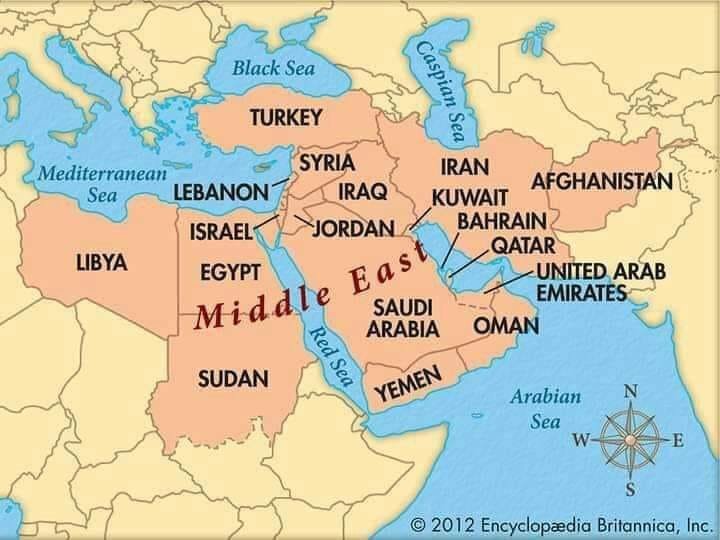
𝐂𝐨𝐧𝐜𝐥𝐮𝐬𝐢𝐨𝐧:
𝟏. 𝐈𝐬𝐚𝐢𝐚𝐡 𝐠𝐚𝐯𝐞 𝐚 “𝐬𝐢𝐠𝐧” 𝐭𝐨 𝐀𝐡𝐚𝐳 𝐚𝐧𝐝 𝐢𝐭 𝐰𝐚𝐬 𝐟𝐮𝐥𝐟𝐢𝐥𝐥𝐞𝐝 𝐝𝐮𝐫𝐢𝐧𝐠 𝐭𝐡𝐞 𝐥𝐢𝐟𝐞𝐭𝐢𝐦𝐞 𝐨𝐟 𝐀𝐡𝐚𝐳 𝐰𝐡𝐢𝐥𝐞 𝐡𝐞 𝐰𝐚𝐬 𝐬𝐭𝐢𝐥𝐥 𝐚𝐥𝐢𝐯𝐞 𝐧𝐨𝐭 𝟕𝟎𝟎 𝐲𝐞𝐚𝐫𝐬 𝐚𝐟𝐭𝐞𝐫 𝐚𝐬 𝐈 𝐬𝐭𝐚𝐭𝐞𝐝 𝐞𝐚𝐫𝐥𝐢𝐞𝐫.
𝟐. 𝐓𝐡𝐞 𝐰𝐨𝐫𝐝 “𝐯𝐢𝐫𝐠𝐢𝐧” 𝐰𝐡𝐢𝐜𝐡 𝐢𝐬 𝐮𝐬𝐞𝐝 𝐛𝐲 𝐦𝐨𝐬𝐭 𝐡𝐚𝐫𝐝-𝐡𝐞𝐚𝐝𝐞𝐝 𝐂𝐡𝐫𝐢𝐬𝐭𝐢𝐚𝐧 𝐓𝐫𝐢𝐧𝐢𝐭𝐚𝐫𝐢𝐚𝐧𝐬 𝐡𝐚𝐬 𝐚𝐥𝐬𝐨 𝐛𝐞𝐞𝐧 𝐚𝐧𝐬𝐰𝐞𝐫𝐞𝐝 𝐢𝐧 𝐝𝐞𝐭𝐚𝐢𝐥. 𝐀𝐜𝐜𝐨𝐫𝐝𝐢𝐧𝐠 𝐭𝐨 𝐚𝐥𝐥 𝐭𝐡𝐞𝐦 (𝐭𝐡𝐞 𝐒𝐜𝐡𝐨𝐥𝐚𝐫𝐬 𝐈 𝐪𝐮𝐨𝐭𝐞𝐝), 𝐭𝐡𝐞𝐲 𝐮𝐧𝐚𝐧𝐢𝐦𝐨𝐮𝐬𝐥𝐲 𝐚𝐠𝐫𝐞𝐞𝐝 “𝐀𝐥𝐦𝐚𝐡” 𝐝𝐨𝐞𝐬 𝐧𝐨𝐭 𝐦𝐞𝐚𝐧 “𝐯𝐢𝐫𝐠𝐢𝐧.” 𝐓𝐡𝐞 𝐰𝐨𝐫𝐝 𝐟𝐨𝐫 “𝐯𝐢𝐫𝐠𝐢𝐧” 𝐢𝐧 𝐇𝐞𝐛𝐫𝐞𝐰 𝐢𝐬 “𝐁𝐞𝐭𝐡𝐮𝐥𝐚𝐡” 𝐧𝐨𝐭 “𝐀𝐥𝐦𝐚𝐡.” 𝐓𝐡𝐞𝐲 𝐚𝐥𝐥 𝐪𝐮𝐢𝐭𝐞 𝐜𝐥𝐞𝐚𝐫𝐥𝐲 𝐬𝐭𝐚𝐭𝐞𝐝 𝐭𝐡𝐚𝐭 𝐭𝐡𝐞 𝐇𝐞𝐛𝐫𝐞𝐰 𝐰𝐨𝐫𝐝 “𝐀𝐥𝐦𝐚𝐡” 𝐦𝐞𝐚𝐧𝐬 “𝐲𝐨𝐮𝐧𝐠 𝐦𝐚𝐫𝐫𝐢𝐚𝐠𝐞𝐚𝐛𝐥𝐞 𝐰𝐨𝐦𝐚𝐧” 𝐧𝐨𝐭 “𝐯𝐢𝐫𝐠𝐢𝐧.”
𝟑. 𝐓𝐡𝐞 𝐚𝐦𝐨𝐮𝐧𝐭 𝐨𝐟 𝐪𝐮𝐨𝐭𝐞𝐬 𝐈 𝐮𝐬𝐞𝐝 𝐟𝐨𝐫 𝐈𝐬𝐚𝐢𝐚𝐡 𝟕:𝟏𝟑-𝟏𝟔 𝐛𝐲 𝐭𝐡𝐞 𝐒𝐜𝐡𝐨𝐥𝐚𝐫𝐬, 𝐚𝐠𝐚𝐢𝐧 𝐚𝐠𝐫𝐞𝐞𝐝 𝐭𝐡𝐚𝐭 𝐭𝐡𝐢𝐬 𝐜𝐨𝐮𝐥𝐝 𝐧𝐨𝐭 𝐛𝐞 𝐚 𝐏𝐫𝐨𝐩𝐡𝐞𝐜𝐲 𝐨𝐟 𝐉𝐞𝐬𝐮𝐬, 𝐢𝐧𝐬𝐭𝐞𝐚𝐝 𝐢𝐭 𝐰𝐚𝐬 𝐚 𝐏𝐫𝐨𝐩𝐡𝐞𝐜𝐲 𝐭𝐡𝐚𝐭 𝐰𝐚𝐬 𝐟𝐮𝐥𝐟𝐢𝐥𝐥𝐞𝐝 𝐚𝐭 𝐭𝐡𝐞 𝐭𝐢𝐦𝐞 𝐀𝐡𝐚𝐳.
𝟒. 𝐈 𝐰𝐞𝐧𝐭 𝐨𝐯𝐞𝐫 𝐈𝐬𝐚𝐢𝐚𝐡 𝟕:𝟏𝟓-𝟏𝟔 𝐭𝐡𝐚𝐭 𝐢𝐭 𝐜𝐨𝐮𝐥𝐝 𝐧𝐨𝐭 𝐛𝐞 𝐚 𝐏𝐫𝐨𝐩𝐡𝐞𝐜𝐲 𝐨𝐟 𝐉𝐞𝐬𝐮𝐬, 𝐬𝐢𝐧𝐜𝐞 𝐯𝐞𝐫𝐬𝐞𝐬 𝟏𝟓-𝟏𝟔 𝐦𝐞𝐧𝐭𝐢𝐨𝐧 𝐭𝐡𝐚𝐭 “𝐈𝐦𝐦𝐚𝐧𝐮𝐞𝐥” (𝐆𝐨𝐝 𝐚𝐜𝐜𝐨𝐫𝐝𝐢𝐧𝐠 𝐭𝐨 𝐂𝐡𝐫𝐢𝐬𝐭𝐢𝐚𝐧𝐬) 𝐡𝐚𝐬 𝐭𝐨 𝐥𝐞𝐚𝐫𝐧 𝐰𝐡𝐚𝐭 𝐢𝐬 𝐠𝐨𝐨𝐝 𝐚𝐧𝐝 𝐛𝐚𝐝 𝐚𝐧𝐝 𝐥𝐞𝐚𝐫𝐧 𝐭𝐨 𝐫𝐞𝐟𝐮𝐬𝐞 𝐞𝐯𝐢𝐥. 𝐃𝐨𝐞𝐬𝐧’𝐭 𝐆𝐨𝐝 𝐚𝐥𝐫𝐞𝐚𝐝𝐲 𝐤𝐧𝐨𝐰 𝐭𝐡𝐞𝐬𝐞 𝐭𝐡𝐢𝐧𝐠𝐬? 𝐈 𝐰𝐢𝐥𝐥 𝐥𝐞𝐭 𝐲𝐨𝐮 𝐝𝐞𝐜𝐢𝐝𝐞. 𝐈𝐧 𝐭𝐡𝐞 𝐯𝐞𝐫𝐬𝐞𝐬 𝐢𝐭 𝐢𝐬 𝐦𝐞𝐧𝐭𝐢𝐨𝐧𝐞𝐝 𝐭𝐡𝐚𝐭 𝐭𝐡𝐞𝐲 𝐰𝐢𝐥𝐥 “𝐧𝐚𝐦𝐞 𝐡𝐢𝐦 𝐈𝐦𝐦𝐚𝐧𝐮𝐞𝐥.”
𝐇𝐨𝐰 𝐜𝐨𝐦𝐞 𝐉𝐞𝐬𝐮𝐬 𝐰𝐚𝐬 𝐧𝐞𝐯𝐞𝐫 𝐜𝐚𝐥𝐥𝐞𝐝 𝐛𝐲 𝐭𝐡𝐞 𝐧𝐚𝐦𝐞 “𝐈𝐦𝐦𝐚𝐧𝐮𝐞𝐥” 𝐢𝐧 𝐡𝐢𝐬 𝐥𝐢𝐟𝐞𝐭𝐢𝐦𝐞? 𝐖𝐡𝐞𝐫𝐞 𝐝𝐢𝐝 𝐡𝐢𝐬 𝐦𝐨𝐭𝐡𝐞𝐫 𝐨𝐫 𝐬𝐭𝐞𝐩𝐟𝐚𝐭𝐡𝐞𝐫, 𝐝𝐢𝐬𝐜𝐢𝐩𝐥𝐞𝐬 𝐰𝐡𝐨 𝐤𝐧𝐞𝐰 𝐡𝐢𝐦 𝐛𝐞𝐬𝐭, 𝐞𝐯𝐞𝐫 𝐜𝐚𝐥𝐥 𝐡𝐢𝐦 𝐛𝐲 𝐭𝐡𝐞 𝐧𝐚𝐦𝐞 “𝐈𝐦𝐦𝐚𝐧𝐮𝐞𝐥?” 𝐀𝐠𝐚𝐢𝐧 𝐢𝐭 𝐢𝐬 𝐞𝐯𝐢𝐝𝐞𝐧𝐭 𝐭𝐡𝐚𝐭 𝐭𝐡𝐢𝐬 𝐜𝐨𝐮𝐥𝐝 𝐧𝐨𝐭 𝐛𝐞 𝐚 𝐏𝐫𝐨𝐩𝐡𝐞𝐜𝐲 𝐨𝐟 𝐉𝐞𝐬𝐮𝐬.
𝐓𝐡𝐢𝐬 𝐢𝐬 𝐈𝐬𝐥𝐚𝐦, 𝐎𝐫𝐢𝐠𝐢𝐧𝐚𝐭𝐢𝐧𝐠 𝐟𝐫𝐨𝐦 𝐭𝐡𝐞 𝐰𝐨𝐫𝐝 ‘𝐒𝐮𝐛𝐦𝐢𝐭
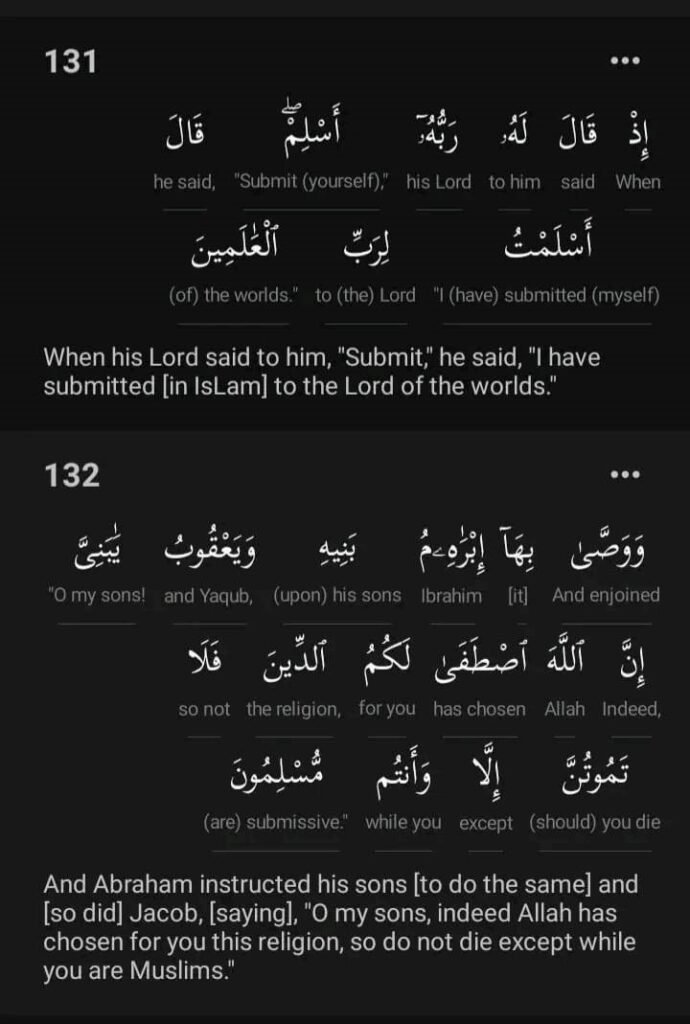
𝐀𝐥𝐥 𝐏𝐫𝐨𝐩𝐡𝐞𝐭𝐬 𝐚𝐫𝐞 𝐌𝐮𝐬𝐥𝐢𝐦𝐬
𝐈𝐬𝐥𝐚𝐦 𝐭𝐞𝐚𝐜𝐡𝐞𝐬 𝐭𝐡𝐚𝐭 𝐚𝐥𝐥 𝐩𝐫𝐨𝐩𝐡𝐞𝐭𝐬 𝐟𝐫𝐨𝐦 𝐀𝐝𝐚𝐦 𝐭𝐨 𝐌𝐮𝐡𝐚𝐦𝐦𝐚𝐝 𝐰𝐞𝐫𝐞 𝐌𝐮𝐬𝐥𝐢𝐦𝐬, 𝐰𝐡𝐢𝐜𝐡 𝐦𝐞𝐚𝐧𝐬 𝐭𝐡𝐞𝐲 𝐡𝐚𝐯𝐞 𝐩𝐫𝐞𝐚𝐜𝐡𝐞𝐝 𝐭𝐡𝐞 𝐬𝐚𝐦𝐞 𝐜𝐨𝐫𝐞 𝐦𝐞𝐬𝐬𝐚𝐠𝐞 𝐨𝐟 𝐈𝐬𝐥𝐚𝐦. 𝐓𝐡𝐢𝐬 𝐢𝐬 𝐛𝐞𝐜𝐚𝐮𝐬𝐞 𝐈𝐬𝐥𝐚𝐦 𝐢𝐬 𝐭𝐡𝐞 𝐬𝐮𝐛𝐦𝐢𝐬𝐬𝐢𝐨𝐧 𝐭𝐨 𝐭𝐡𝐞 𝐰𝐢𝐥𝐥 𝐨𝐟 𝐀𝐥𝐥𝐚𝐡, 𝐚𝐧𝐝 𝐚𝐥𝐥 𝐩𝐫𝐨𝐩𝐡𝐞𝐭𝐬 𝐰𝐞𝐫𝐞 𝐨𝐛𝐞𝐝𝐢𝐞𝐧𝐭 𝐭𝐨 𝐀𝐥𝐥𝐚𝐡. 𝐓𝐡𝐞𝐲 𝐚𝐥𝐥 𝐭𝐚𝐮𝐠𝐡𝐭 𝐭𝐡𝐞 𝐬𝐚𝐦𝐞 𝐦𝐞𝐬𝐬𝐚𝐠𝐞 𝐨𝐟 𝐓𝐚𝐰𝐡𝐞𝐞𝐝=𝐌𝐨𝐧𝐨𝐭𝐡𝐞𝐢𝐬𝐦 𝐨𝐫 𝐛𝐞𝐥𝐢𝐞𝐟 𝐢𝐧 𝐨𝐧𝐞 𝐆𝐨𝐝 𝐰𝐡𝐨 𝐢𝐬 𝐎𝐧𝐞 𝐢𝐧 𝐡𝐢𝐬 𝐄𝐬𝐬𝐞𝐧𝐜𝐞 𝐚𝐧𝐝 𝐧𝐨𝐭 𝐓𝐫𝐮𝐢𝐧𝐞.
𝐓𝐡𝐞 𝐐𝐮𝐫𝐚𝐧 𝐬𝐚𝐲𝐬:
“𝐀𝐧𝐝 𝐖𝐞 𝐡𝐚𝐯𝐞 𝐬𝐞𝐧𝐭 𝐚𝐦𝐨𝐧𝐠 𝐞𝐯𝐞𝐫𝐲 𝐧𝐚𝐭𝐢𝐨𝐧 𝐚 𝐦𝐞𝐬𝐬𝐞𝐧𝐠𝐞𝐫, [𝐬𝐚𝐲𝐢𝐧𝐠], ‘𝐖𝐨𝐫𝐬𝐡𝐢𝐩 𝐀𝐥𝐥𝐚𝐡 𝐚𝐧𝐝 𝐚𝐯𝐨𝐢𝐝 𝐓𝐚𝐠𝐡𝐮𝐭.'” (𝐐𝐮𝐫𝐚𝐧 𝟏𝟔:𝟑𝟔)
“𝐀𝐧𝐝 𝐖𝐞 𝐝𝐢𝐝 𝐧𝐨𝐭 𝐬𝐞𝐧𝐝 𝐚𝐧𝐲 𝐦𝐞𝐬𝐬𝐞𝐧𝐠𝐞𝐫 𝐛𝐞𝐟𝐨𝐫𝐞 𝐲𝐨𝐮 𝐞𝐱𝐜𝐞𝐩𝐭 𝐭𝐡𝐚𝐭 𝐖𝐞 𝐫𝐞𝐯𝐞𝐚𝐥𝐞𝐝 𝐭𝐨 𝐡𝐢𝐦, ‘𝐓𝐡𝐞𝐫𝐞 𝐢𝐬 𝐧𝐨 𝐝𝐞𝐢𝐭𝐲 𝐞𝐱𝐜𝐞𝐩𝐭 𝐌𝐞, 𝐬𝐨 𝐰𝐨𝐫𝐬𝐡𝐢𝐩 𝐌𝐞.'” (𝐐𝐮𝐫𝐚𝐧 𝟐𝟏:𝟐𝟓)
𝐓𝐡𝐞 𝐡𝐚𝐝𝐢𝐭𝐡 𝐚𝐥𝐬𝐨 𝐜𝐨𝐧𝐟𝐢𝐫𝐦𝐬 𝐭𝐡𝐢𝐬 𝐭𝐞𝐚𝐜𝐡𝐢𝐧𝐠. 𝐓𝐡𝐞 𝐏𝐫𝐨𝐩𝐡𝐞𝐭 𝐌𝐮𝐡𝐚𝐦𝐦𝐚𝐝 𝐬𝐚𝐢𝐝:
“𝐀𝐥𝐥 𝐭𝐡𝐞 𝐩𝐫𝐨𝐩𝐡𝐞𝐭𝐬 𝐚𝐫𝐞 𝐛𝐫𝐨𝐭𝐡𝐞𝐫𝐬, 𝐚𝐧𝐝 𝐭𝐡𝐞𝐢𝐫 𝐫𝐞𝐥𝐢𝐠𝐢𝐨𝐧 𝐢𝐬 𝐨𝐧𝐞.” (𝐒𝐚𝐡𝐢𝐡 𝐌𝐮𝐬𝐥𝐢𝐦)
“𝐓𝐡𝐞 𝐫𝐞𝐥𝐢𝐠𝐢𝐨𝐧 𝐨𝐟 𝐚𝐥𝐥 𝐭𝐡𝐞 𝐩𝐫𝐨𝐩𝐡𝐞𝐭𝐬 𝐢𝐬 𝐈𝐬𝐥𝐚𝐦.” (𝐒𝐮𝐧𝐚𝐧 𝐚𝐥-𝐓𝐢𝐫𝐦𝐢𝐝𝐡𝐢)
𝐒𝐨, 𝐚𝐜𝐜𝐨𝐫𝐝𝐢𝐧𝐠 𝐭𝐨 𝐈𝐬𝐥𝐚𝐦, 𝐚𝐥𝐥 𝐩𝐫𝐨𝐩𝐡𝐞𝐭𝐬 𝐰𝐞𝐫𝐞 𝐌𝐮𝐬𝐥𝐢𝐦𝐬, 𝐞𝐯𝐞𝐧 𝐭𝐡𝐨𝐮𝐠𝐡 𝐭𝐡𝐞𝐲 𝐥𝐢𝐯𝐞𝐝 𝐢𝐧 𝐝𝐢𝐟𝐟𝐞𝐫𝐞𝐧𝐭 𝐭𝐢𝐦𝐞𝐬 𝐚𝐧𝐝 𝐩𝐥𝐚𝐜𝐞𝐬 𝐚𝐧𝐝 𝐬𝐩𝐨𝐤𝐞 𝐝𝐢𝐟𝐟𝐞𝐫𝐞𝐧𝐭 𝐥𝐚𝐧𝐠𝐮𝐚𝐠𝐞𝐬. 𝐓𝐡𝐞𝐲 𝐚𝐥𝐥 𝐭𝐚𝐮𝐠𝐡𝐭 𝐭𝐡𝐞 𝐬𝐚𝐦𝐞 𝐦𝐞𝐬𝐬𝐚𝐠𝐞 𝐨𝐟 𝐓𝐚𝐰𝐡𝐞𝐞𝐝, 𝐚𝐧𝐝 𝐭𝐡𝐞𝐲 𝐚𝐥𝐥 𝐜𝐚𝐥𝐥𝐞𝐝 𝐩𝐞𝐨𝐩𝐥𝐞 𝐭𝐨 𝐰𝐨𝐫𝐬𝐡𝐢𝐩 𝐆𝐨𝐝 𝐚𝐥𝐨𝐧𝐞.
𝐇𝐞𝐫𝐞 𝐚𝐫𝐞 𝐬𝐨𝐦𝐞 𝐬𝐩𝐞𝐜𝐢𝐟𝐢𝐜 𝐞𝐱𝐚𝐦𝐩𝐥𝐞𝐬 𝐨𝐟 𝐩𝐫𝐨𝐩𝐡𝐞𝐭𝐬 𝐰𝐡𝐨 𝐚𝐫𝐞 𝐦𝐞𝐧𝐭𝐢𝐨𝐧𝐞𝐝 𝐢𝐧 𝐭𝐡𝐞 𝐐𝐮𝐫𝐚𝐧 𝐚𝐬 𝐛𝐞𝐢𝐧𝐠 𝐌𝐮𝐬𝐥𝐢𝐦𝐬:
𝐀𝐝𝐚𝐦:
𝐓𝐡𝐞 𝐐𝐮𝐫𝐚𝐧 𝐬𝐚𝐲𝐬 𝐭𝐡𝐚𝐭 𝐀𝐝𝐚𝐦 𝐰𝐚𝐬 𝐭𝐡𝐞 𝐟𝐢𝐫𝐬𝐭 𝐌𝐮𝐬𝐥𝐢𝐦. 𝐇𝐞 𝐰𝐚𝐬 𝐜𝐫𝐞𝐚𝐭𝐞𝐝 𝐛𝐲 𝐆𝐨𝐝 𝐚𝐧𝐝 𝐭𝐚𝐮𝐠𝐡𝐭 𝐭𝐡𝐞 𝐭𝐫𝐮𝐭𝐡 𝐚𝐛𝐨𝐮𝐭 𝐆𝐨𝐝. (𝐐𝐮𝐫𝐚𝐧 𝟐:𝟑𝟎-𝟑𝟖)
𝐍𝐨𝐚𝐡:
𝐓𝐡𝐞 𝐐𝐮𝐫𝐚𝐧 𝐬𝐚𝐲𝐬 𝐭𝐡𝐚𝐭 𝐍𝐨𝐚𝐡 𝐰𝐚𝐬 𝐚 𝐌𝐮𝐬𝐥𝐢𝐦 𝐰𝐡𝐨 𝐩𝐫𝐞𝐚𝐜𝐡𝐞𝐝 𝐭𝐨 𝐡𝐢𝐬 𝐩𝐞𝐨𝐩𝐥𝐞 𝐚𝐛𝐨𝐮𝐭 𝐭𝐡𝐞 𝐨𝐧𝐞𝐧𝐞𝐬𝐬 𝐨𝐟 𝐆𝐨𝐝. 𝐇𝐞 𝐰𝐚𝐬 𝐞𝐯𝐞𝐧𝐭𝐮𝐚𝐥𝐥𝐲 𝐬𝐚𝐯𝐞𝐝 𝐟𝐫𝐨𝐦 𝐭𝐡𝐞 𝐟𝐥𝐨𝐨𝐝 𝐚𝐥𝐨𝐧𝐠 𝐰𝐢𝐭𝐡 𝐡𝐢𝐬 𝐟𝐨𝐥𝐥𝐨𝐰𝐞𝐫𝐬. (𝐐𝐮𝐫𝐚𝐧 𝟕:𝟓𝟗-𝟔𝟒)
𝐀𝐛𝐫𝐚𝐡𝐚𝐦:
𝐓𝐡𝐞 𝐐𝐮𝐫𝐚𝐧 𝐬𝐚𝐲𝐬 𝐭𝐡𝐚𝐭 𝐀𝐛𝐫𝐚𝐡𝐚𝐦 𝐰𝐚𝐬 𝐚 𝐌𝐮𝐬𝐥𝐢𝐦 𝐰𝐡𝐨 𝐰𝐚𝐬 𝐰𝐢𝐥𝐥𝐢𝐧𝐠 𝐭𝐨 𝐬𝐚𝐜𝐫𝐢𝐟𝐢𝐜𝐞 𝐡𝐢𝐬 𝐬𝐨𝐧 𝐈𝐬𝐦𝐚𝐢𝐥 𝐢𝐧 𝐨𝐛𝐞𝐝𝐢𝐞𝐧𝐜𝐞 𝐭𝐨 𝐆𝐨𝐝. 𝐇𝐞 𝐢𝐬 𝐚𝐥𝐬𝐨 𝐜𝐨𝐧𝐬𝐢𝐝𝐞𝐫𝐞𝐝 𝐭𝐡𝐞 𝐟𝐚𝐭𝐡𝐞𝐫 𝐨𝐟 𝐭𝐡𝐞 𝐭𝐡𝐫𝐞𝐞 𝐀𝐛𝐫𝐚𝐡𝐚𝐦𝐢𝐜 𝐫𝐞𝐥𝐢𝐠𝐢𝐨𝐧𝐬: 𝐉𝐮𝐝𝐚𝐢𝐬𝐦, 𝐂𝐡𝐫𝐢𝐬𝐭𝐢𝐚𝐧𝐢𝐭𝐲, 𝐚𝐧𝐝 𝐈𝐬𝐥𝐚𝐦. (𝐐𝐮𝐫𝐚𝐧 𝟑:𝟔𝟕-𝟔𝟗)
𝐌𝐨𝐬𝐞𝐬:
𝐓𝐡𝐞 𝐐𝐮𝐫𝐚𝐧 𝐬𝐚𝐲𝐬 𝐭𝐡𝐚𝐭 𝐌𝐨𝐬𝐞𝐬 𝐰𝐚𝐬 𝐚 𝐌𝐮𝐬𝐥𝐢𝐦 𝐰𝐡𝐨 𝐰𝐚𝐬 𝐜𝐡𝐨𝐬𝐞𝐧 𝐛𝐲 𝐆𝐨𝐝 𝐭𝐨 𝐥𝐞𝐚𝐝 𝐭𝐡𝐞 𝐈𝐬𝐫𝐚𝐞𝐥𝐢𝐭𝐞𝐬 𝐨𝐮𝐭 𝐨𝐟 𝐬𝐥𝐚𝐯𝐞𝐫𝐲 𝐢𝐧 𝐄𝐠𝐲𝐩𝐭. 𝐇𝐞 𝐢𝐬 𝐚𝐥𝐬𝐨 𝐤𝐧𝐨𝐰𝐧 𝐟𝐨𝐫 𝐫𝐞𝐜𝐞𝐢𝐯𝐢𝐧𝐠 𝐭𝐡𝐞 𝐓𝐞𝐧 𝐂𝐨𝐦𝐦𝐚𝐧𝐝𝐦𝐞𝐧𝐭𝐬 𝐟𝐫𝐨𝐦 𝐆𝐨𝐝. (𝐐𝐮𝐫𝐚𝐧 𝟐:𝟒𝟗-𝟓𝟏)
𝐉𝐞𝐬𝐮𝐬:
𝐓𝐡𝐞 𝐐𝐮𝐫𝐚𝐧 𝐬𝐚𝐲𝐬 𝐭𝐡𝐚𝐭 𝐉𝐞𝐬𝐮𝐬 𝐰𝐚𝐬 𝐚 𝐌𝐮𝐬𝐥𝐢𝐦 𝐰𝐡𝐨 𝐰𝐚𝐬 𝐬𝐞𝐧𝐭 𝐛𝐲 𝐆𝐨𝐝 𝐭𝐨 𝐠𝐮𝐢𝐝𝐞 𝐭𝐡𝐞 𝐩𝐞𝐨𝐩𝐥𝐞. 𝐇𝐞 𝐢𝐬 𝐚𝐥𝐬𝐨 𝐜𝐨𝐧𝐬𝐢𝐝𝐞𝐫𝐞𝐝 𝐭𝐡𝐞 𝐌𝐞𝐬𝐬𝐢𝐚𝐡 𝐚𝐧𝐝 𝐭𝐡𝐞 𝐬𝐨𝐧 𝐨𝐟 𝐌𝐚𝐫𝐲. (𝐐𝐮𝐫𝐚𝐧 𝟑:𝟒𝟓-𝟓𝟏)
𝐓𝐡𝐞𝐬𝐞 𝐚𝐫𝐞 𝐣𝐮𝐬𝐭 𝐚 𝐟𝐞𝐰 𝐞𝐱𝐚𝐦𝐩𝐥𝐞𝐬 𝐨𝐟 𝐩𝐫𝐨𝐩𝐡𝐞𝐭𝐬 𝐰𝐡𝐨 𝐚𝐫𝐞 𝐦𝐞𝐧𝐭𝐢𝐨𝐧𝐞𝐝 𝐢𝐧 𝐭𝐡𝐞 𝐐𝐮𝐫𝐚𝐧 𝐚𝐬 𝐛𝐞𝐢𝐧𝐠 𝐌𝐮𝐬𝐥𝐢𝐦𝐬. 𝐓𝐡𝐞 𝐐𝐮𝐫𝐚𝐧 𝐭𝐞𝐚𝐜𝐡𝐞𝐬 𝐭𝐡𝐚𝐭 𝐚𝐥𝐥 𝐩𝐫𝐨𝐩𝐡𝐞𝐭𝐬 𝐰𝐞𝐫𝐞 𝐌𝐮𝐬𝐥𝐢𝐦𝐬, 𝐚𝐧𝐝 𝐭𝐡𝐞𝐲 𝐚𝐥𝐥 𝐭𝐚𝐮𝐠𝐡𝐭 𝐭𝐡𝐞 𝐬𝐚𝐦𝐞 𝐦𝐞𝐬𝐬𝐚𝐠𝐞 𝐨𝐟 𝐓𝐚𝐰𝐡𝐞𝐞𝐝=𝐌𝐨𝐧𝐨𝐭𝐡𝐞𝐢𝐬𝐦.
𝐀𝐥𝐥𝐚𝐡 𝐊𝐧𝐨𝐰𝐬 𝐁𝐞𝐬𝐭.
𝐑𝐞𝐟𝐞𝐫𝐞𝐧𝐜𝐞𝐬:
The Prophets from the Perspective of the Corrupted Torah
The Complex Legacy of Israel: Unpacking History, Identity, and Ownership
Biblical Evidence Jesus Is a Prophet
A Comparison of Prophethood in the Qur’an and Bible
Jesus (PBUH) did not die according to Hadith
Did Jesus really forgive sins? Or is this another trinity lie?
Isaiah 7:14, Immanuel: Prophecy of Jesus?
Unfulfilled Christian religious predictions
The folly things of God and Yahweh attributes described by Blasphemous Bible.
How and why Prophet Jesus= Isa was Muslim?
Bible: Yahweh Best of Deceivers?
I am the Lord God Dionysus : Parallels between Yahweh and Dionysus
Allah or YAHWEH is the deceiver!?
Allah as the Best of Deceivers? Between The Noble Quran and the Bible
Yahweh is Found all over the old testament BUT not once in the new testament, Why?
How the Jews Invented Yahweh, and Made Him Great
Christian Scholars refuting the status of the NT as an inspired scripture
Does Psalm 2:7 refer to Jesus or King David?
Let us create” in the book of Genesis: (Does “us” mean GOD and Jesus?)